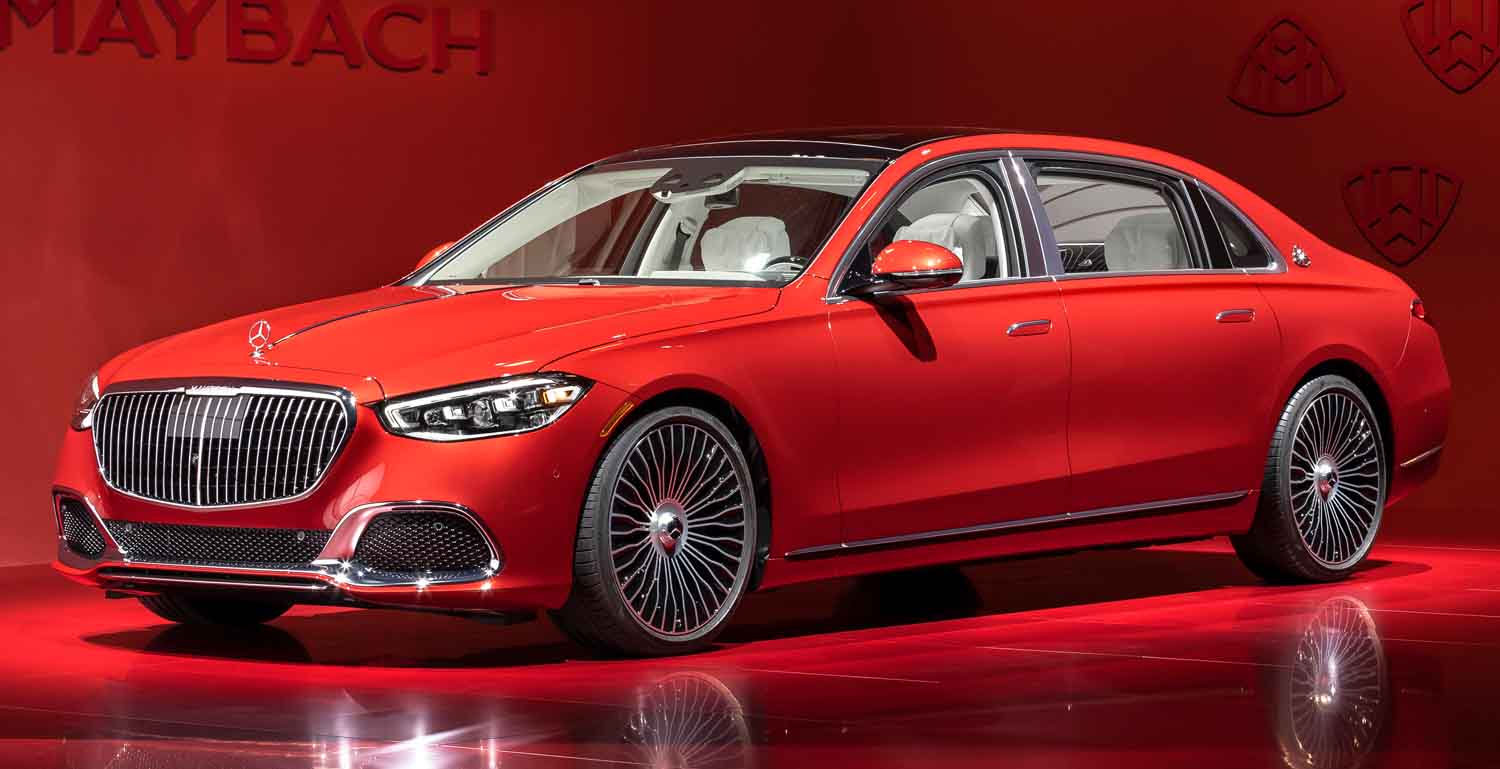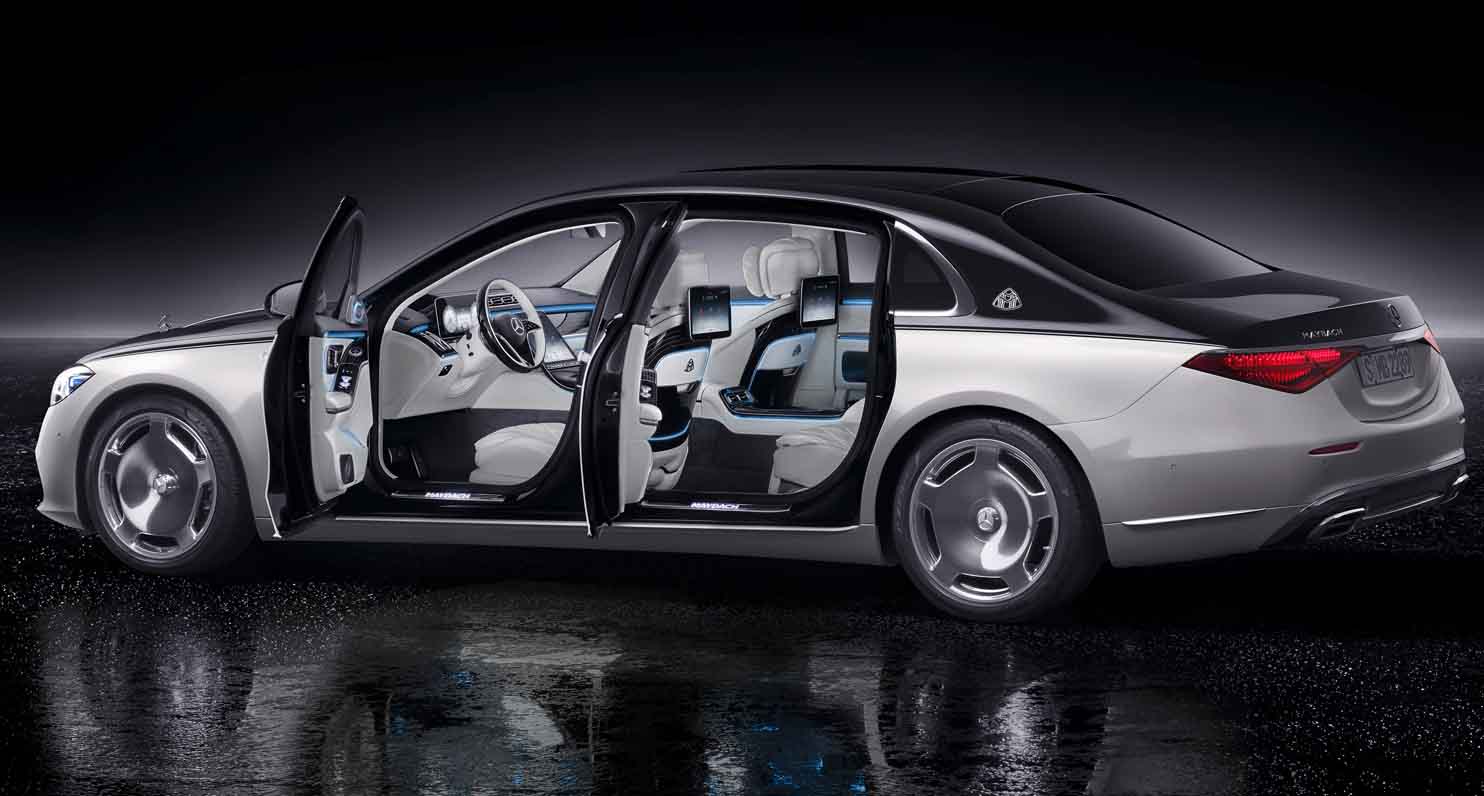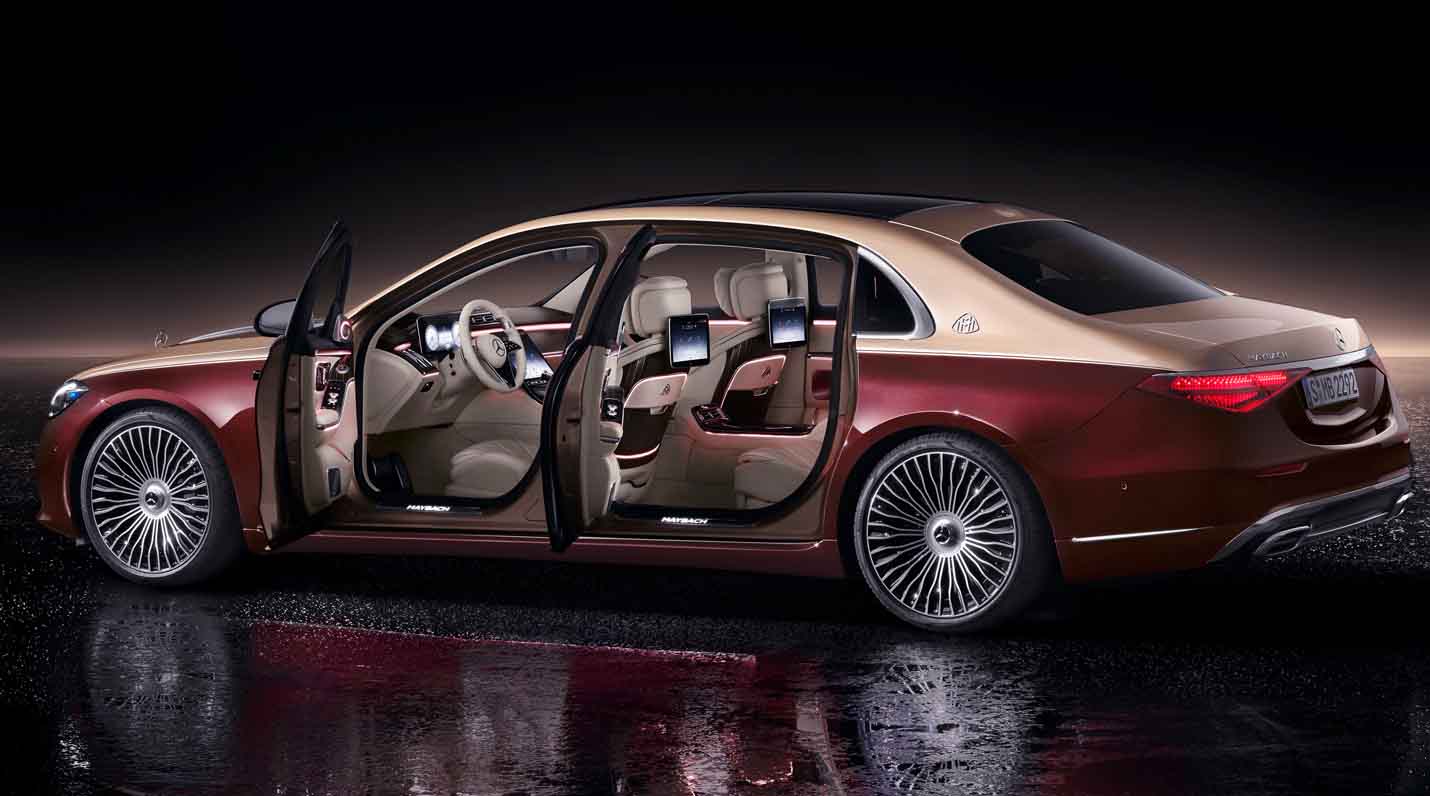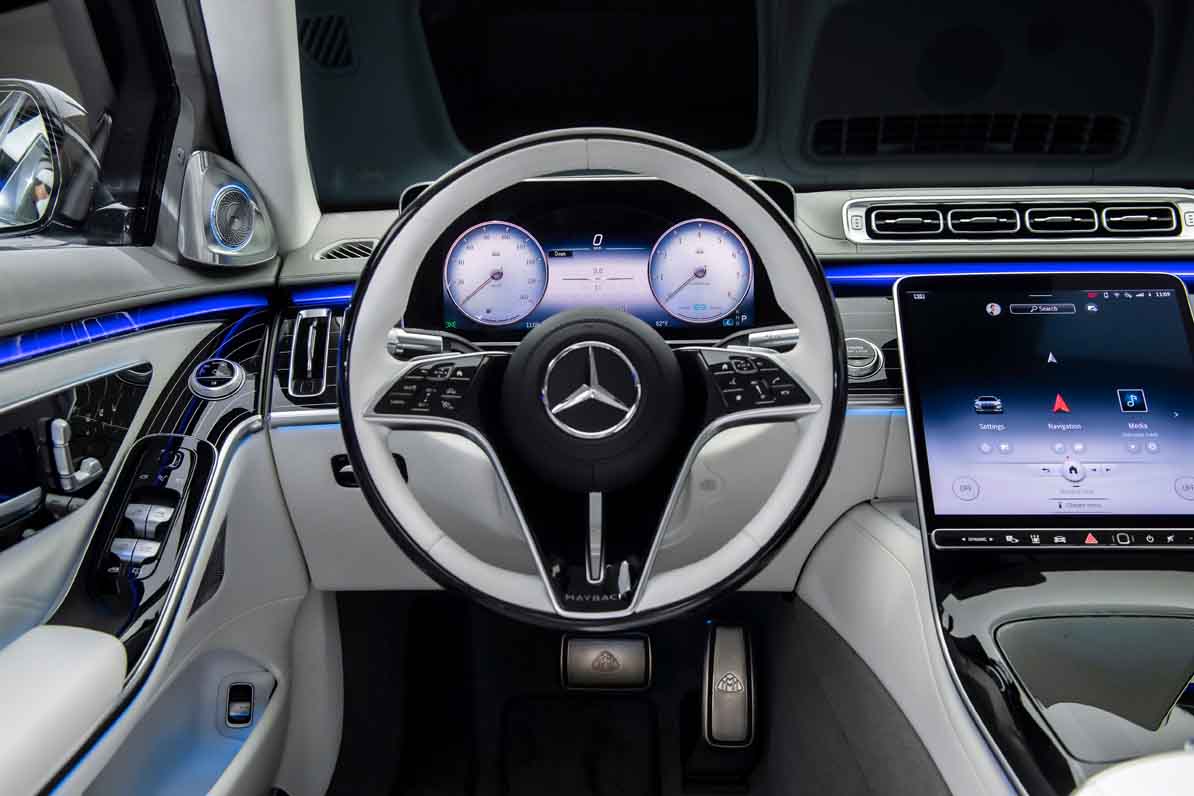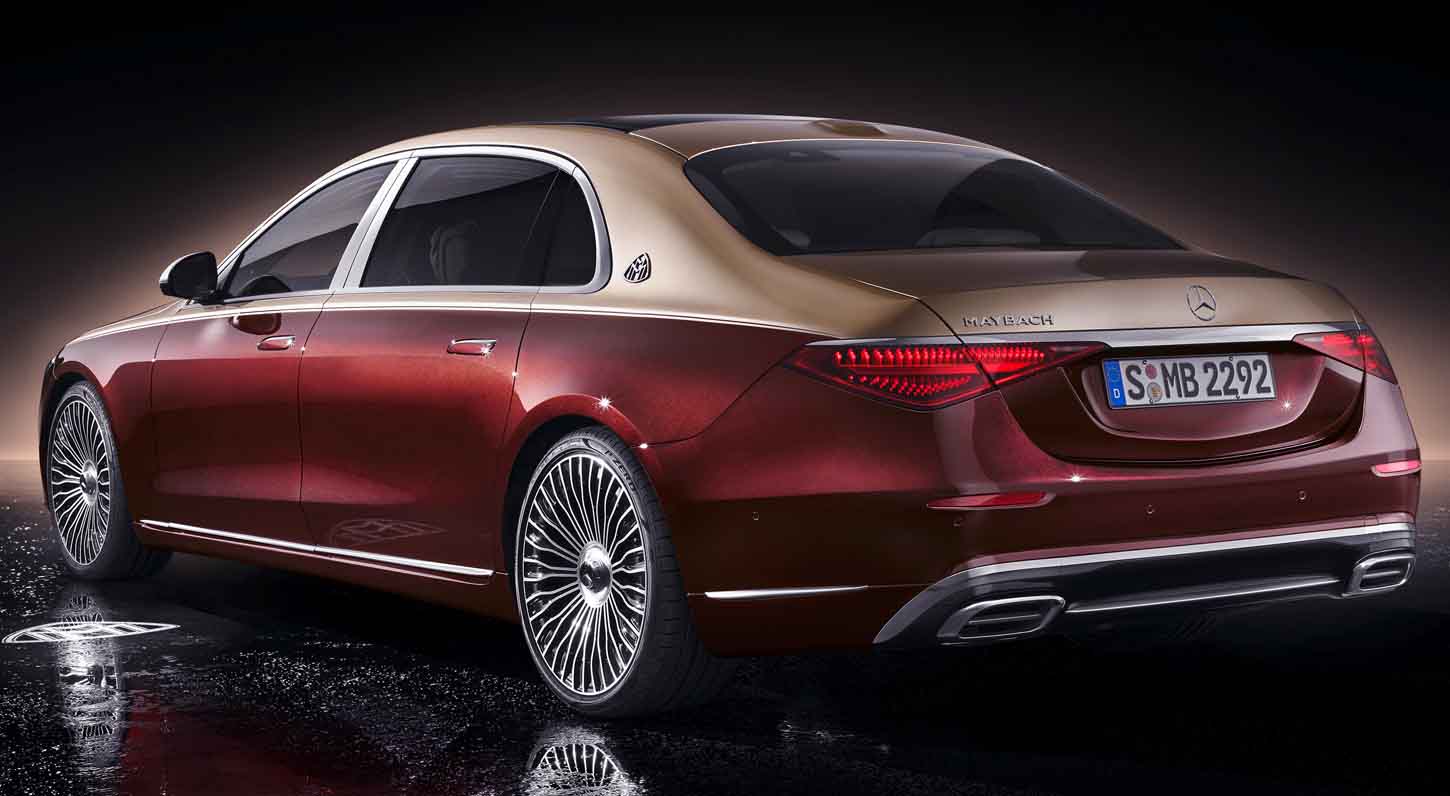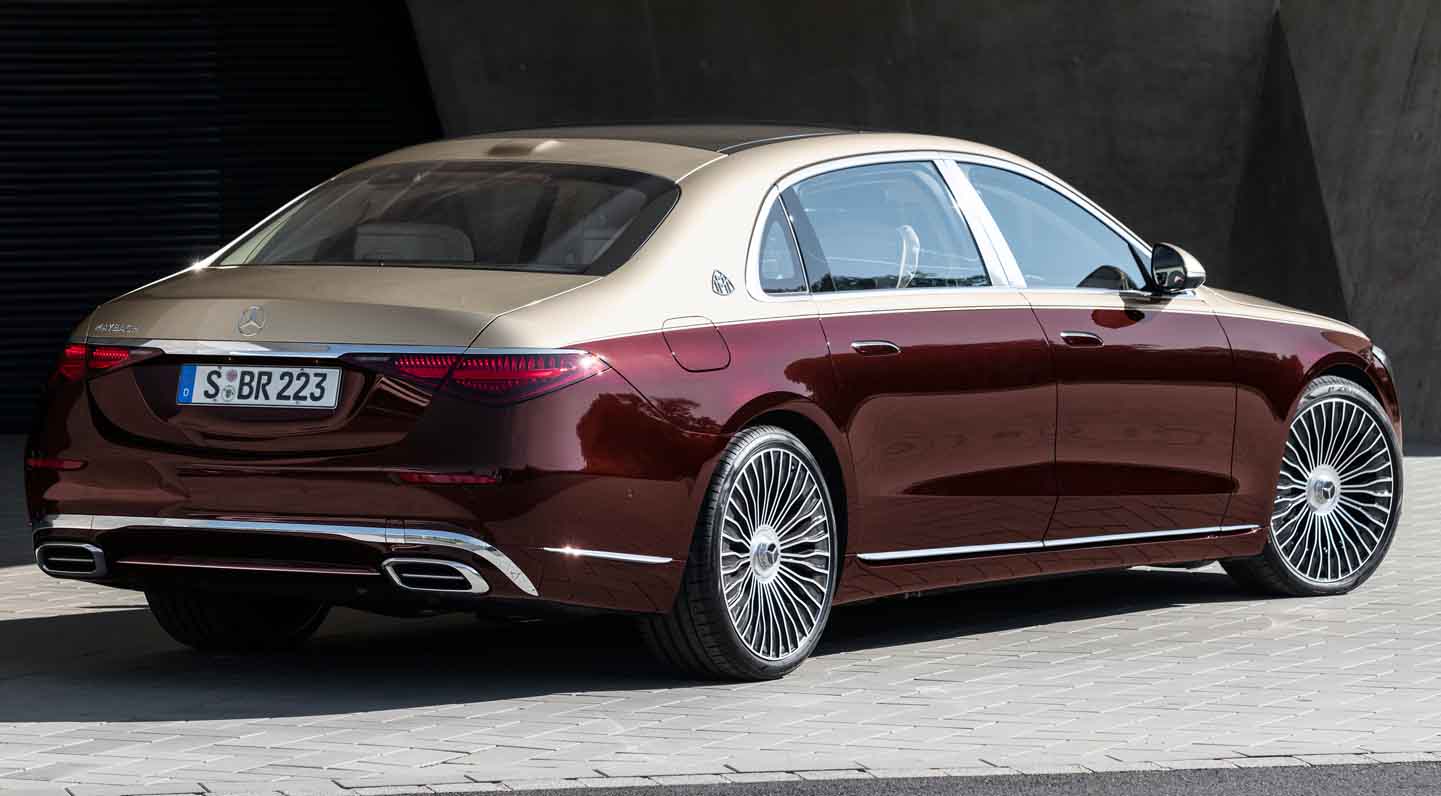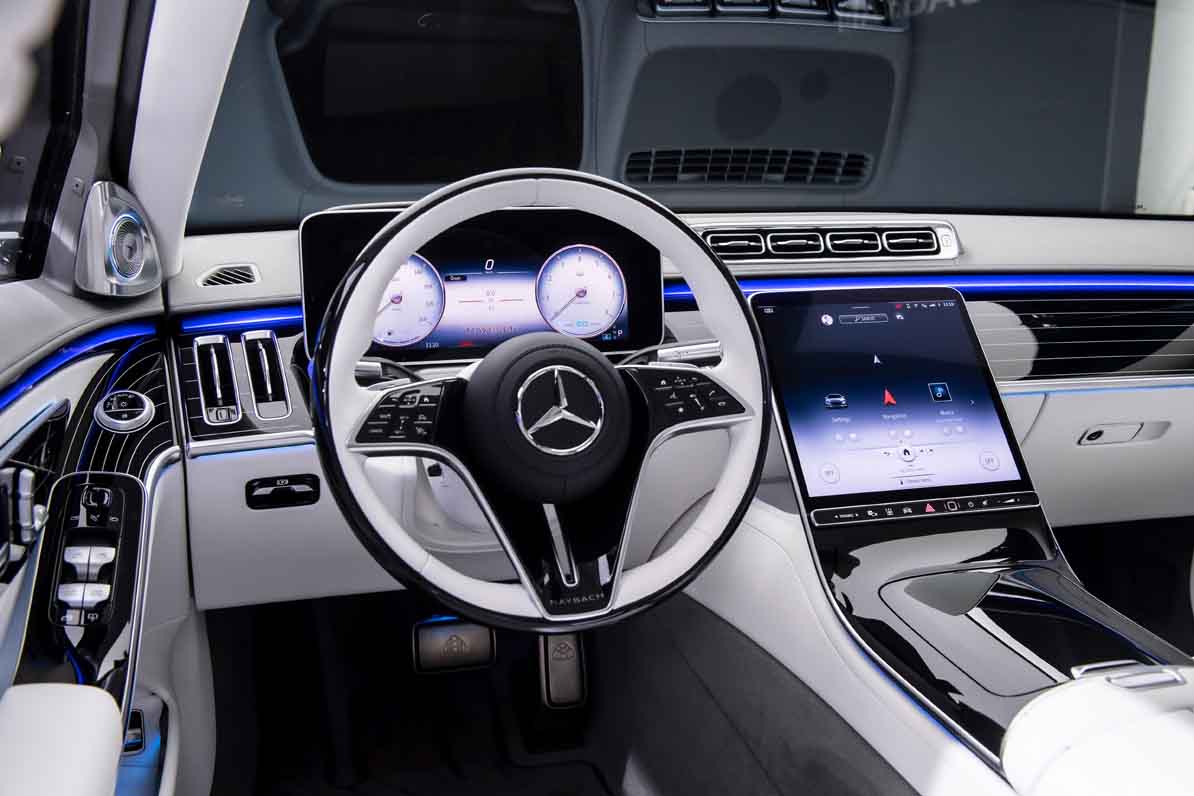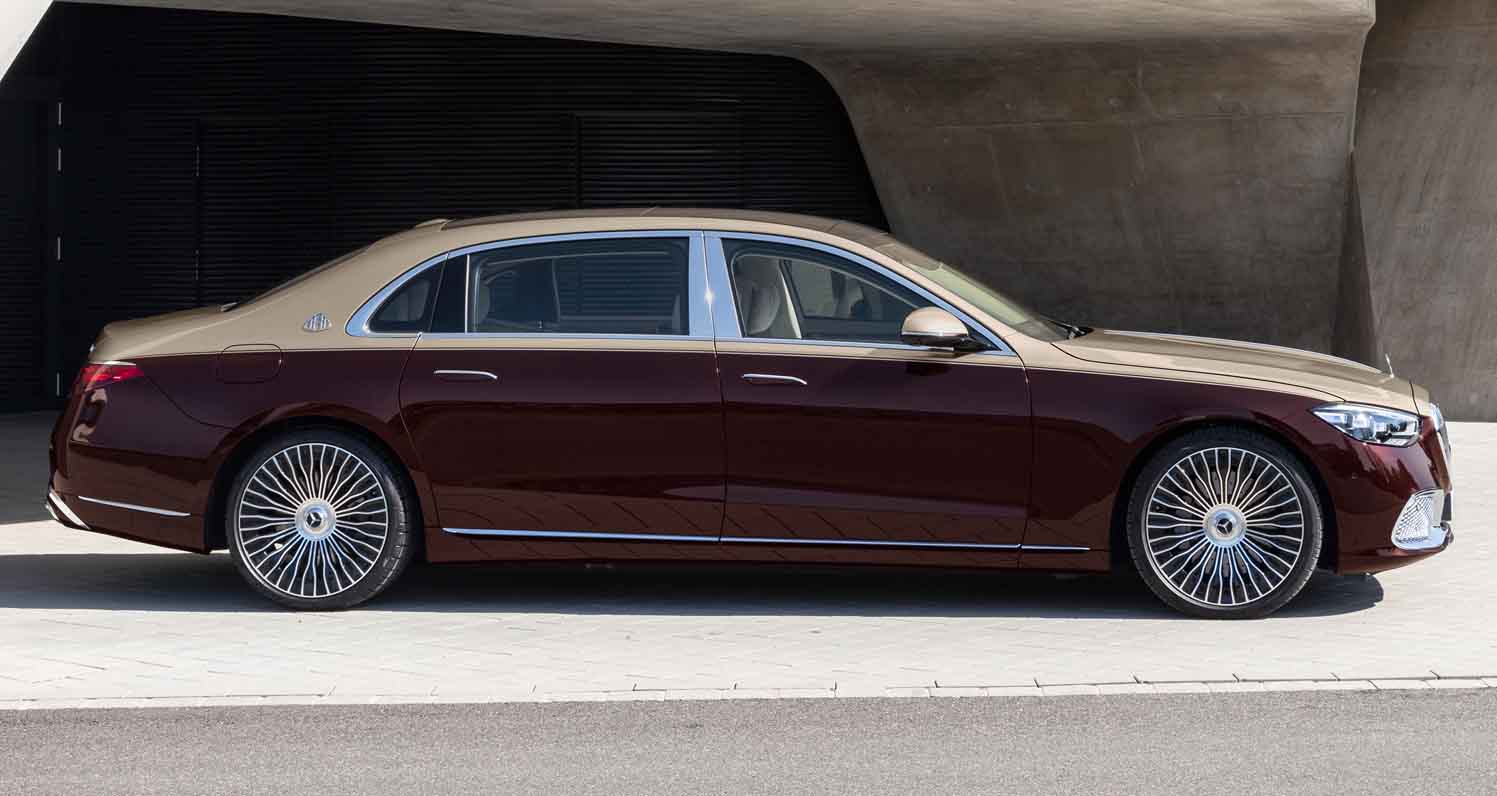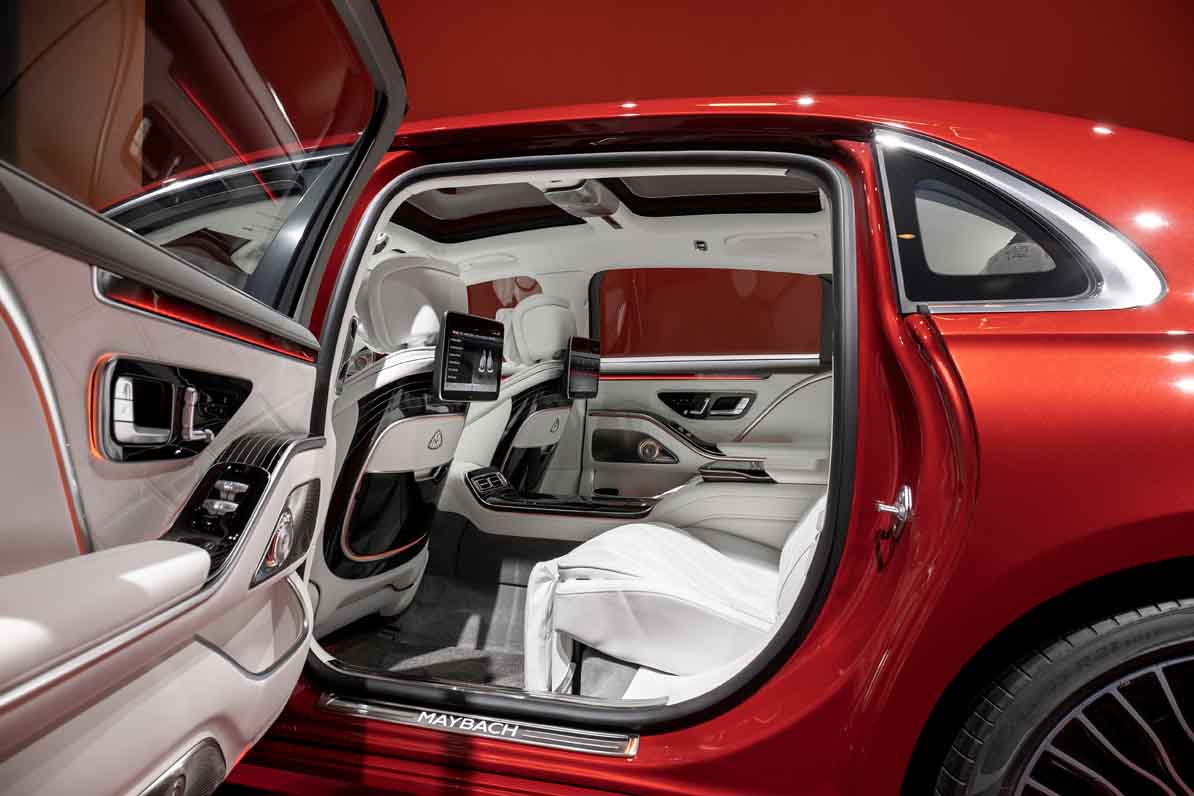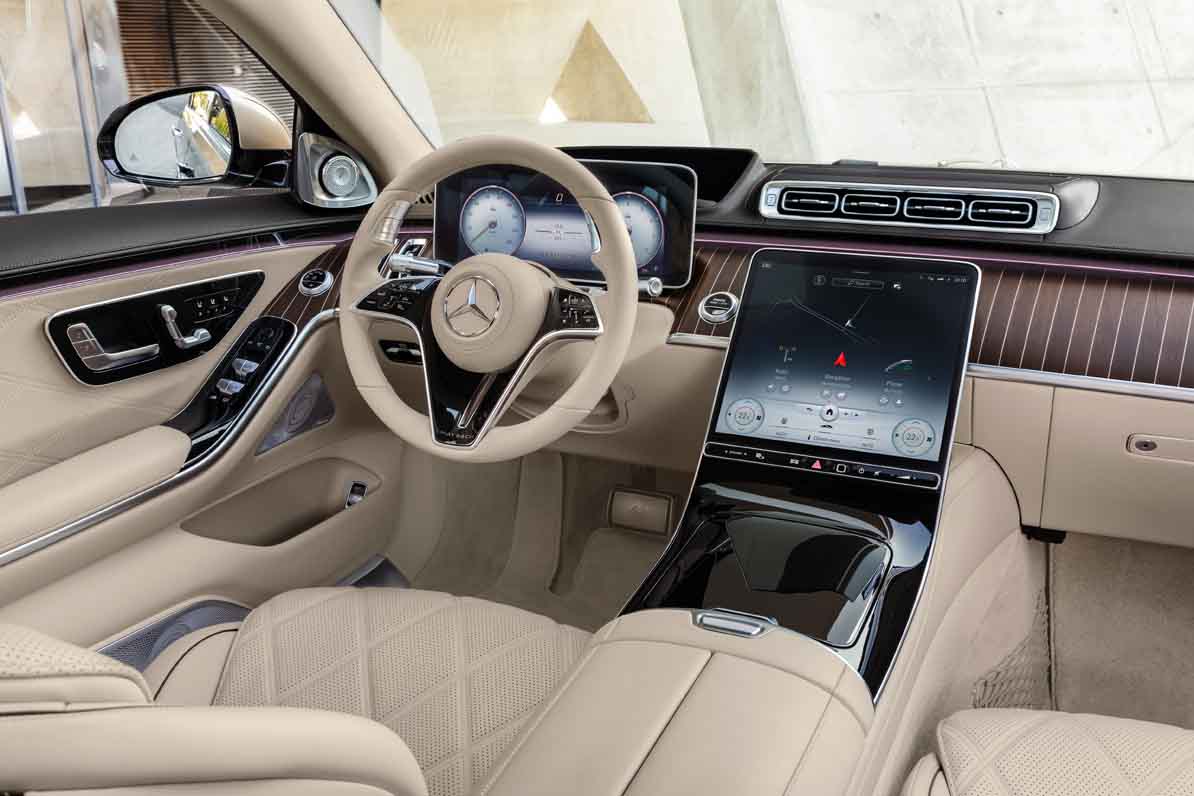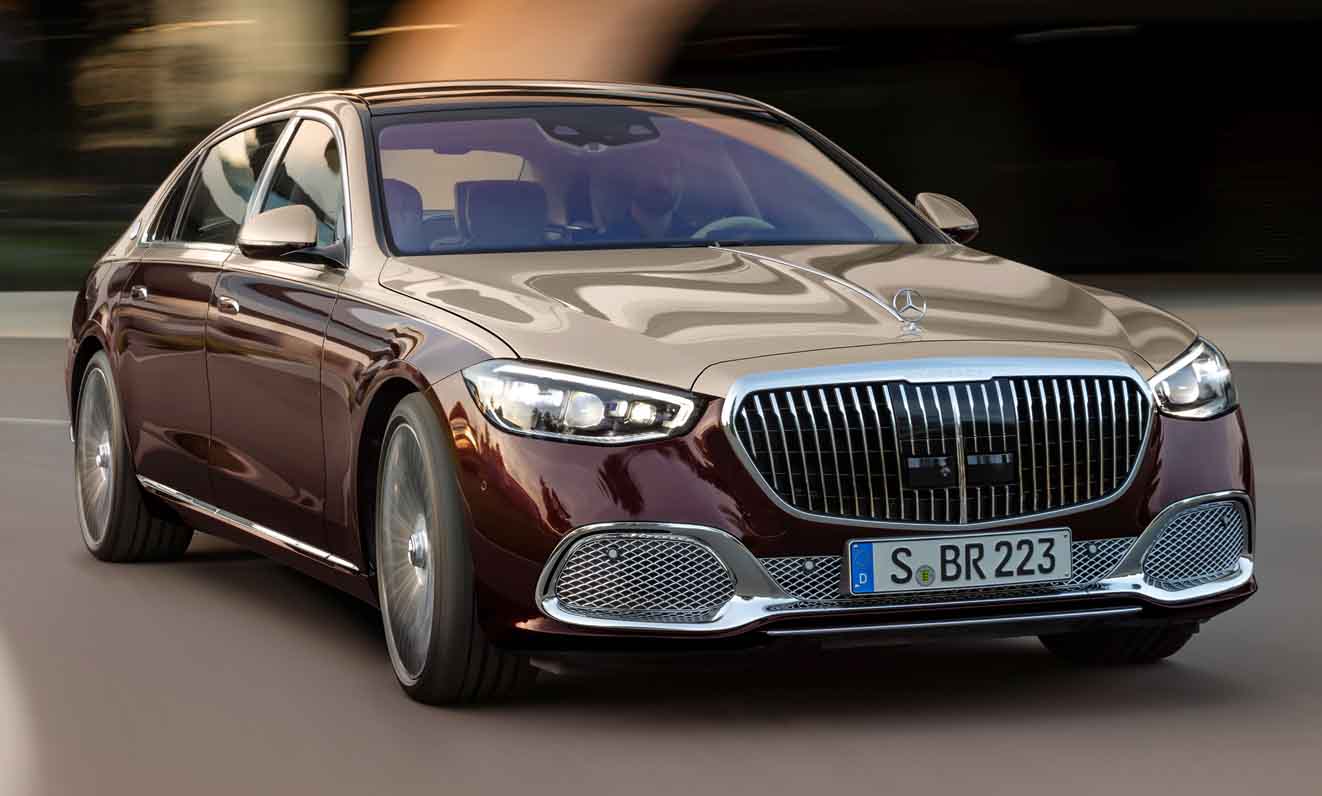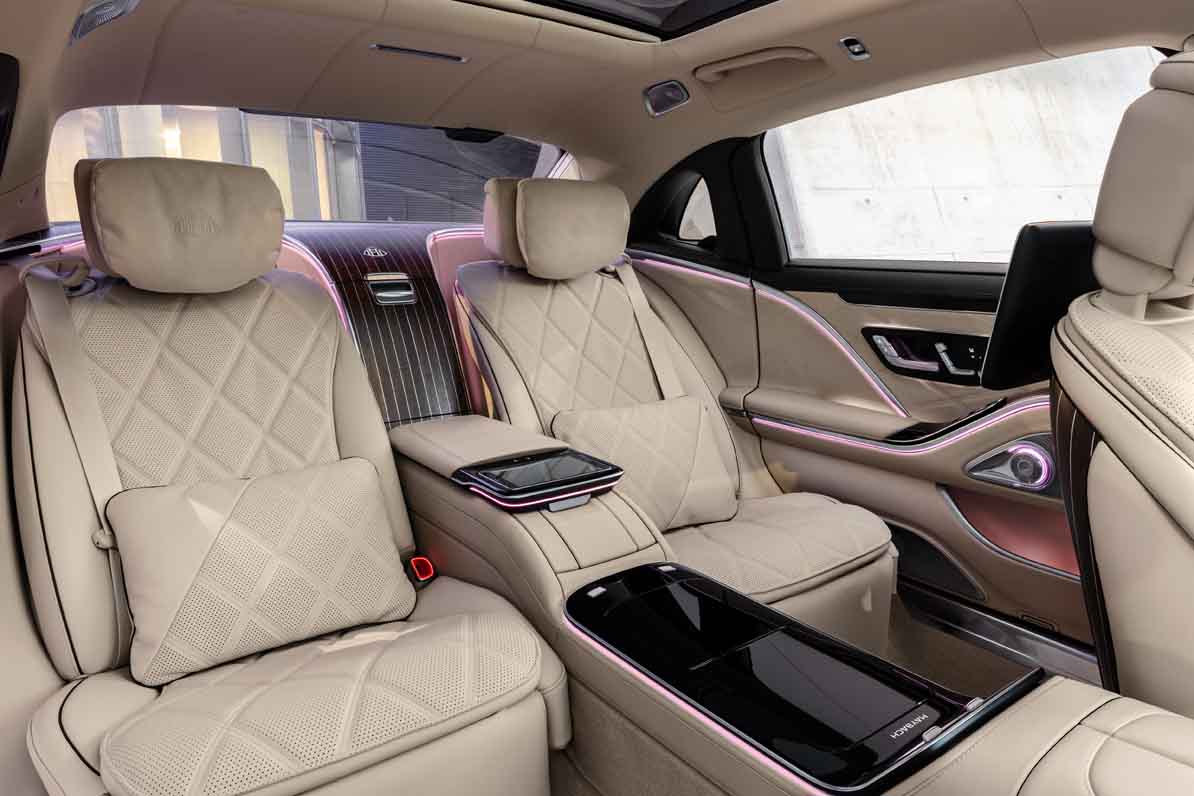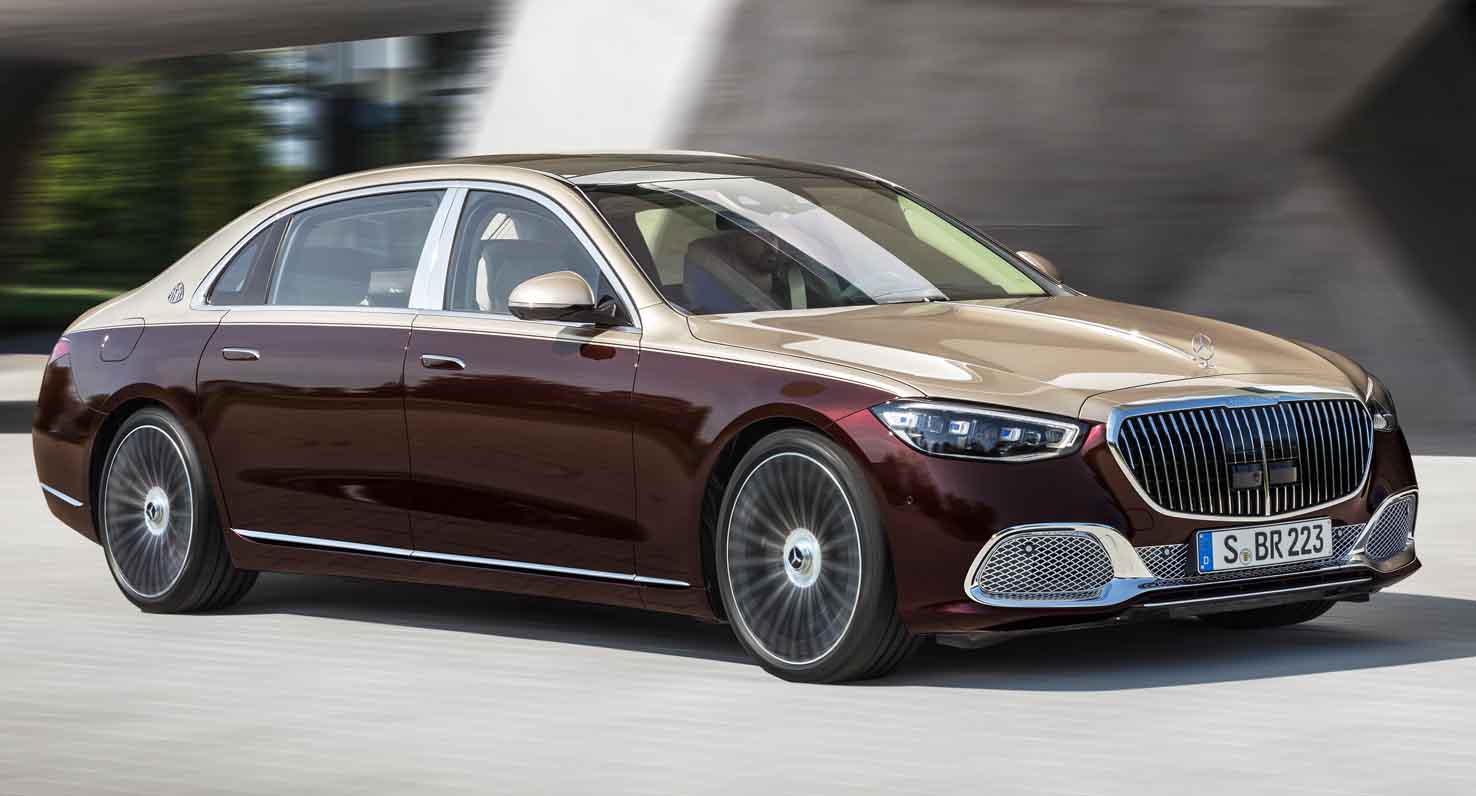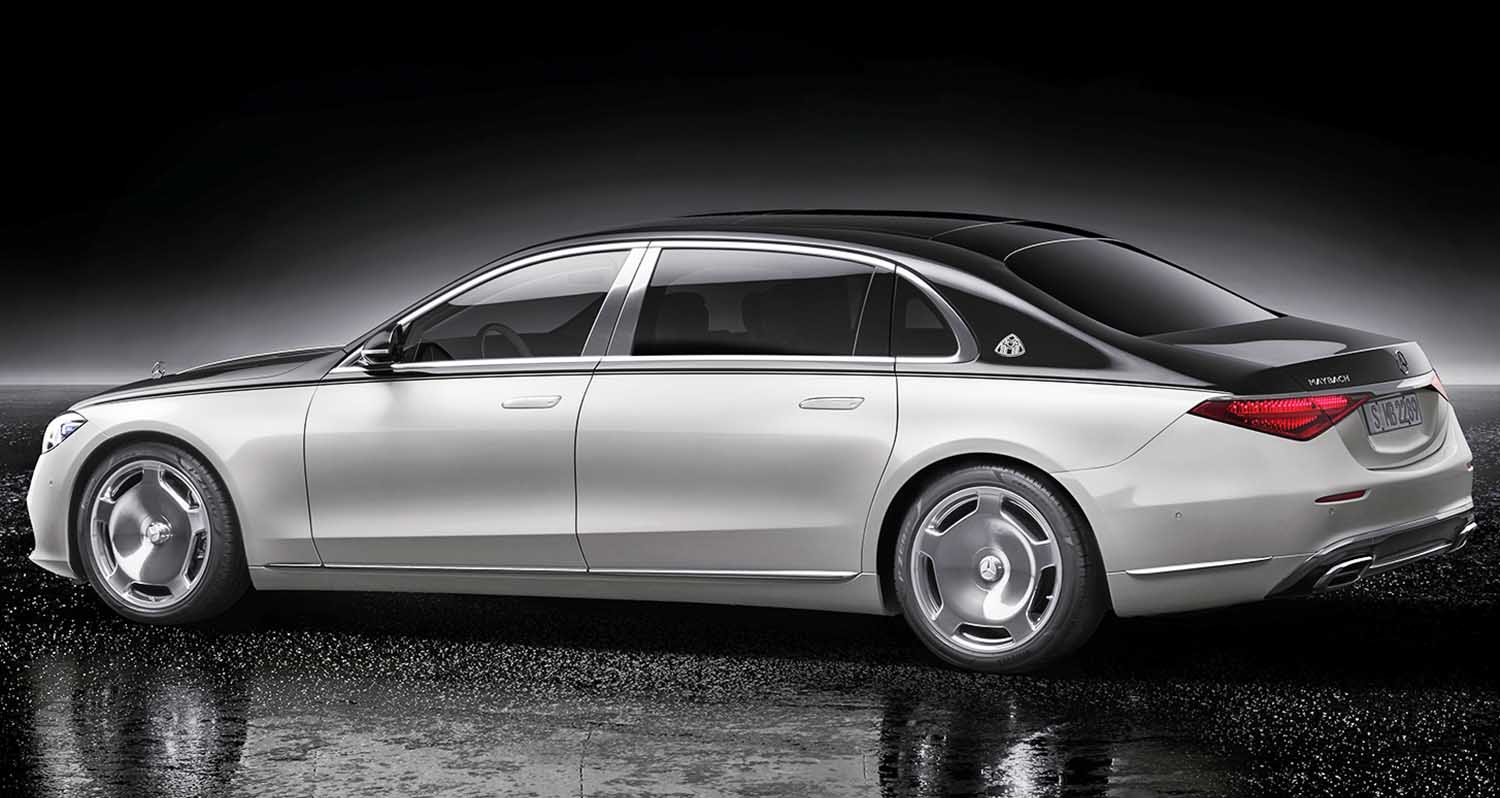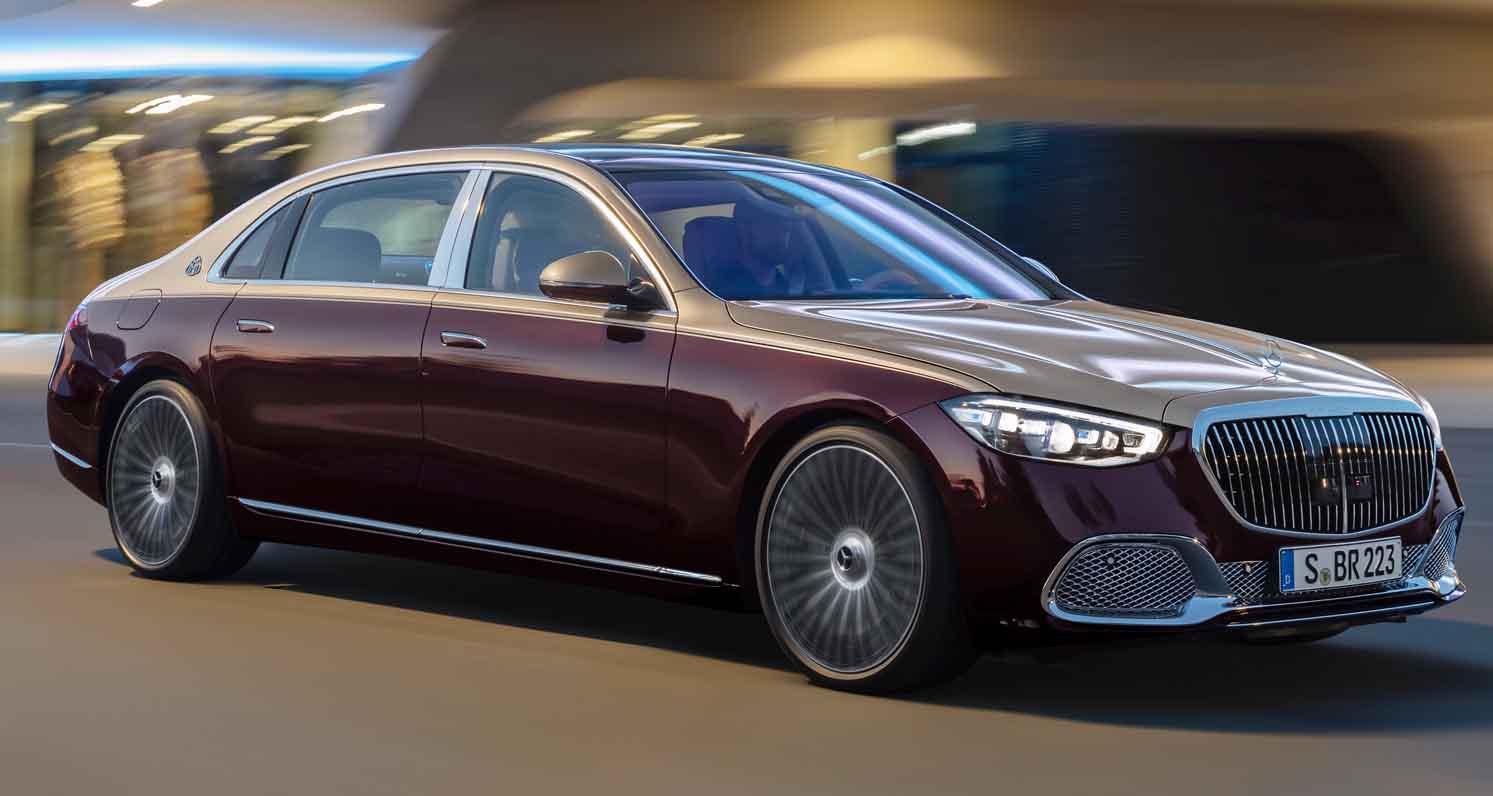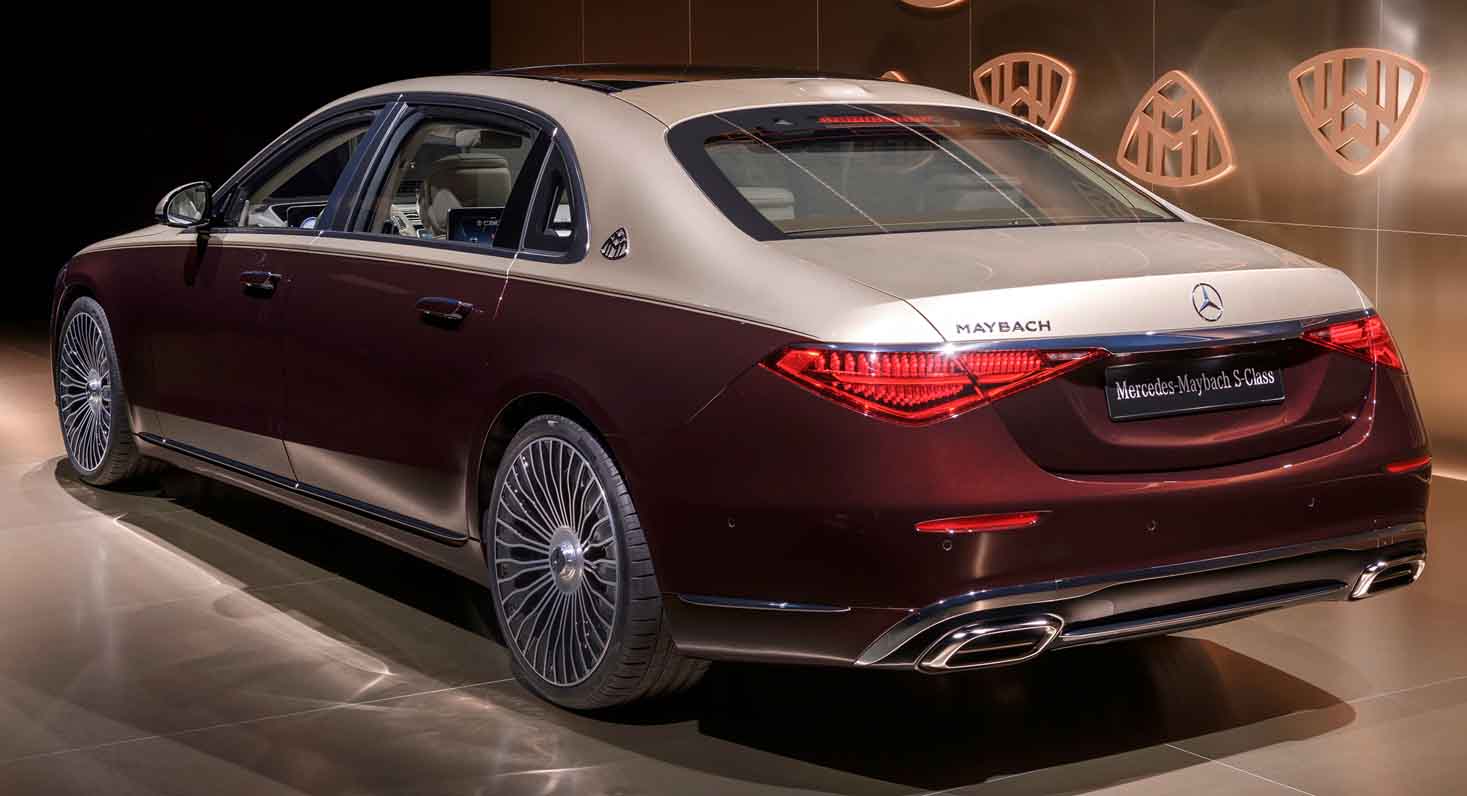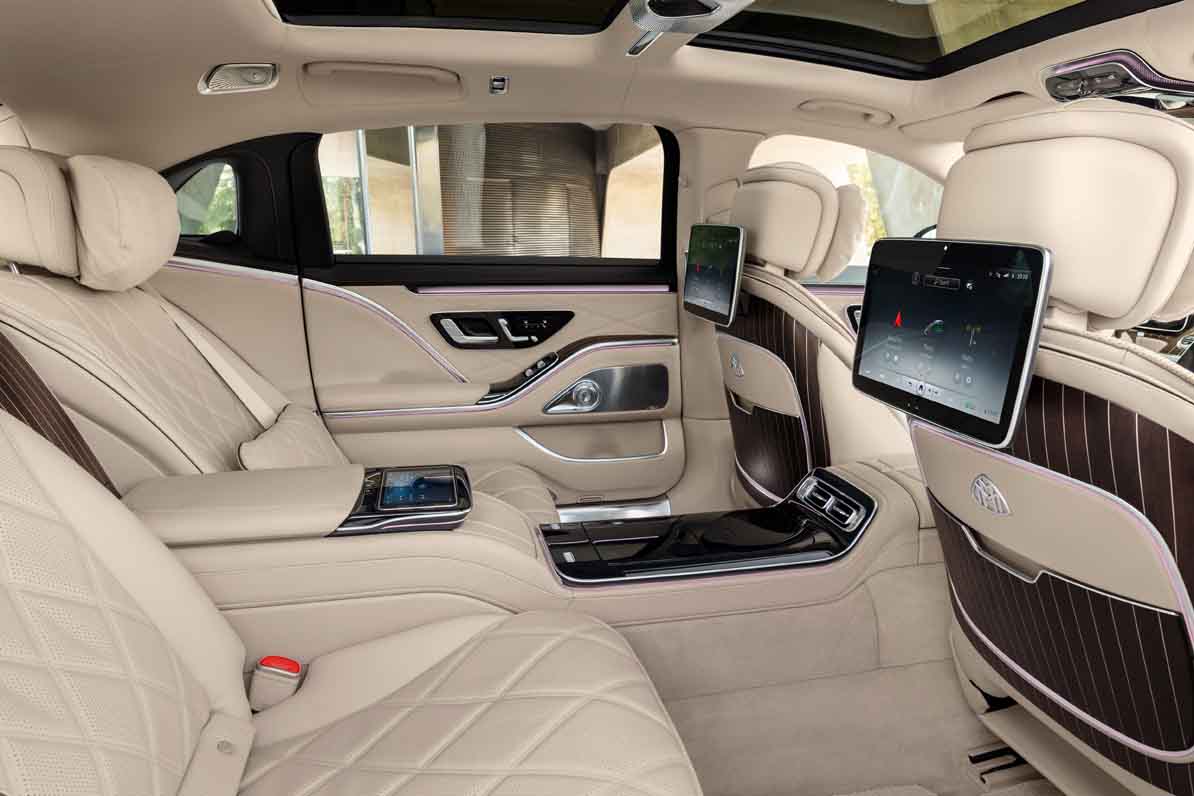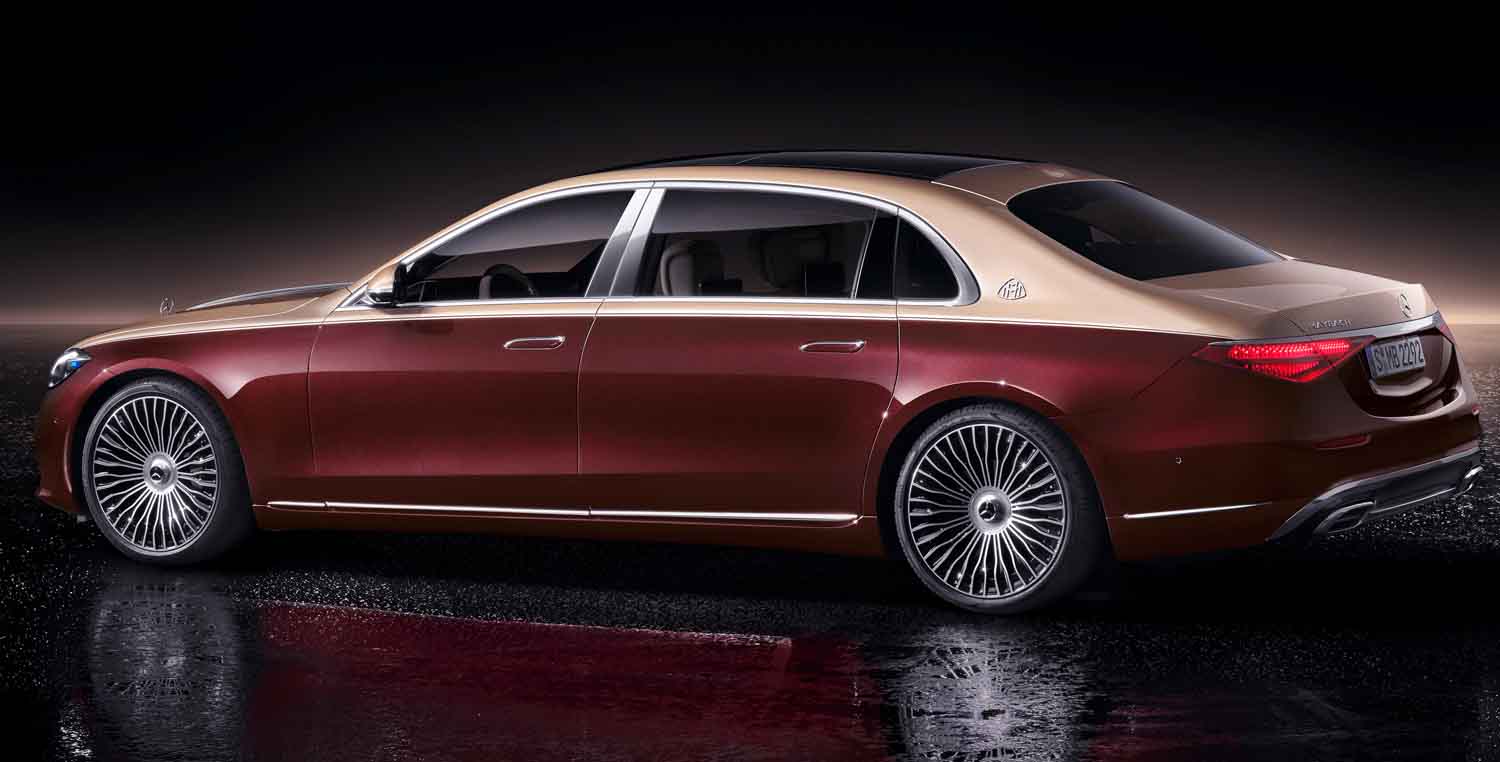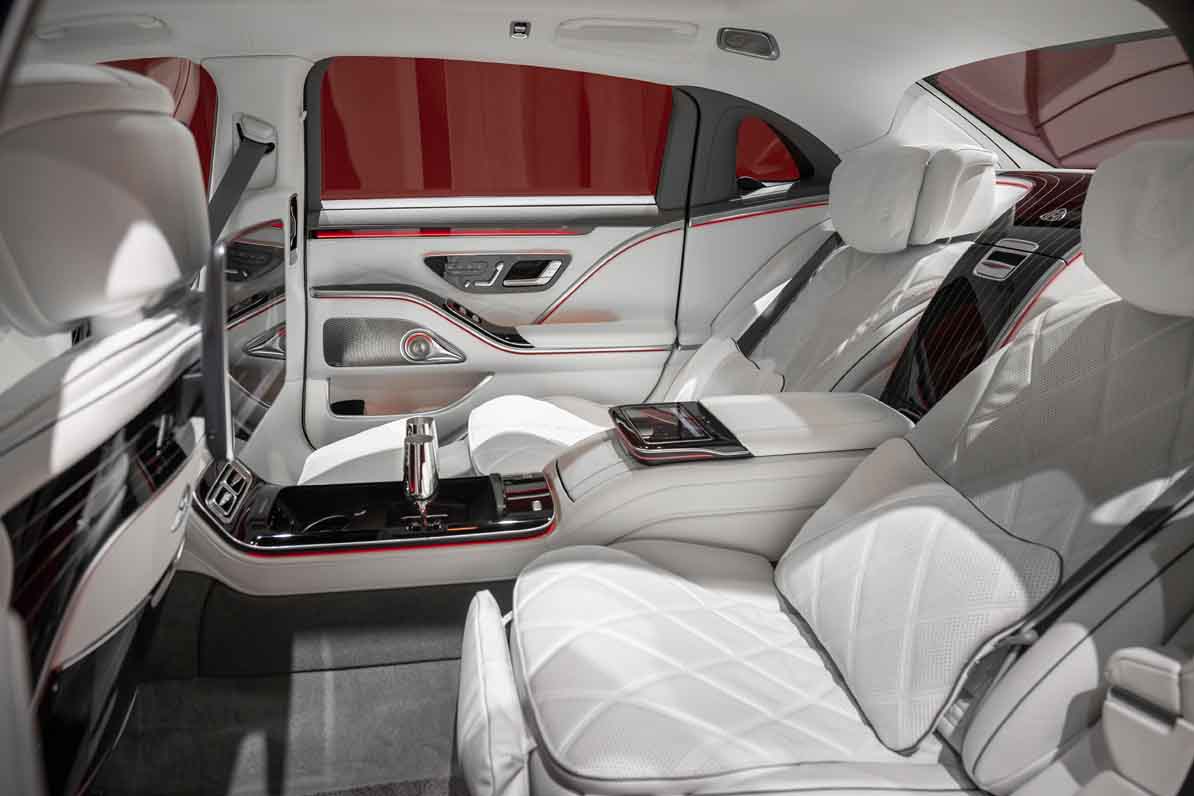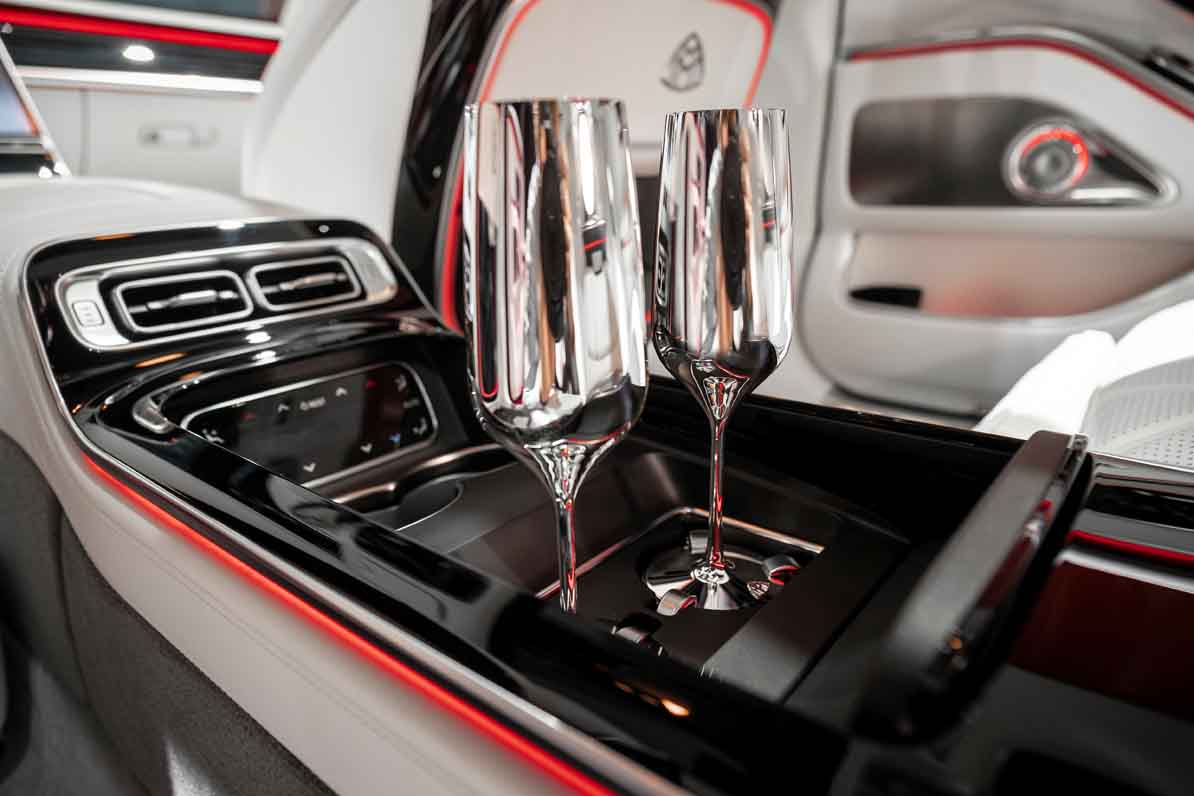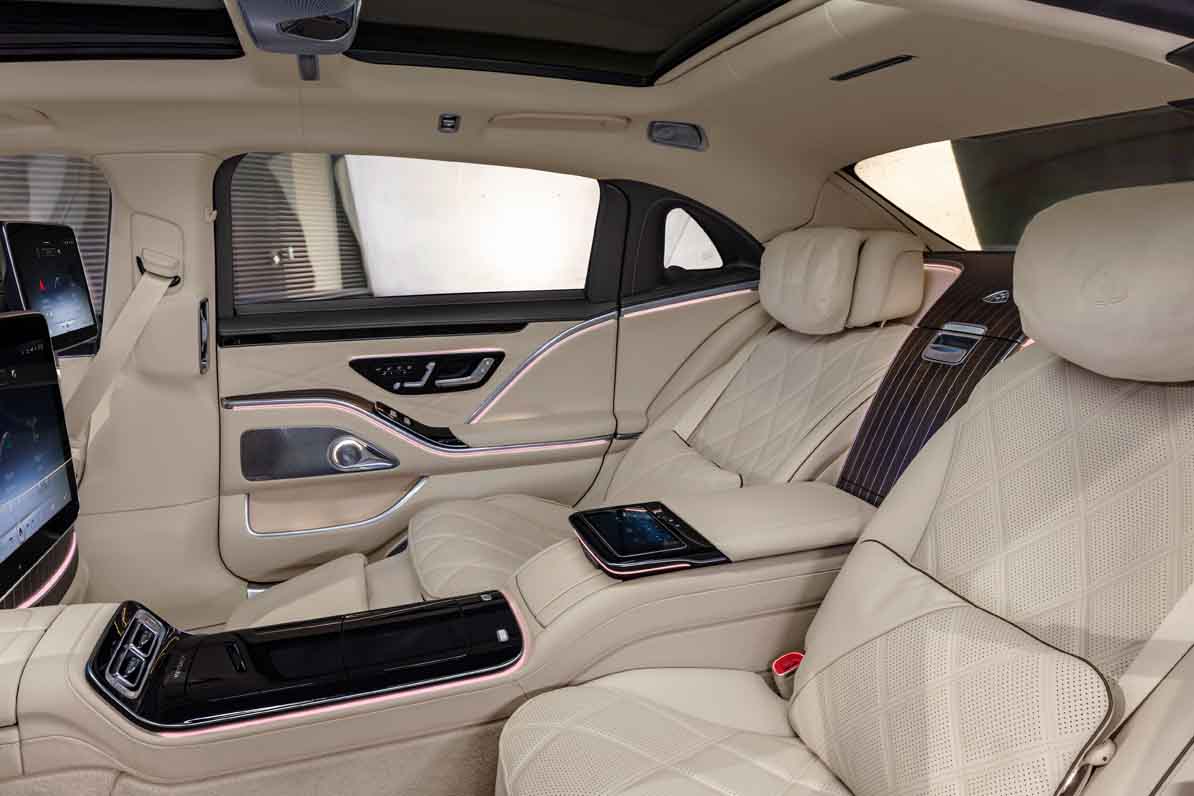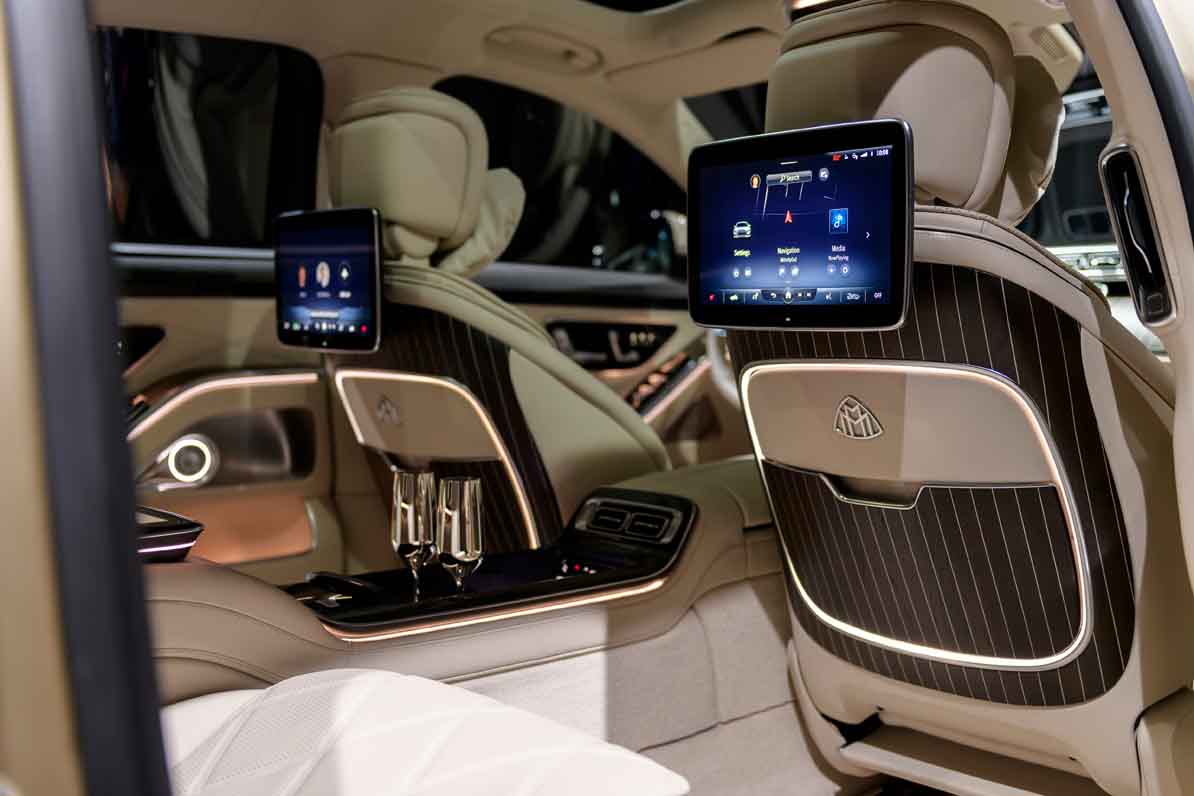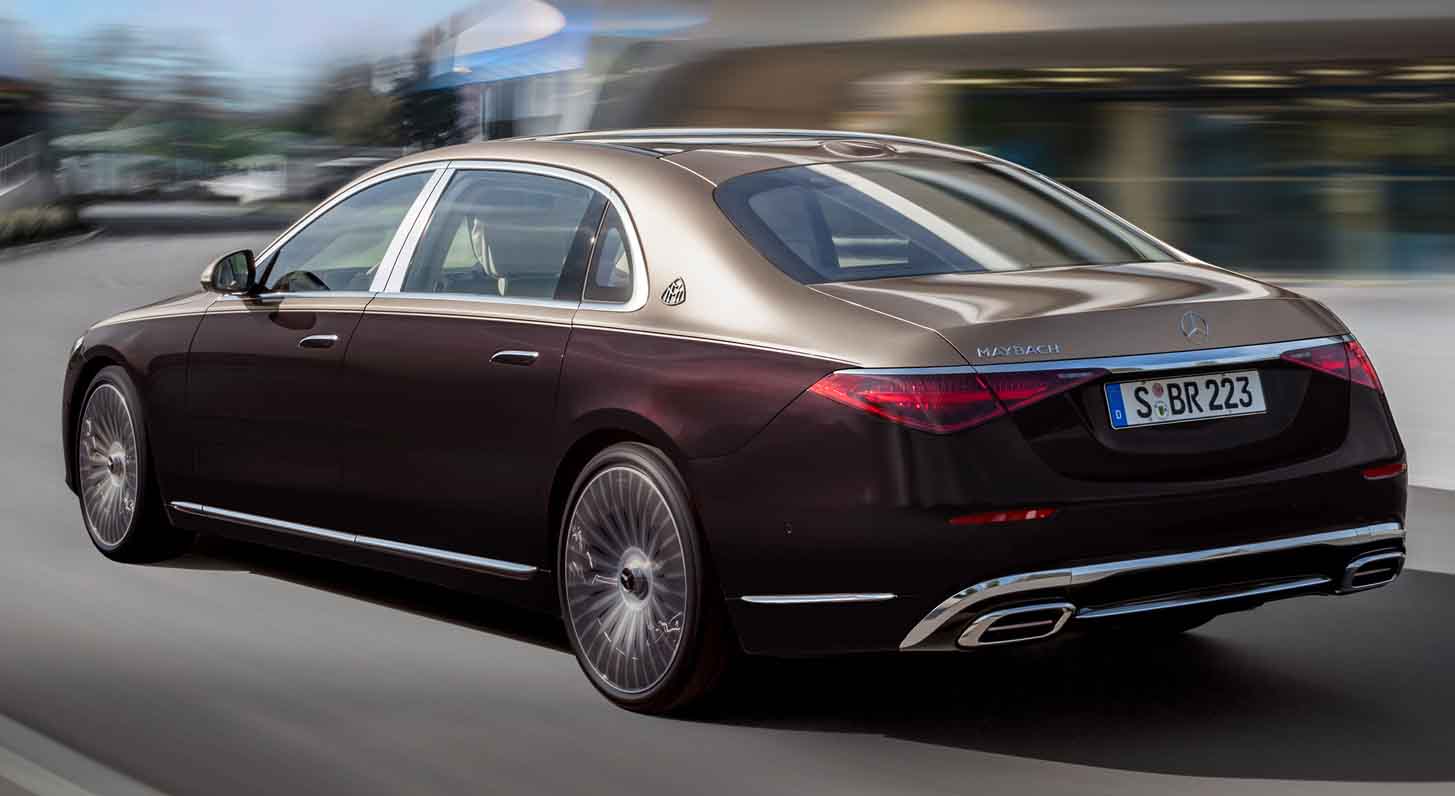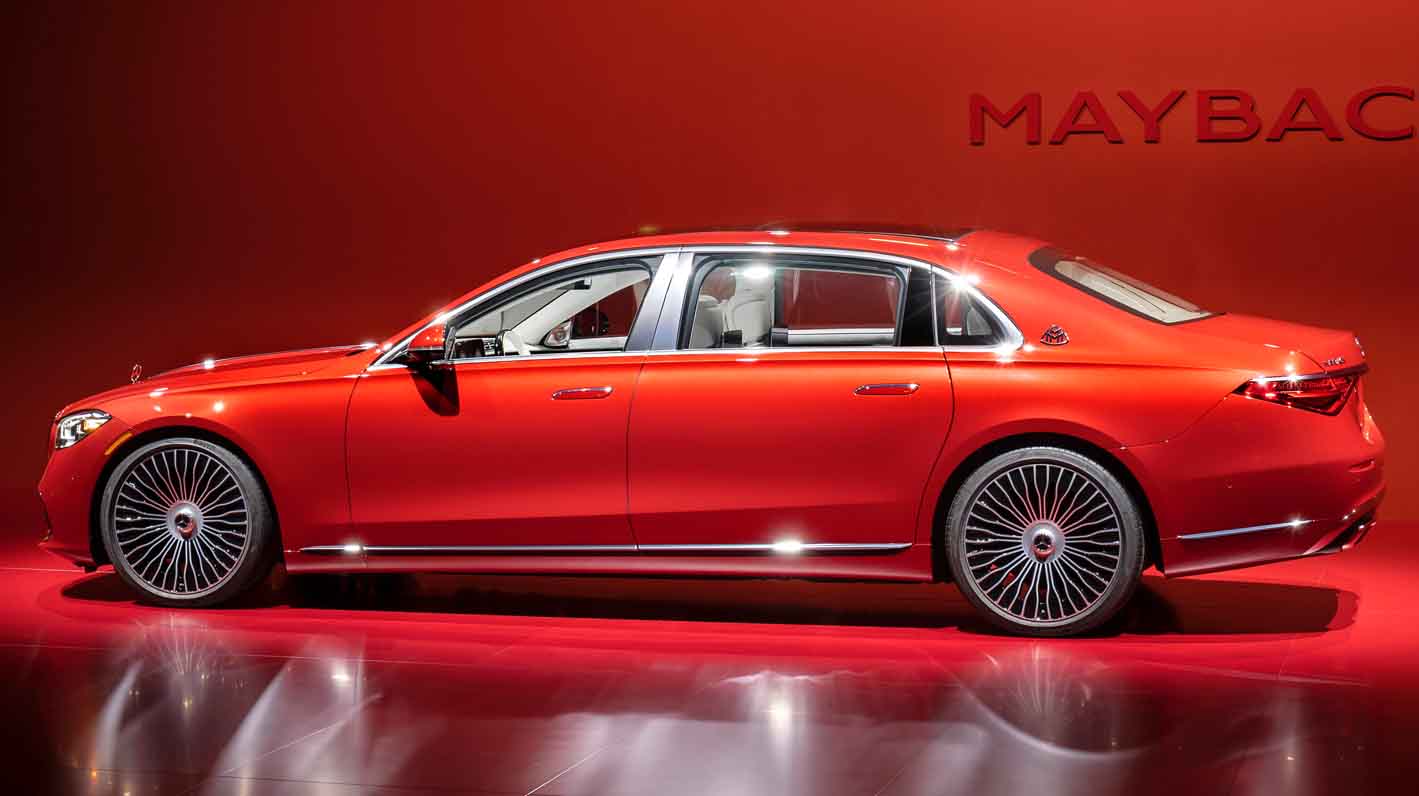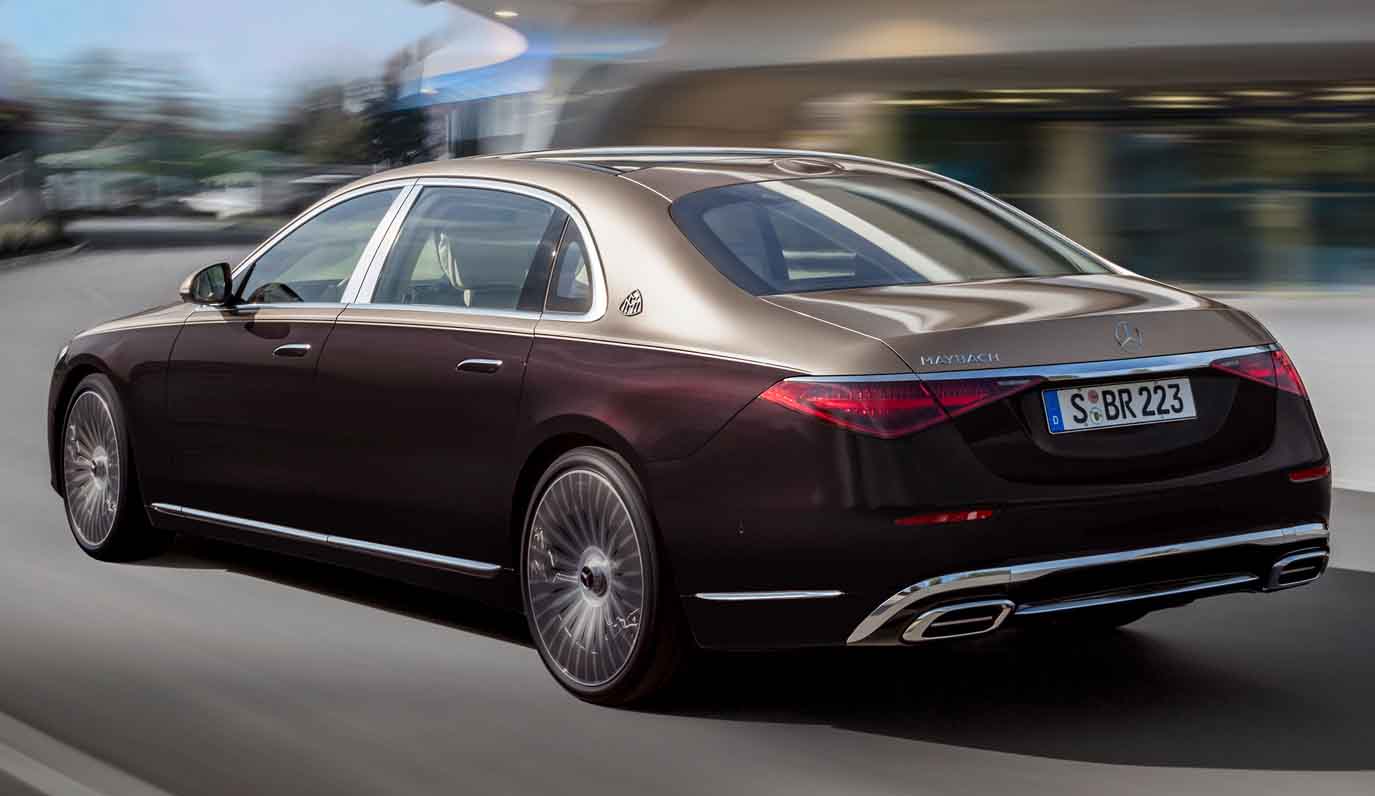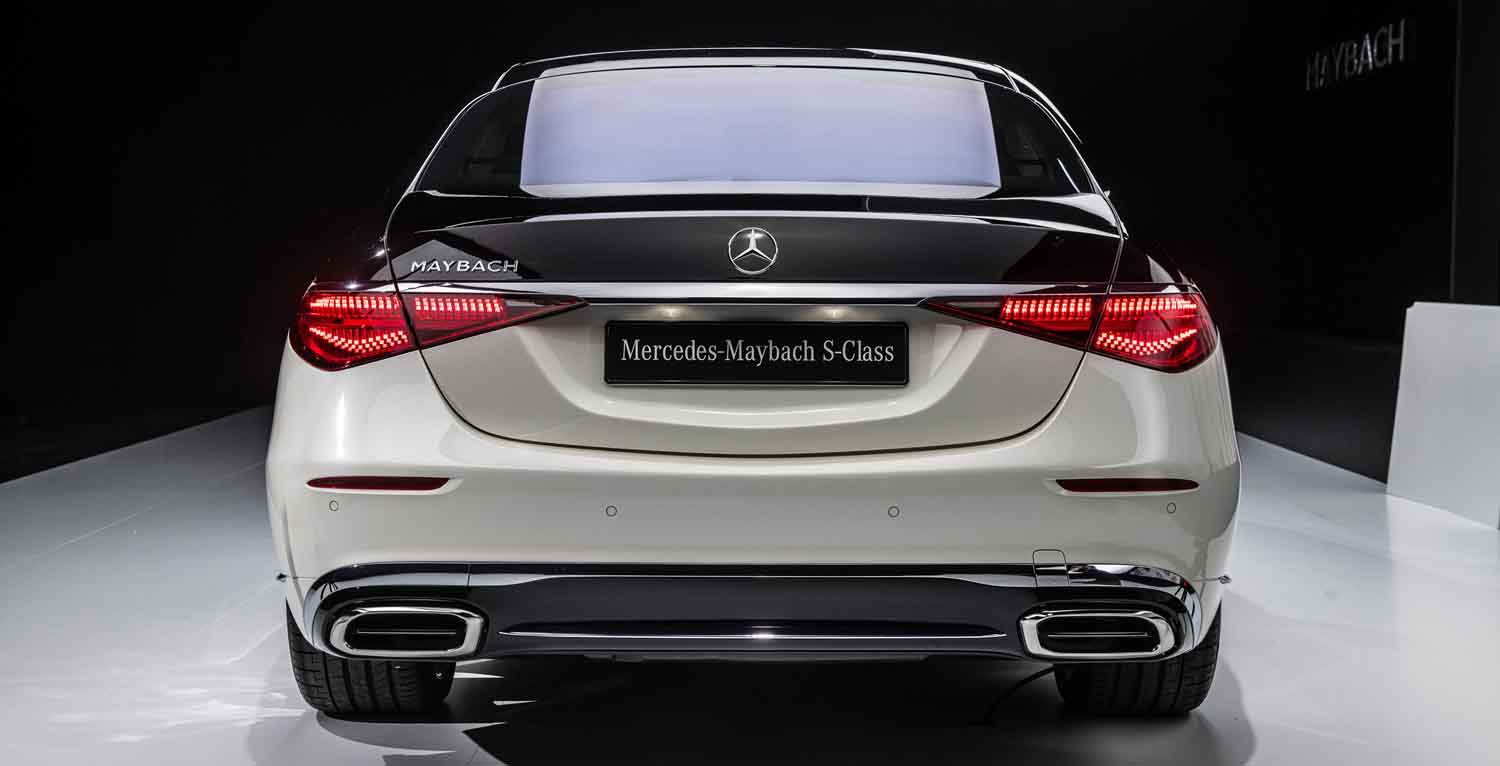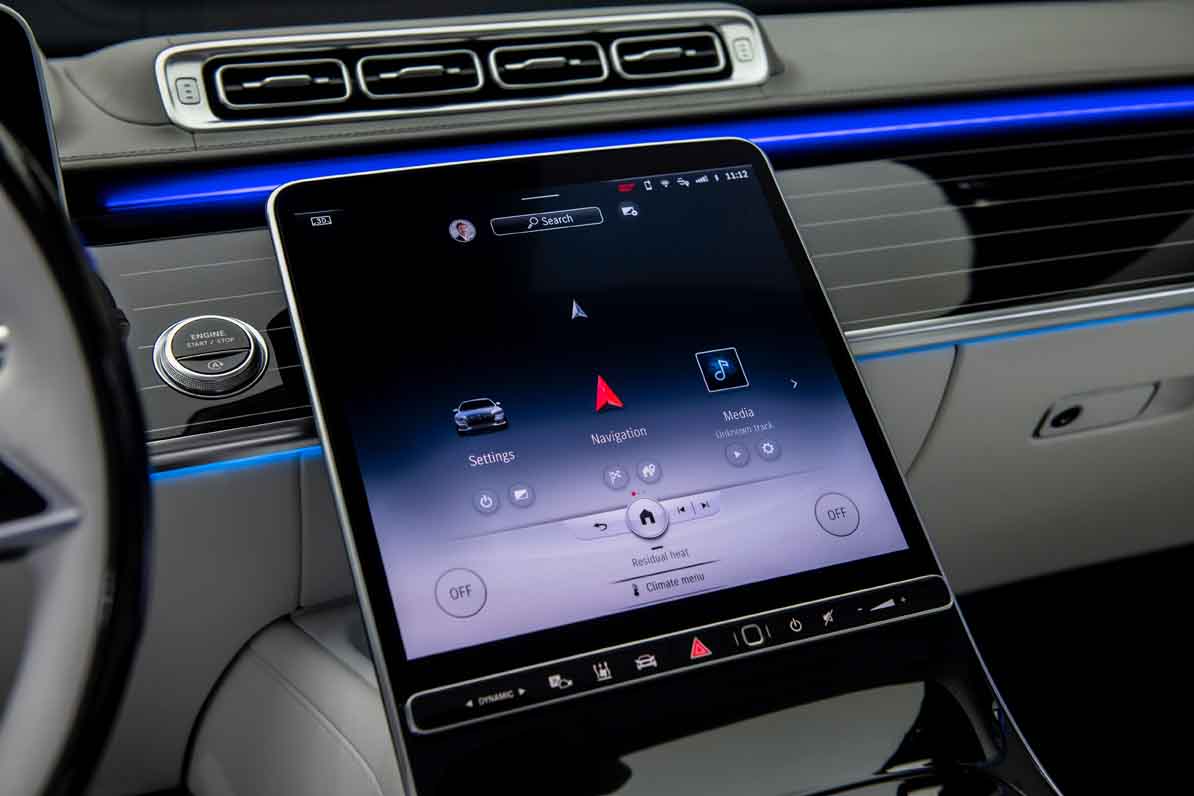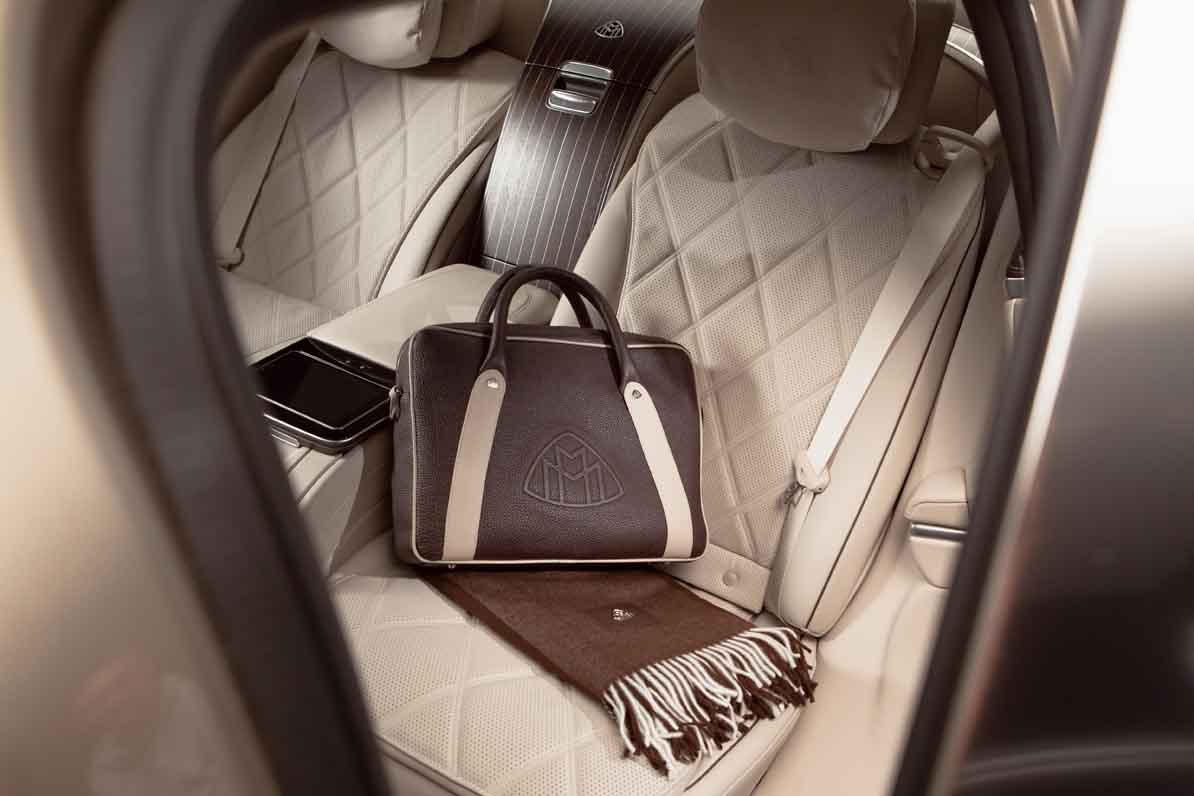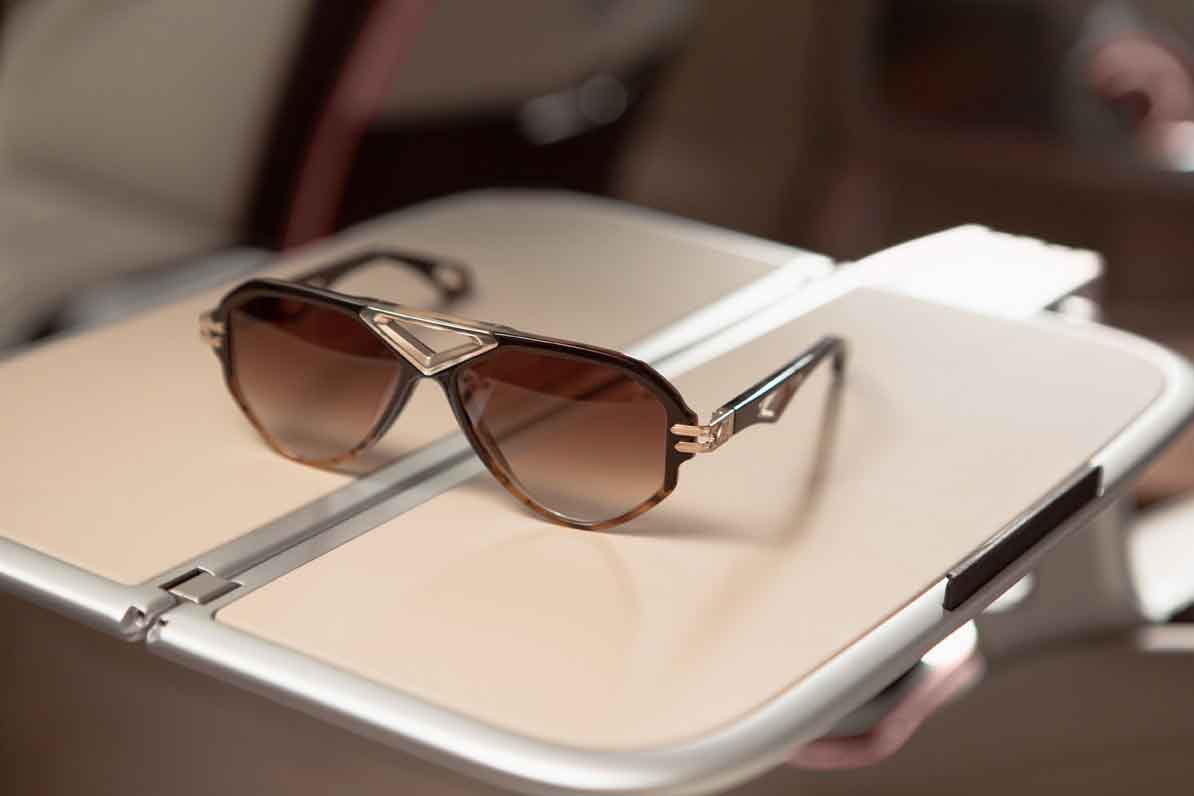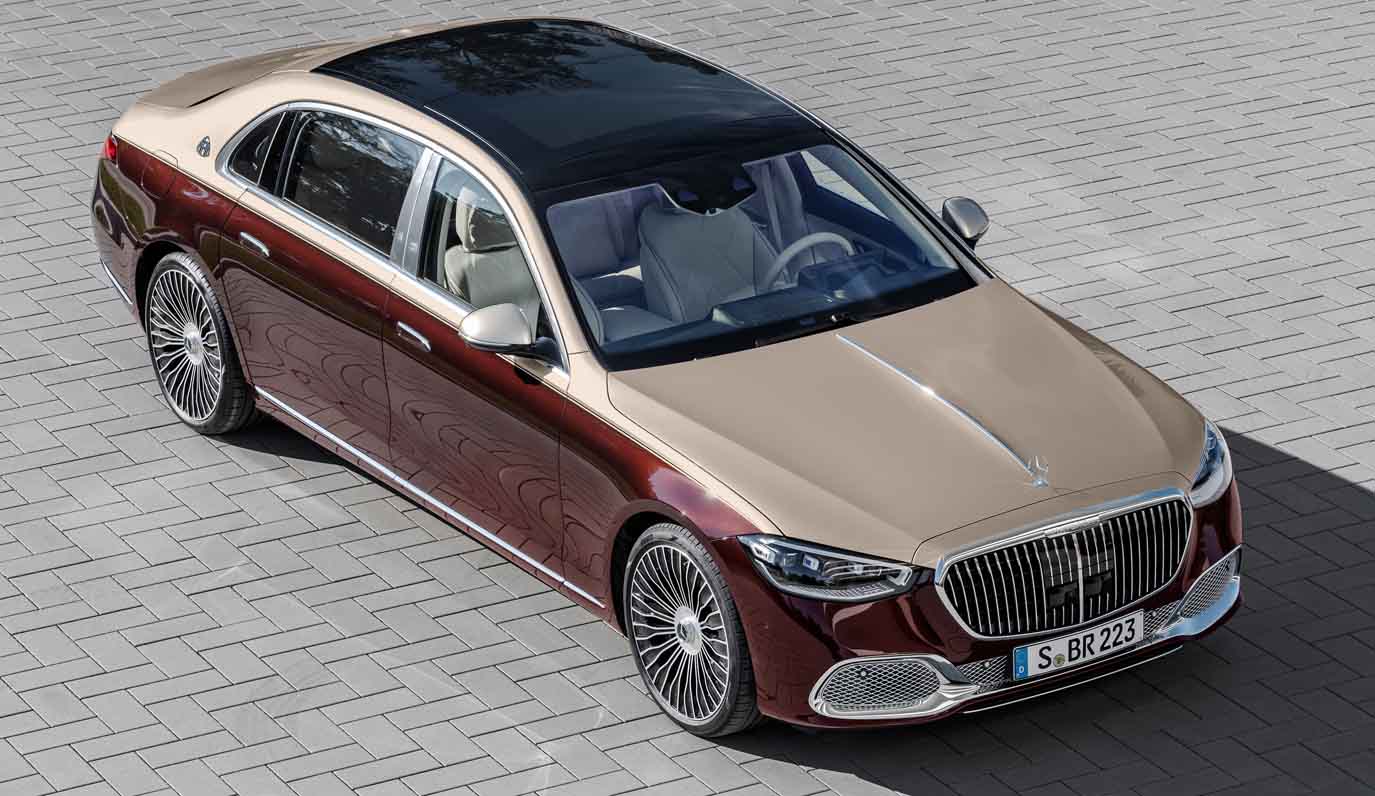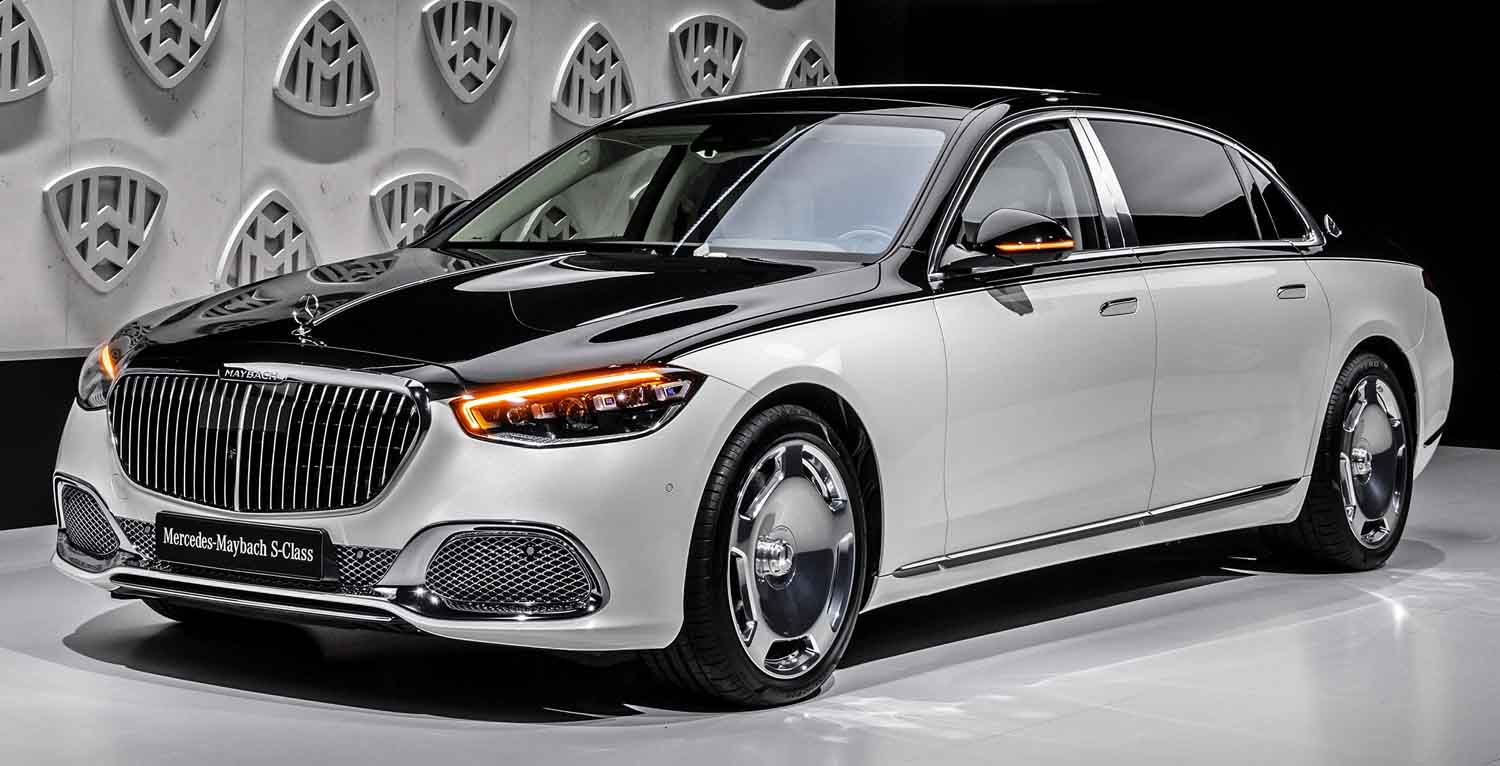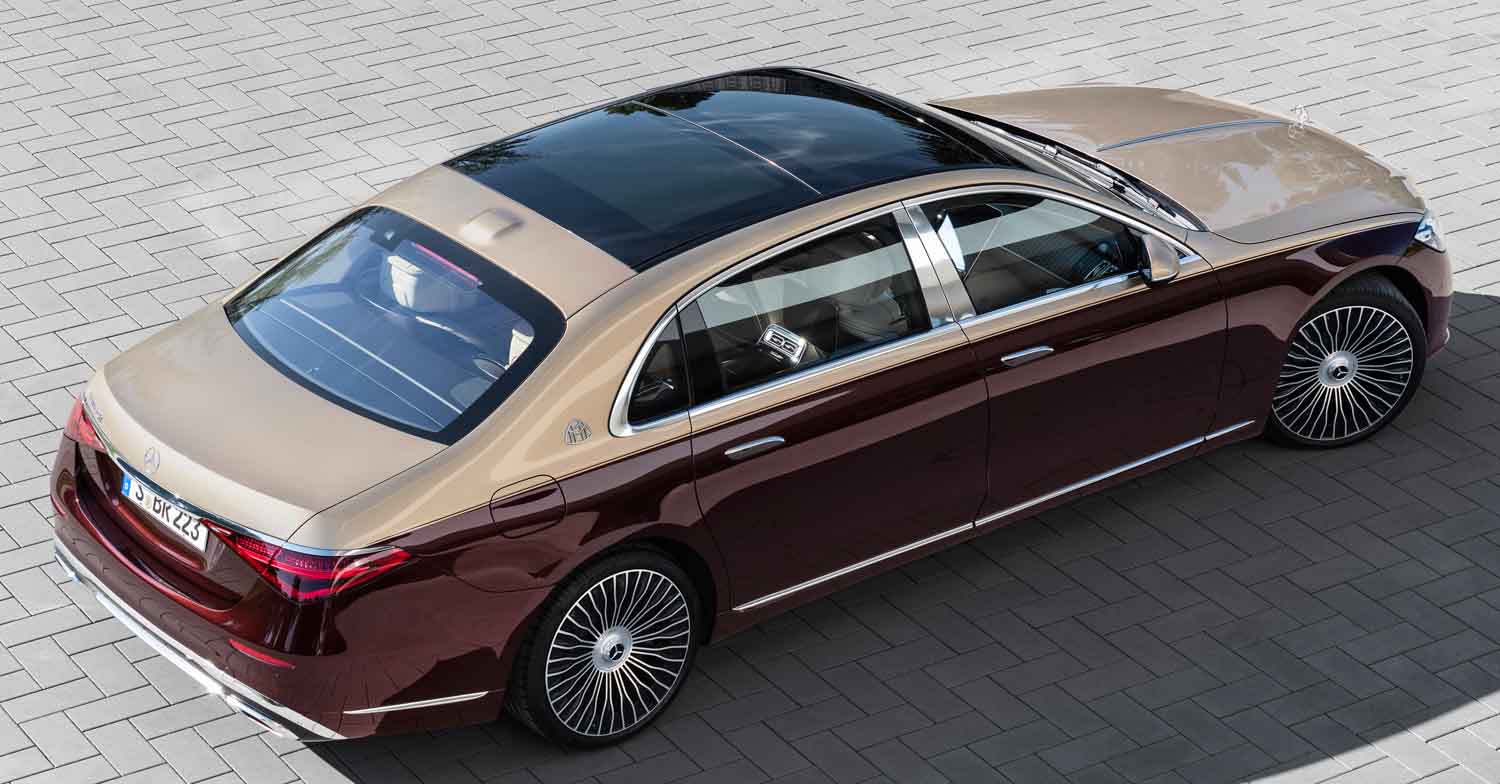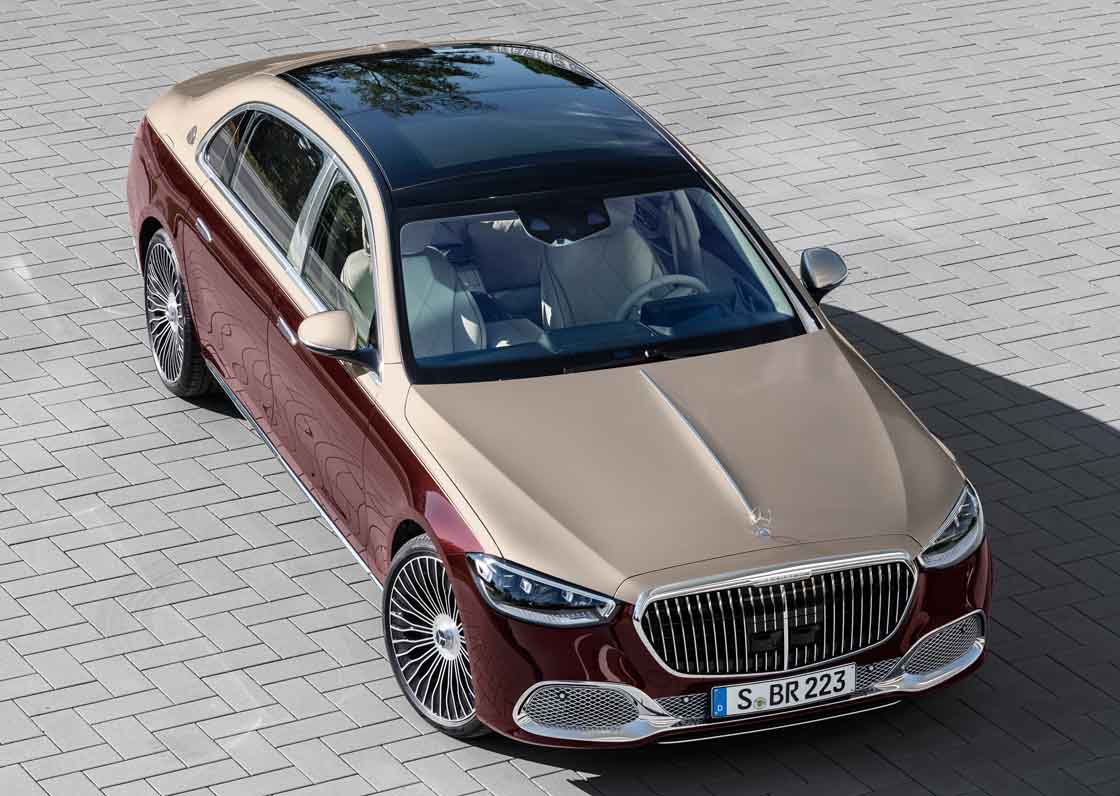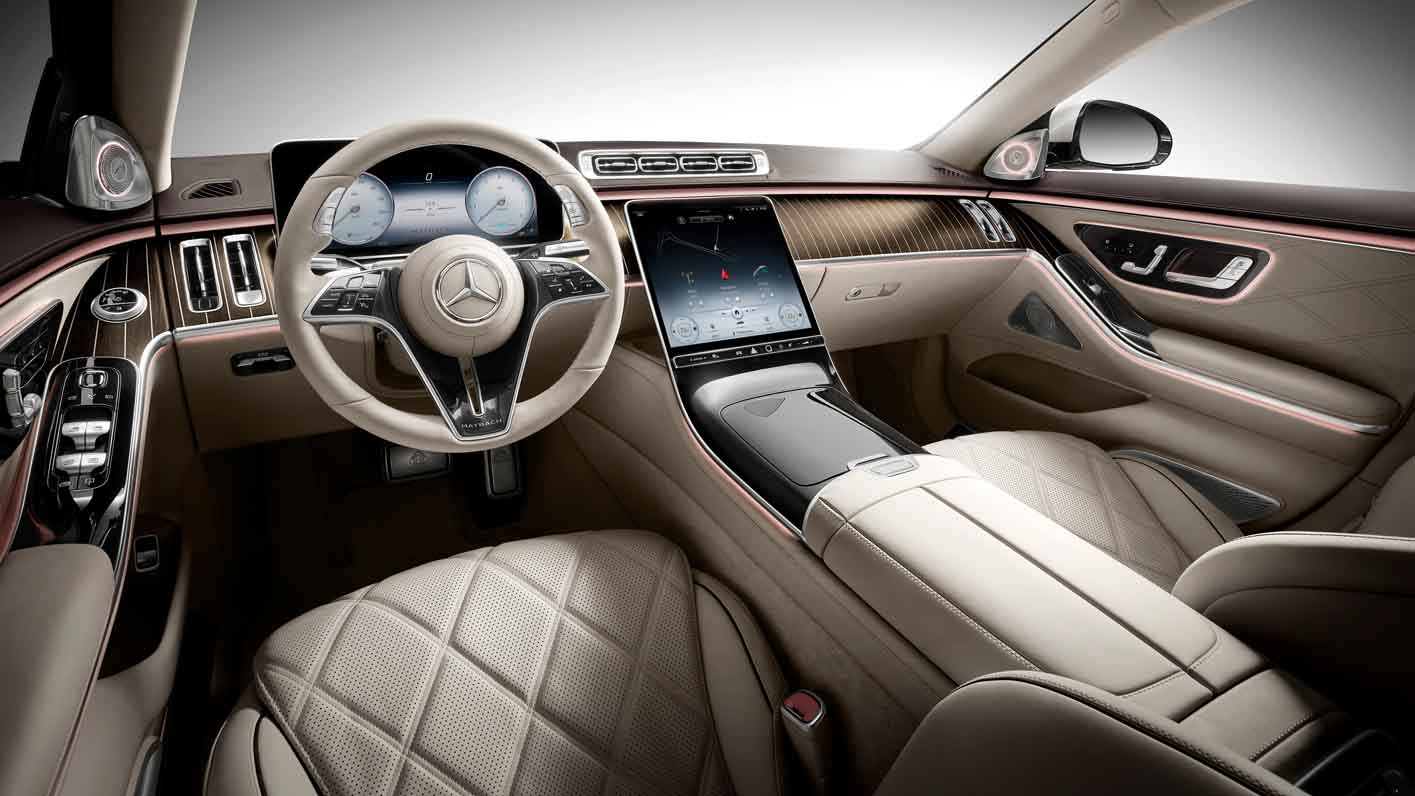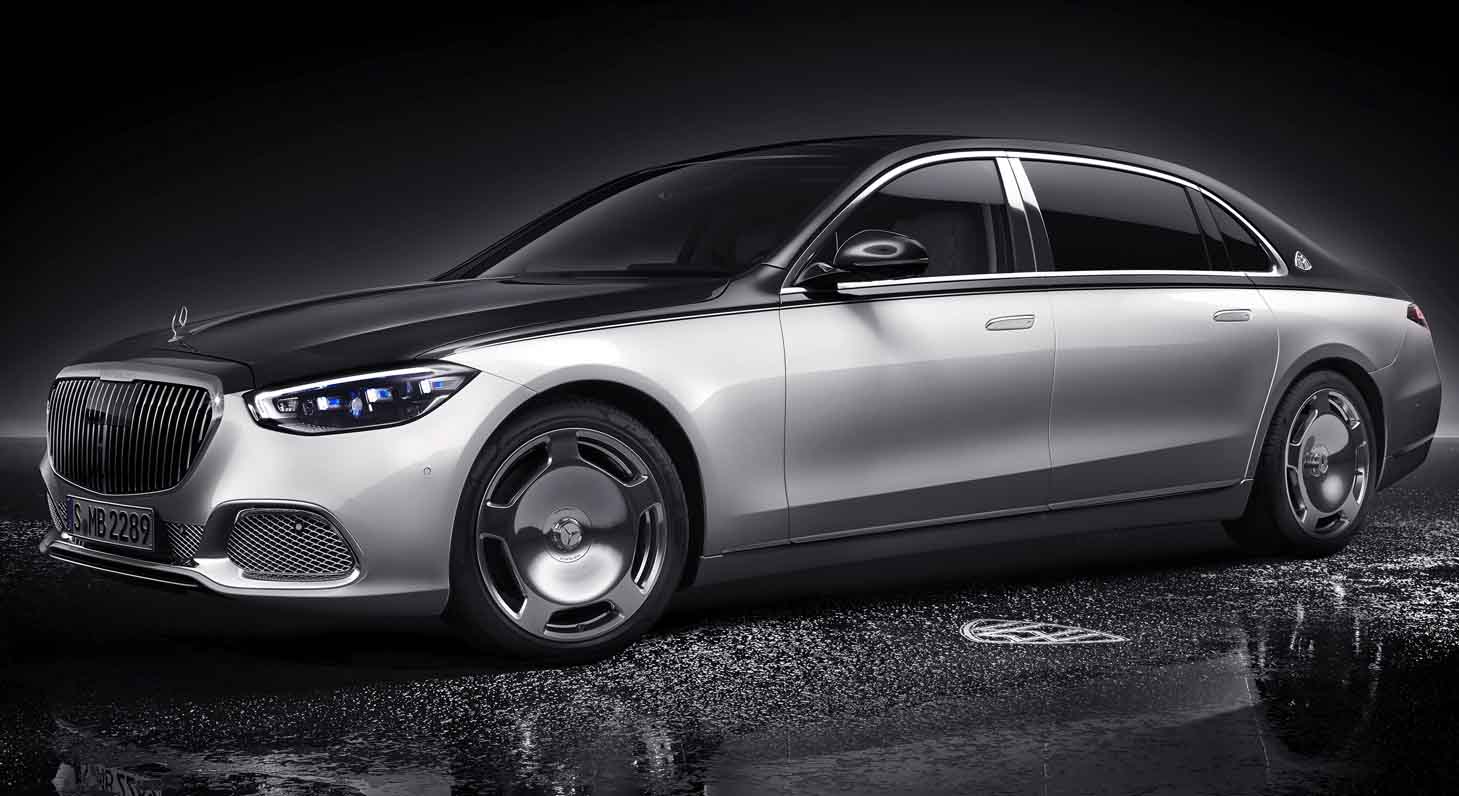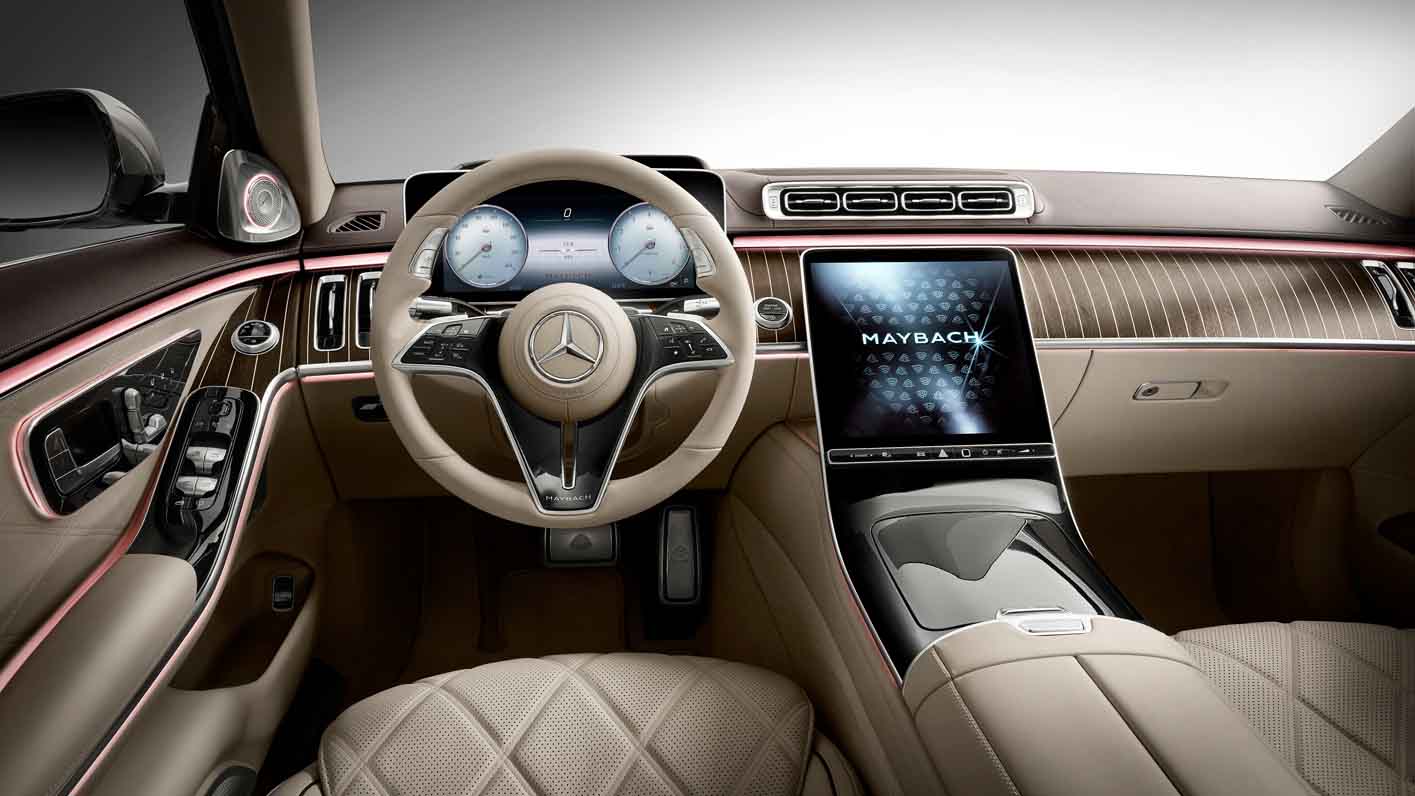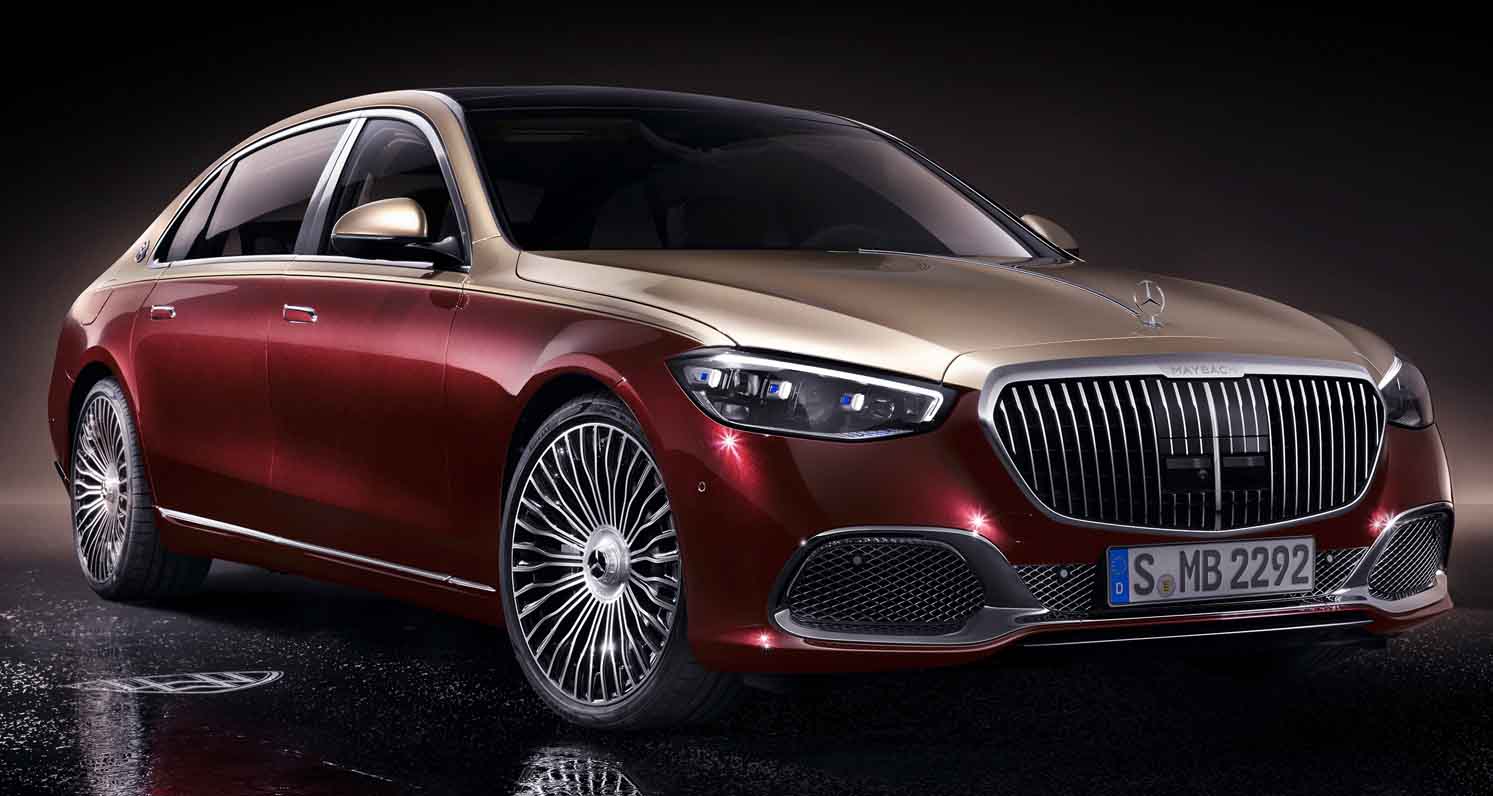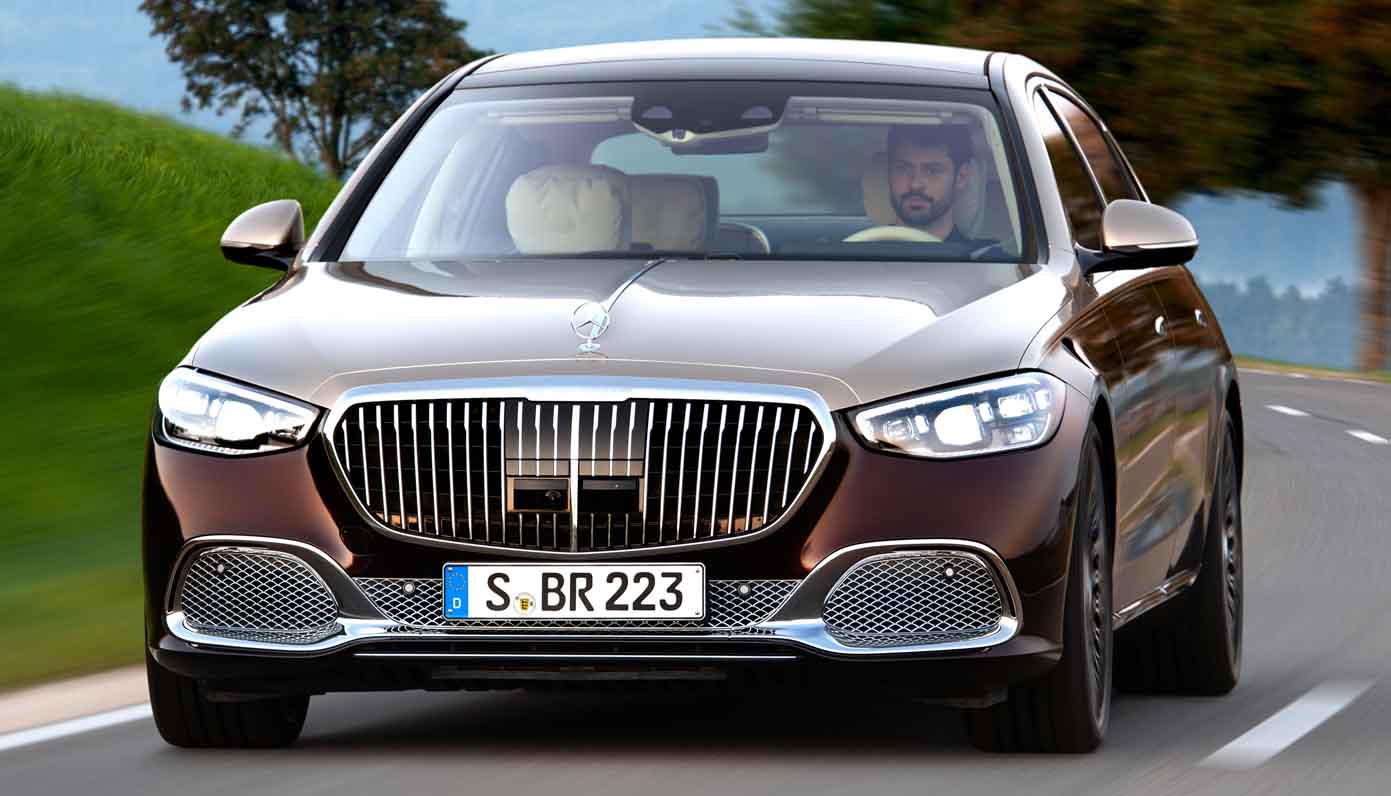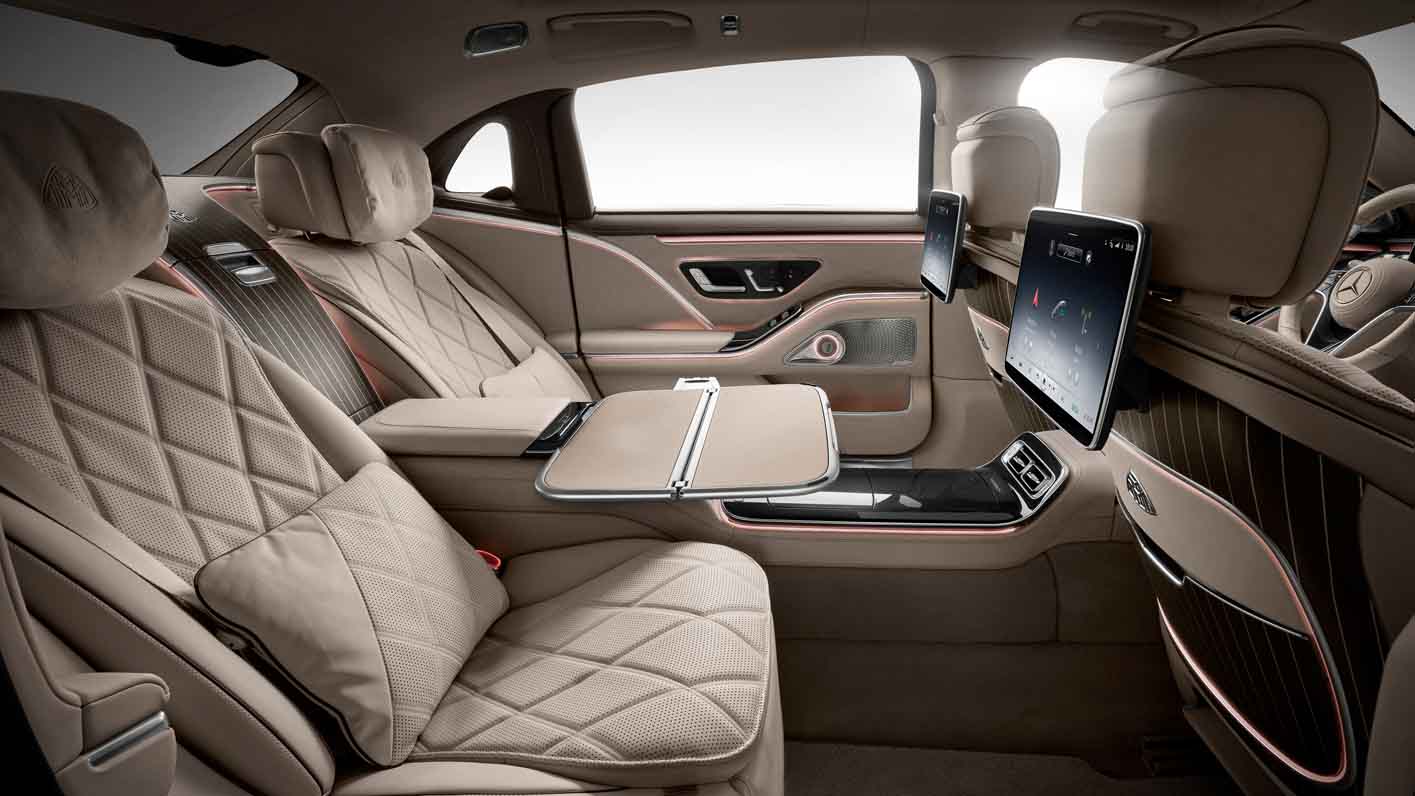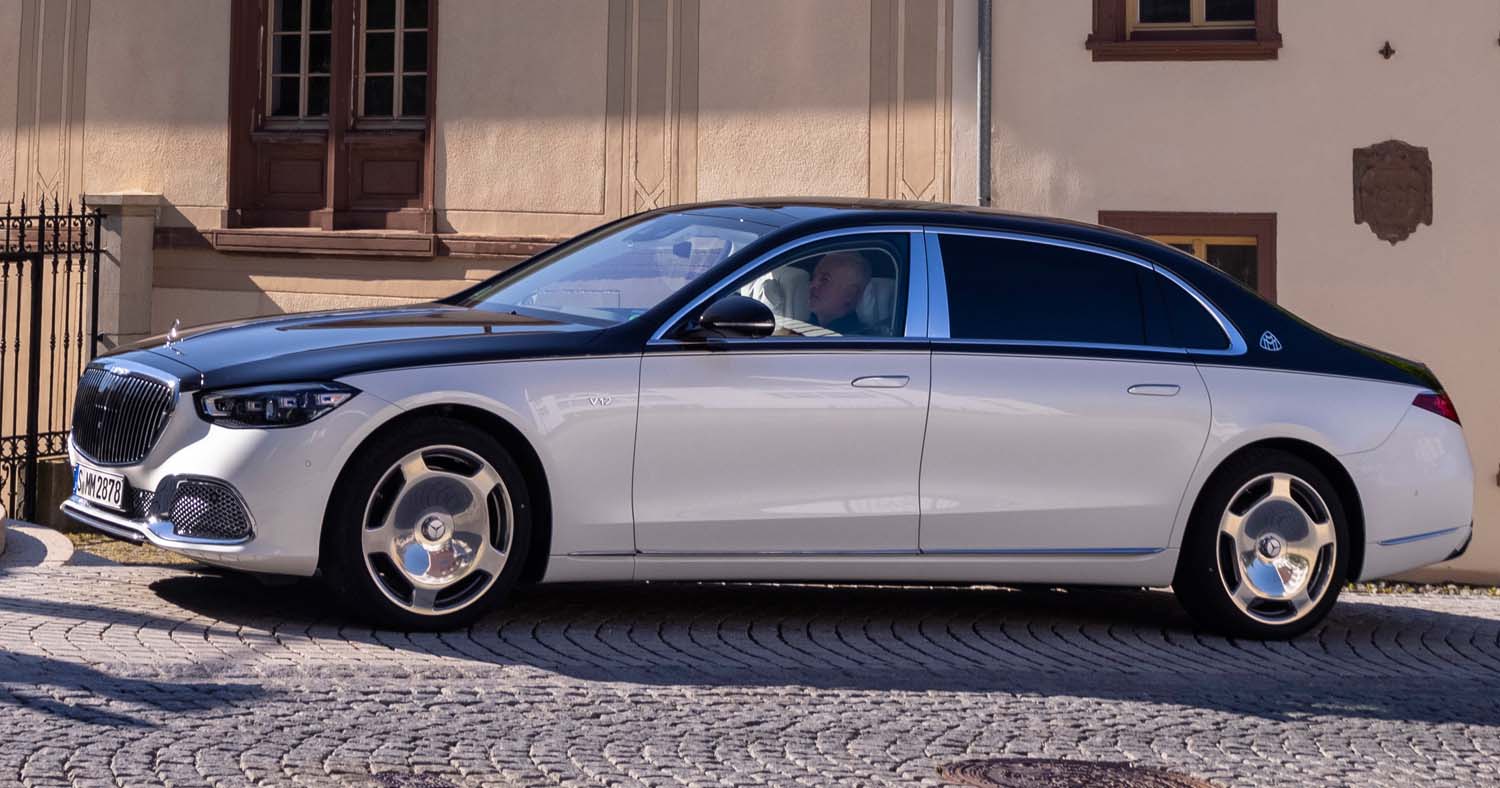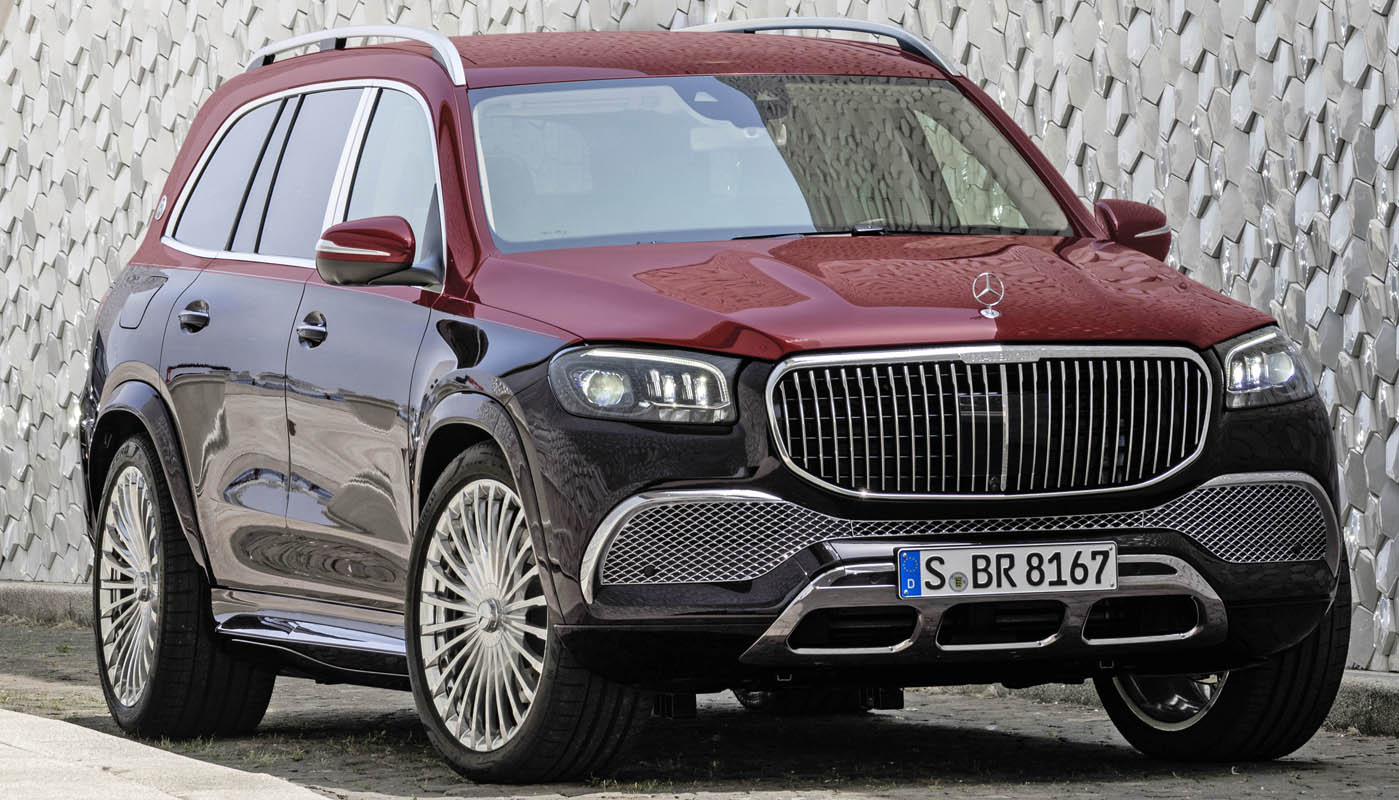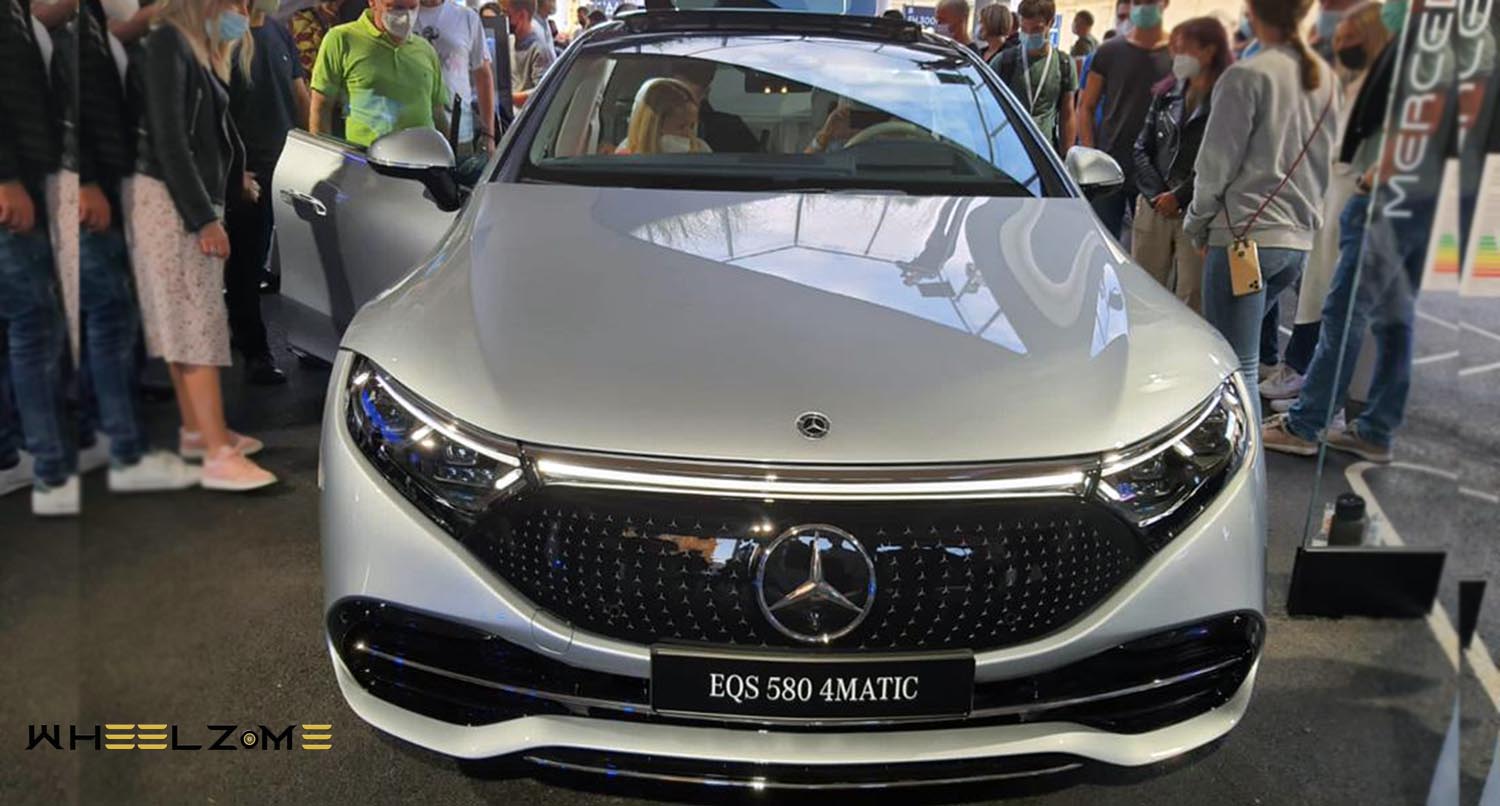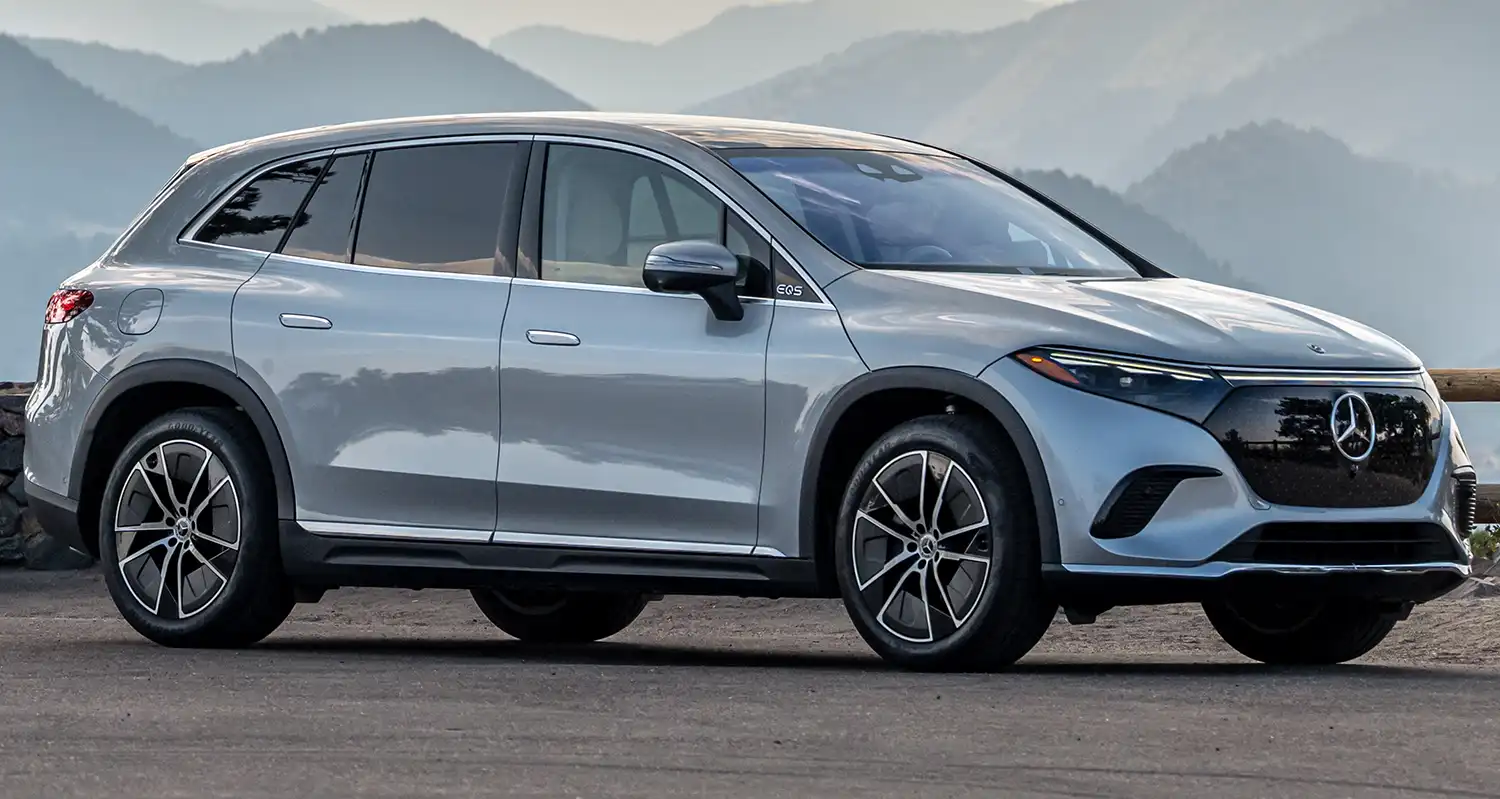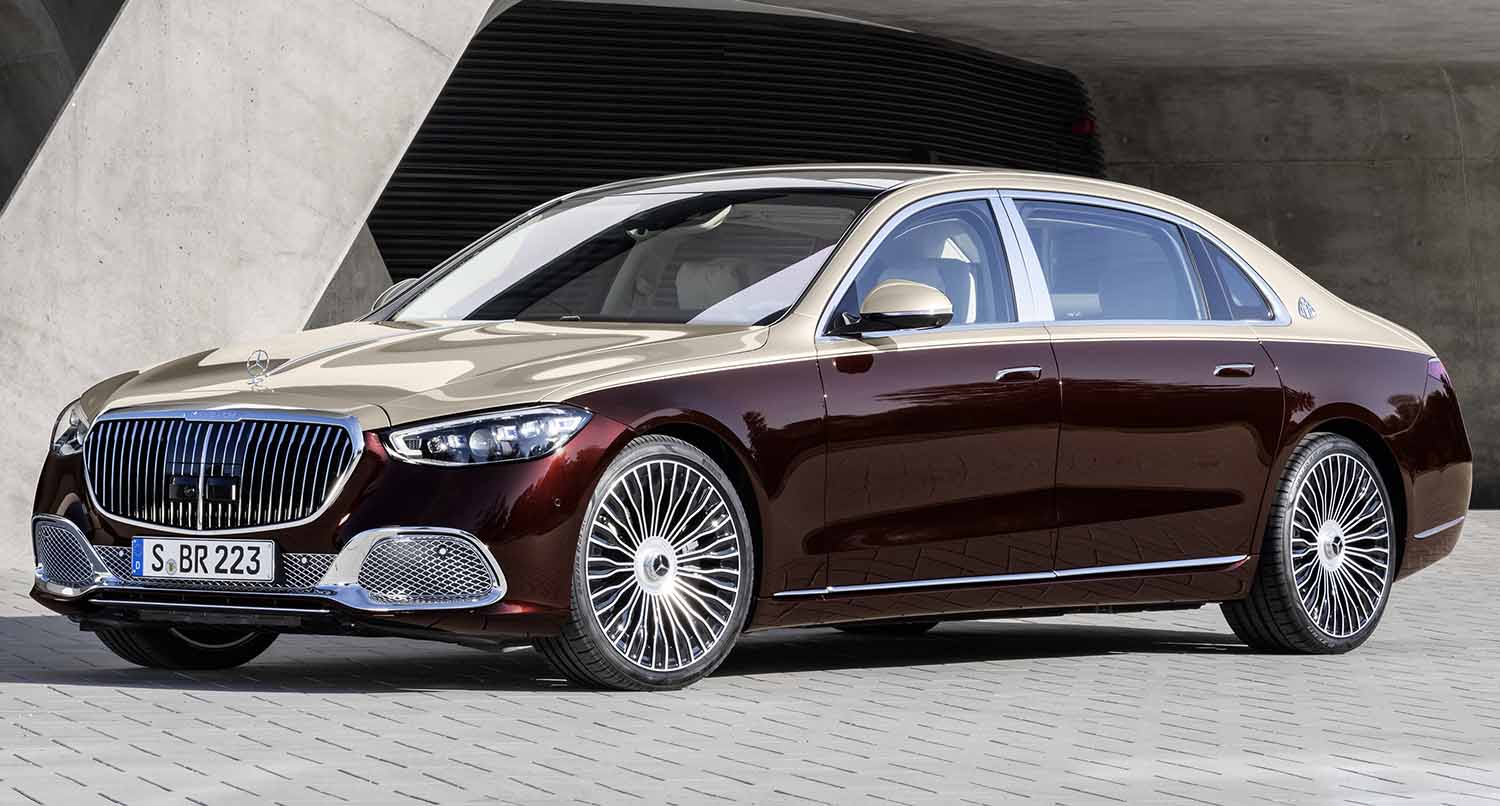
Since the market launch in 2015, around 60,000 examples of the Mercedes-Maybach S-Class have been delivered worldwide. In 2019, with around 12,000 units, more Mercedes-Maybach S-Class cars were sold than ever before. The growth rate in China was in double figures. Alongside China, the main sales markets in recent years have been Russia, South Korea, the USA and Germany.
The new Mercedes-Maybach S-Class is set to continue this success story. It combines the perfection and high-tech solutions of the only recently presented Mercedes-Benz flagship model with the exclusivity and tradition of Maybach. The 18 cm longer wheelbase compared to the long variant of the Mercedes-Benz S-Class entirely benefits the rear. Thanks to Executive Seats as standard and the Chauffeur package, the rear section becomes a comfortable working or resting area. They are complemented by exclusive details such as large areas of trim on the rear of the front seats and between the two rear passengers. In a number of markets, sales of the Mercedes-Maybach S-Class will commence before the end of 2020. Germany will follow in spring 2021.
“With the new Mercedes-Maybach S-Class, we are emphasising the progressive, modern approach of its exclusive product portfolio shortly before the 100th anniversary of Mercedes-Maybach automobiles,” says Dirk Fetzer, head of Mercedes-Maybach product management. “As they did then, today’s customers have high expectations of their exclusivity and individuality, elegant design and first-class standard of finish, all based on the very latest technology. Especially with respect to comfort, safety and design, the new Mercedes-Maybach S-Class has unique selling features in the hotly contested luxury segment.”
The Mercedes-Maybach S-Class (length/width/height: 5469/1921/1510 millimetres) is a classic three-box saloon. Distinguishing features at the front include the distinctive bonnet with a chromed fin and the Mercedes-Maybach radiator grille. This is highly recognisable by its vertical, three-dimensional trim strips. The word mark MAYBACH is elegantly integrated into the chrome surround of the grille. The rear doors are wider than those of the brother models, and the C-pillars feature a fixed quarterlight. Exclusivity is emphasised by the Maybach brand logo on the C-pillar. On request, the Mercedes-Maybach S-Class can be equipped with electrically operated comfort rear doors.
The exclusive appearance of the Mercedes-Maybach S-Class can be enhanced by a two-tone paint finish with a dividing line which is applied by hand to the highest quality standards. This is available as optional equipment, as is the DIGITAL LIGHT headlamp technology. This allows new functions, e.g. the projection of guidelines or warning symbols onto the road ahead. In each headlamp, DIGITAL LIGHT has a light module with three extremely powerful LEDs with light that is refracted and directed by 1.3 million micro-mirrors.
The interior: generous space and great comfort in the rear
The interior of the Mercedes-Maybach S-Class is based on the completely new interior design of the Mercedes-Benz S-Class. The sculptured look of the dashboard, centre console and armrests appears to float above an expansive interior landscape.
Up to five display screens are available. Included as standard is a 12.8-inch OLED central display as a high-tech control centre. A 12.3-inch 3D driver display with three-dimensional representation of other road users and pronounced depth and shade effects is available on request.
The distinctive look of the driver display in display mode Exclusive underlines the special status of the Mercedes-Maybach: The surrounds of the dial instruments are in the brand colour rosé gold.
This colour is also used for the active ambience lighting (optional equipment), i.e. the animated LED light band with intelligent comfort and safety functions. With rosé gold white and amethyst glow, the active ambience lighting now has two new colour themes. The “Welcome Rear” entry display welcomes passengers with a special light show. Adaptive rear lighting has its premiere in the Mercedes-Maybach. This follows the wishes of the occupants in several respects: as well as the brightness, the size and position of the light spot can be adjusted. There is also a wide adjustment range between precise working light and relaxing lounge light.
There is plenty of classic luxury on board, too: new features include the large areas of trim on the front seats. High-quality wood surrounds encase the rear of the front seat backrests. If the First-Class Rear is specified, a similarly striking area of trim is positioned between the two rear passengers.
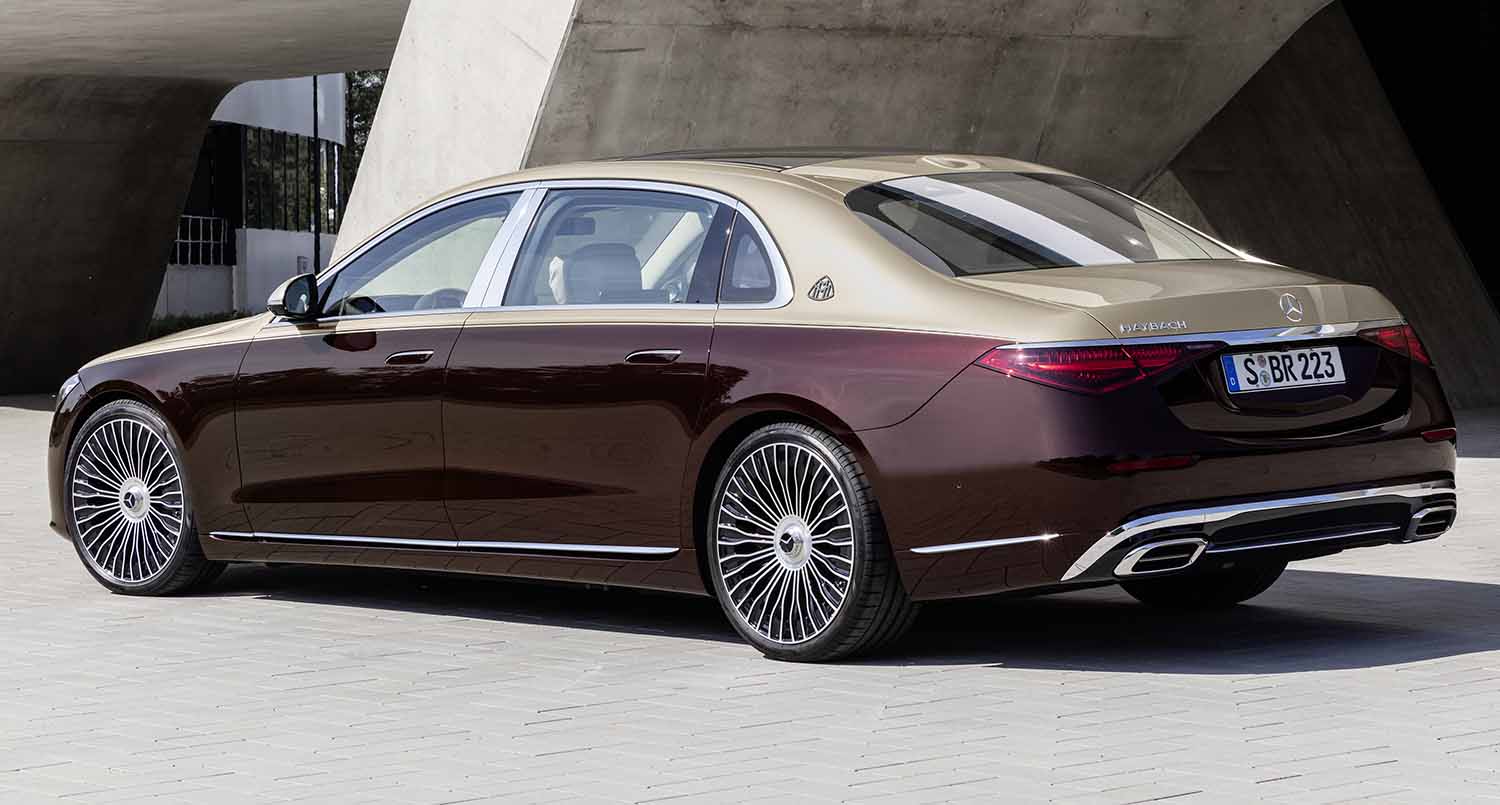
The 18 cm longer wheelbase compared to the long variant of the Mercedes-Benz S-Class entirely benefits the rear.
A clear indication that the owner of the Mercedes-Maybach S-Class will typically be found seated in the rear are the Executive seats on the left and right plus the Chauffeur package as standard equipment. The occupant is able to adjust the seat surface and backrest of the Executive seat independently. Using the footrest on the front seat and the electrically extending legrest creates a continuous, comfortable reclining surface for a pleasant sleeping position. The adjustment travel of the legrest has been extended by approx. 50 mm compared to the preceding series. The massage function of the calfrest as part of the Seating Comfort package Rear is another new feature. The neck/shoulder heating in the rear is another comfort feature.
The infotainment system MBUX (Mercedes-Benz User Experience) is even more personal and intuitive to use.
The second generation of MBUX (Mercedes-Benz User Experience) introduced in 2018 has its debut in the new S-Class. The unique feature of MBUX is its networking with a wide range of vehicle systems and sensor data. Brilliant displays on up to five large screens, in part with OLED technology, make the control of vehicle and comfort functions even easier. The possibilities for personalisation and intuitive operation have become far more extensive. On request, the Mercedes-Maybach S-Class can also be equipped with MBUX Interior Assist in the rear.
MBUX Interior Assist recognises numerous occupant intentions. It recognises eye-direction, hand gestures and the body language of the occupants, so as to assist with automatic vehicle functions as the situation requires. The Mercedes-Maybach S-Class is also able to recognise movements and gestures by the rear occupants with the help of 3D laser cameras in the roof liner. For example, the belt extender for the outer rear seats automatically offers up the seat belt when MBUX Interior Assist recognises the occupant’s intention to reach for the belt by hand movements. The exit warning function has also been extended, and is able to register that a rear passenger intends to leave the vehicle.
Refined engine design for efficient power delivery
The engines of the Mercedes-Maybach S-Class come from the Mercedes-Benz portfolio and are in part electrically assisted. Electrification is by an integrated second-generation starter-generator (ISG). This provides a boost of up to 15 kW, facilitates efficient “gliding” when driving at constant speed, makes the start/stop experience even more comfortable and makes the drive system more efficient overall. All-wheel drive is always standard equipment.
The 9G-TRONIC transmission was developed further and adapted for the ISG. The electric motor, the power electronics and the transmission cooler have now moved into or onto the transmission. In conjunction with ISG it was possible to eliminate the entire two-piece belt drive, as an electric refrigerant compressor is used. This means that even when the engine is not running (start/stop and gliding phases), the interior can be efficiently and comfortably climatised.
An exhaust system with a petrol particulate filter configured for the engine variant is used to clean the exhaust gases. Pressure and temperature sensors, as well as the latest oxygen sensors, ensure efficient exhaust treatment throughout the characteristic map.
Suspension: comfortable setup with surprising agility
The AIRMATIC air suspension with continuously adjustable damping ADS+ is standard equipment. Using DYNAMIC SELECT, the driver is able to individually modify the characteristics of the powertrain, ESP®, the suspension and the steering. The selection is made using a control at the lower end of the central display. DYNAMIC SELECT has a dedicated MAYBACH driving mode which focuses entirely on ride comfort.
Optional rear-axle steering improves manoeuvrability in urban areas. This reduces the turning circle by up to two metres. Customers have a choice between two variants: 4.5° and 10° rear-axle steering. Instead of 13.4 metres, the turning circle is then 12.4 or 11.4 metres.
The optional, fully active E-ACTIVE BODY CONTROL suspension on a 48 V basis uses a stereo camera to scan the road ahead, and smooths out undulations. It also gives additional protection in the event of a lateral collision, as it raises the vehicle level. It can reduce the loads acting on the occupants because it directs the impact forces towards particularly resistant structures in the lower area of the vehicle
Acoustic comfort: extraordinarily quiet and low in vibrations
The new luxury saloon further enhances the very good NVH (noise, vibrations, harshness) performance of the new S-Class generation. The extended NVH measures mainly benefit the rear section. Additional absorbent foam is installed in the area of the rear wheel arches, for example. The additional, fixed quarterlights in the C-pillars have thicker laminated glass, as they are in close proximity to the heads of rear passengers. Noise-optimised tyres with foam absorbers are available on request.
Active road noise compensation is used by the company for the first time. The system reduces unwanted low-frequency noises using counter-phased sound waves. The bass speakers of the Burmester® high-end 4D surround sound system are used for sound reproduction.
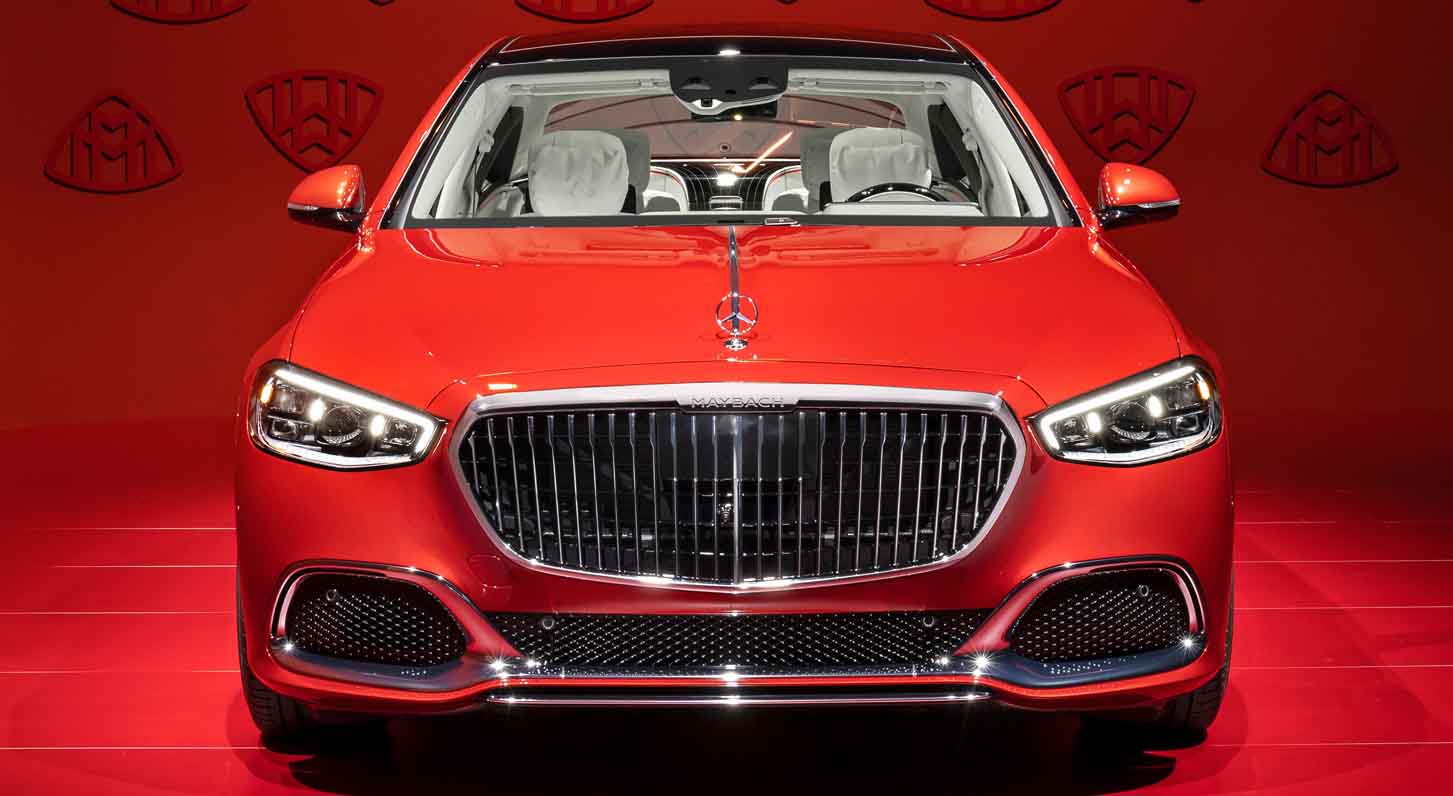
Safety: even more protection before and during accidents
Especially in the Mercedes-Maybach S-Class, particular attention has always been paid to safety in the rear section. During severe frontal collisions, the innovative rear airbag included as standard can considerably reduce the loads acting on the heads and necks of seat belt wearing occupants on the outer rear seats. In the Mercedes-Maybach S-Class, passengers in the rear of a saloon car have the benefit of an automatic belt extender for the first time. It is an indirect invitation to fasten the belt, and also makes the process more convenient. The belt extender is integrated into the adjustable backrest of the Executive seat, and therefore always in the right position for the passenger.
In day-to-day driving, new and extended assistance systems relieve driver stress as the situation requires when adapting the vehicle speed, controlling distance, steering and lane-changing. This enables the driver to stay alert for longer, and reach the destination more safely and comfortably. When danger threatens, driving assistance systems can respond according to the situation and mitigate the severity of possible collisions, or even avoid them.
With the DRIVE PILOT, conditionally automated driving at Mercedes-Benz is expected to enter series production from the second half of 2021. On suitable motorway sections and where traffic density is high, the DRIVE PILOT can offer to take over the driving, initially up to the legally permitted speed of 60 km/h.
The brand: redefining the luxury of the future for 100 years
Mercedes-Maybach is a byword for luxury that constantly reinvents itself. On the basis of a historically evolved understanding of luxury and superlative quality, Mercedes-Maybach has always redefined the luxury of the future. More than ever before, Mercedes-Maybach now stands for “sophisticated luxury”. The brand combines the top-class technology and perfection of Mercedes-Benz with the exclusivity and elegant luxury of MAYBACH.
The new Mercedes-Maybach S-Class follows a unique tradition of exclusive prestige models by the Mercedes-Benz and Maybach brands. Maybach Motorenbau GmbH presented its first automobile at the Berlin Automobile Exhibition in 1921: the Maybach Model W3 with coachwork by Auer in Cannstatt.
In 1930, the Mercedes-Benz 770 “Grand Mercedes” (W 07) was presented, and in 1938 this was replaced by the W 150-series model of the same name. In the 1950s the brand made a comeback in the luxury segment with the Mercedes-Benz 300 (W 186 and W 189). The next high-prestige model arrived in 1963, with the Mercedes-Benz 600 (W 100). The luxurious Pullman Limousines of the S-Class 140 series (presented in September 1995) and 220 series (from 2000) continued this tradition into the new millennium.
In 2002 the then DaimlerChrysler AG revitalised one of Germany’s most exclusive automobile brands with the Maybach luxury saloons of the 240 series. And in 2014 the S-Class of today’s Mercedes-Maybach brand celebrated its premiere with the 222 series. This set new standards with the Mercedes-Maybach S 600 Pullman (2015) and the S 600 Pullman Guard (2016).
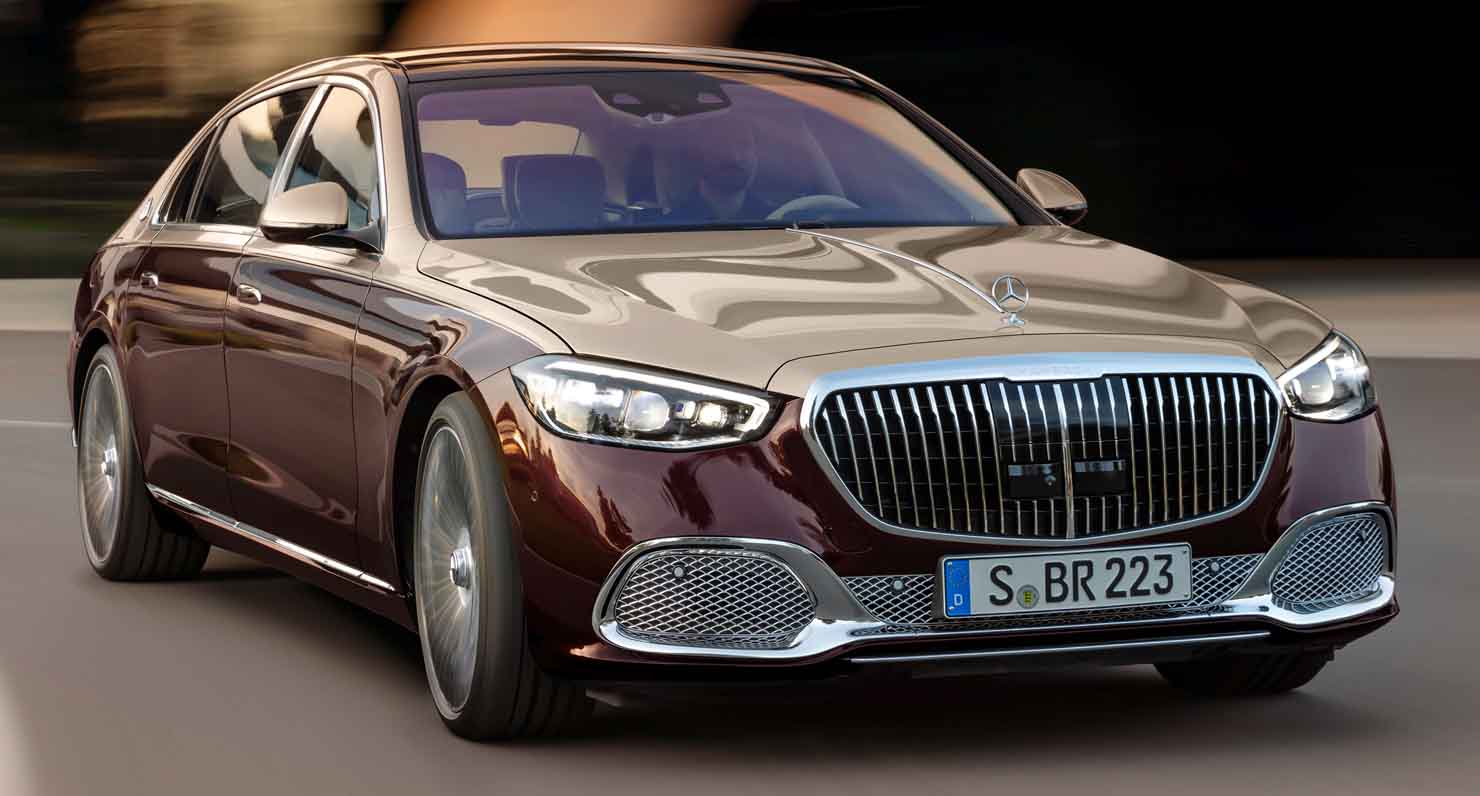
Well-balanced proportions and many exclusive details
The Mercedes-Maybach S-Class expresses the superlative luxury that is the hallmark of the brand. It is a well-conceived combination of sublime beauty and trailblazing technology. It has an 18 centimetre longer wheelbase than the long Mercedes-Benz S-Class. Plus a number of exclusive features.
The Mercedes-Maybach S-Class is a classic three-box saloon with perfect proportions. These are determined by a short front overhang, the longest wheelbase in this model family, a well-balanced rear overhang and large wheels.
Distinguishing features at the front include the distinctive bonnet with a chromed fin and the Mercedes-Maybach radiator grille. This is highly recognisable by its vertical, three-dimensional trim strips. The word mark MAYBACH is elegantly integrated into the chrome surround of the grille. The equally distinctive bumper further emphasises the vehicle’s width with the shape of its air inlets, whose black mesh is also optionally available in chrome.
The Mercedes-Maybach S-Class also differs from its brother models when viewed from the side: The rear doors and flowing, more upright C-pillars underline the model’s superlative status. The fixed quarterlight in the C-pillar is framed by a high-quality surround that seamlessly blends into the side trim. Exclusivity is emphasised by the Maybach brand logo on the C-pillar. In some countries the brand logo is illuminated. The side view is characterised by flush-fitted door handles and 19, 20 or 21-inch wheels specially designed and reserved for this model. The optional ambient illumination projects the brand logo next to the opened front doors in LED technology.
The luxury saloon has the progressively designed, two-section rear lights of the new S-Class generation. Additional lights in the precisely laid-out interior, as well as partly animated functions, also make the Mercedes-Maybach unmistakable at night. The model-specific rear bumper and exhaust tailpipes also lend uniqueness to the rear view.
As well as non-metallic, metallic and designo paint finishes, the range of paintwork for the Mercedes-Maybach additionally includes two-tone finishes with a fine, hand-painted dividing line known as the pin-stripe (see “Under the microscope”). This particularly reinforces the extraordinary hand-built impression.
Digital and analogue luxury in harmony
The interior of the Mercedes-Maybach S-Class is based on the completely new interior design of the new Mercedes-Benz S-Class. The sculptured look of the dashboard, centre console and armrests appears to float above an expansive interior landscape. Small but significant differences raise the luxury to yet another level.
In the Mercedes-Maybach S-Class, digital and analogue luxury are in harmony as the high-tech ambience is combined with high-quality natural materials and fine craftsmanship. Up to five display screens are available. Included as standard is a 12.8-inch OLED central display as a high-tech control centre. With OLED technology, the individual pixels are self-illuminating. Unused pixels remain switched off, giving them a deep black effect. However, active OLED pixels shine more colourfully than their LCD equivalents. High relative contrasts are another advantage – whatever the viewing angle and light conditions. A 12.3-inch 3D driver display with three-dimensional representation of other road users and pronounced depth and shade effects is available on request.
The dial has a decorative, structured facing and the scale in is a classic Antiqua font. Mercedes-Maybach specific start-up animations were designed for the driver and central display. The distinctive look of the driver display in display mode Exclusive underlines the special status of the Mercedes-Maybach: The surrounds of the dial instruments and the needles are in the brand colour rosé gold.
This colour is also used for the active ambience lighting (optional equipment), i.e. the animated LED light band with intelligent comfort and safety functions. With rosé gold white and amethyst glow, the active ambience lighting now has two new colour themes compared to the Mercedes-Benz S-Class. It also has additional functions in the Mercedes-Maybach: the “Welcome” entry display welcomes passengers with a special light show. A carpet of light is spread across the interior, with the emphasis on the rear doors. And “Ignition on” is accompanied by an “Engine Start” animation around the driver display. A special white colour is used for these two functions, not the individual colour last chosen.
There is plenty of classic luxury on board, too: The large areas of trim on the front seats are particularly noticeable. High-quality wood surrounds encase the rear of the front seat backrests, giving the impression of generous lounge seats. If the First-Class Rear is specified, a similarly striking area of trim is positioned between the two rear passengers.
The seats echo the layered design theme of the Mercedes-Benz S-Class seats, and have an even more exclusive design with a progressive diamond pattern and double seam. A special interior colour combination reserved for the Mercedes-Maybach in combination with Exclusive Maybach nappa leather is designo crystal white with silver grey pearl.
The Maybach brand embellishes the stainless-steel pedal cluster, the head restrain cushions, the front seat backrests and – in conjunction with the First-Class Rear – is also found between the rear seat backrests. The brand lettering also distinguishes the steering wheel, and welcomes all occupants in the illuminated stainless-steel entry sills.
A special ambience is ensured by the Exclusive package. Virtually all surfaces are finished in exquisite nappa leather, the roof liner in high-quality DINAMICA microfibre. Additional trim elements perfectly round off this extraordinary quality.
The optional High-End Interior package offers automotive luxury close to perfection. It includes First-Class Rear, rear comfort doors, MBUX high-end rear entertainment, Burmester® high-end 4D surround sound system, active ambience lighting, adaptive rear lighting, folding tables in the rear, Seating Comfort package Rear including seat climatisation, belt extenders in the rear, MBUX augmented reality head-up display, designo backrest trim in wood, Warmth Comfort package, beltbag, USB package Plus and AIR-BALANCE package.
The designo Leather package is another exclusive item of optional equipment. In this case the occupants are surrounded by nappa leather throughout – from exclusive, padded cushions for the Executive seats to the roof liner with its prominent decorative stitching.
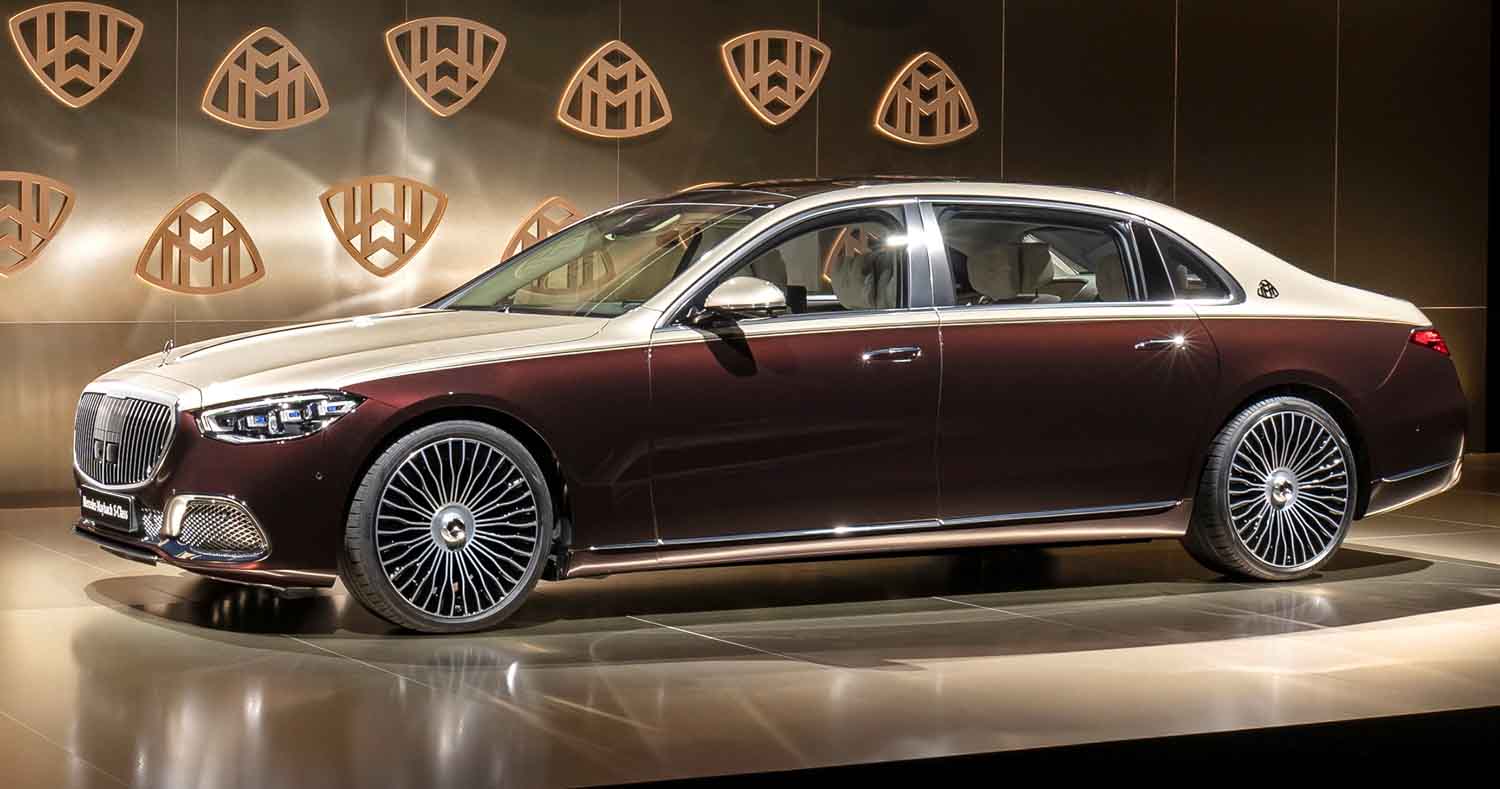
First-class, even in the second row
The Mercedes-Maybach S-Class has an 18-centimetre longer wheelbase than the long Mercedes-Benz S-Class: The increase in space entirely benefits the rear section, which also has even more refined appointments. New features include the massage function of the calf support on the Executive seat, and a heatable additional cushion on the head restraints. The First-Class Rear has been extensively upgraded.
A clear indication that the owner of the Mercedes-Maybach S-Class will typically be found seated in the rear are the Executive seats on the left and right plus the Chauffeur package as standard equipment. Both the driver and rear passenger can electrically move the front passenger seat into a chauffeur position. The adjustment travel and angle of the front passenger seat and rear seats have been improved in many respects: Thanks to a modified head restraint, the front passenger backrest can be inclined forwards by a further 26° and the head restraint tilted forward to give the rear passenger a better view, while the larger ankle rest has ten millimetres more travel and can now also be folded down as a footrest.
The occupant is able to adjust the seat surface and backrest of the Executive seat independently. If the reclining position is chosen in the rear, the front passenger seat automatically moves forward if the seat occupancy recognition detects that nobody is sitting on it. Using the footrest on the front seat and the electrically extending legrest creates a continuous, comfortable reclining surface for a pleasant sleeping position. The adjustment travel of the legrest has been extended by approx. 50 mm compared to the preceding series, and the length and swivel range can be freely adjusted. As a new feature, the legrest has a calf massage function. This can further improve well-being on the rear reclining seats.
The maximum backrest angle of the Executive Seats is 43.5 degrees. The most upright backrest position of 19 degrees allows relaxed working in the rear.
As an option, it is possible to boost comfort for rear passengers even further. The Seating Comfort package Rear includes multicontour seats in the rear, various massage programmes and neck/shoulder heating in the rear. The latter uses an integrated heating mesh to warm this area of the body. The heating function is activated via the seat heating. The power is conveniently and safely supplied via the push buttons of the removable cushion. If single active multicontour seats are ordered, the side bolsters of the backrest and the contour in the lumbar area can be adjusted to suit the individual body shape of the occupant. A massage function is also available. The massage programmes for the rear seats include Classic massage, Workout Back and Wave massage. The massages are also available as part of ENERGIZING comfort. Combination with PRE-SAFE® can provide additional protection: if a critical driving situation is recognised, the PRE-SAFE® system can increase the pressure in the air chambers in the side bolsters of the multicontour seats. This fixes the occupants in a better seating position and reduces whiplash.
If the First-Class Rear (continuous centre console) is specified, the front console is visually continued on the propshaft tunnel. There are two thermo-cupholders under the electrically operated cover in the front area of the centre console. These are able to warm or cool drinks as required. New features include a tray for the MBUX rear tablet, a black-panel surface ahead of the armrest and four quick-charging USB connections. The stowage tray below the armrest holds a wireless charging system for mobile phones and the (optional) receiver for car/business telephony. Similarly to an aircraft seat, the centre console optionally contains two tables in the rear which can be easily folded in or out with one hand. The stowage trays provide space for a notebook or work documents. In keeping with the noble interior, they are lined with high-grade leather in the interior colour.
In critical driving situations the PRE-SAFE® positioning function moves the seats to a more favourable crash position. The Executive seats in the rear feature the seat cushion airbag. These counteract “submarining” under the lap belt when wearing the seat belt. The beltbag, an inflatable belt strap, is optionally available, and rear airbags for both rear occupants are included as standard. More about this in the Safety section.
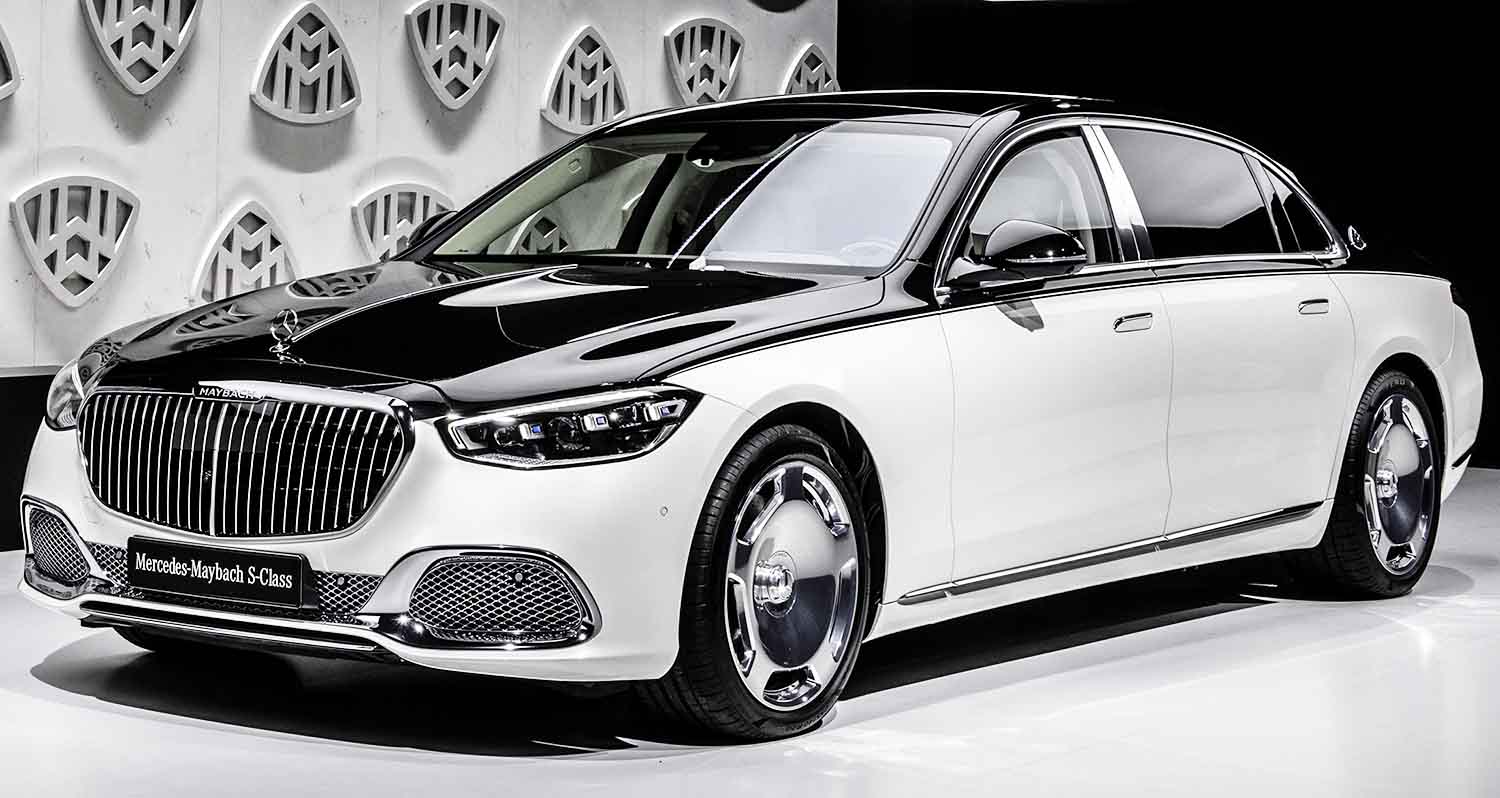
With automatic belt extender, adaptive lighting and relaxing calf massage
Want even more luxury? The passengers in the new Mercedes-Maybach flagship model enjoy all the amenities of the S-Class plus further exclusive comfort features. At the touch of a button or by voice command, the holistic “Fit & Healthy” approach of ENERGIZING Comfort provides a tangible experience of the different comfort systems, and features programmes that bundle them into worlds of experience.
Coupé and Cabriolet customers of Mercedes-Benz have long come to appreciate the automatic seat belt extender. Rear passengers in the Mercedes-Maybach S-Class are now the first to benefit from this convenience in the rear of a saloon. The belt extender is an indirect invitation to fasten the belt, and also makes the process more convenient. It is no longer necessary to move from an adopted, comfortable seating position to fasten the belt. The belt extender is integrated into the adjustable backrest of the Executive seat, and therefore always in the right position for the passenger. Once the passenger is seated on one of the outer rear seats, or in combination with MBUX Interior Assist (see separate section), it extends automatically. As soon as the belt buckle is engaged, or after a certain time, the belt extender returns to its operating position and is deactivated when the vehicle is moving.
Calf-massage in the rear is a special feature of the Mercedes-Maybach. This stimulates the blood circulation and counters fatigue. The calf massage function is available as part of the Seating Comfort package Rear for the Executive seats behind the front passenger seat, which are standard equipment. These also feature a calfrest which is adjustable for length and swivel range.
Adaptive rear lighting is celebrating its premiere in the Mercedes-Maybach. This follows the wishes of the occupants in several respects: as well as the brightness, the size and position of the light spot can be adjusted. There is also a wide adjustment range between precise working light and relaxing lounge light. The light colour is set automatically to suit the typical human daily rhythm. The adaptive rear lighting features light strips in the roof liner and reading lights in the right and left grab handles. The adaptive rear lighting is particularly attractive in combination with MBUX Interior Assist in the rear.
The optional refrigerated compartment in the rear armrest puts cooled drinks and food within easy each of passengers in the rear. The temperature is set using the illuminated control panel. The refrigerated compartment has a capacity of ten litres, and is removable. The ultimate Mercedes-Maybach optional feature is specified with Code B65 – silver-plated champagne goblets. A close-fitting insert in the stowage compartment and two holders in the centre console securely hold the goblets when on the move.
Mercedes-Benz has fundamentally improved ENERGIZING comfort control in the new S-Class. Naturally this also benefits passengers in the Mercedes-Maybach. Innovations such as a massage based on vibrating motors in the seat cushion and resonance transmission by the Burmester® high-end 4D surround sound system are integrated. This makes bass tones feelable.
Direct reproduction of the sound resonance in the seats adds another level to the three-dimensional listening experience – 4D sound inspired by the acoustic massage. The perceived intensity of the sound can be individually adjusted for each seat. The music becomes even more emotional thanks to this feelable component. Two exciters are integrated into the backrest of each seat for this purpose.
The ENERGIZING COACH even suggests an appropriate vitalisation or wellness programme based on vehicle and trip data. It also factors the information about sleep quality and stress level into its intelligent algorithm if the driver has a suitable wearable.
Two ENERGIZING packages are available for the Mercedes-Maybach S-Class, with the following features.
- The ENERGIZING package Front includes ENERGIZING COMFORT, ENERGIZING COACH, AIR-BALANCE package, Warmth Comfort package and Active Multicontour Seat package.
- The ENERGIZING package Rear extends the ENERGIZING comfort control to the rear seats. It includes seat climatisation in the rear and the Seat Comfort package Rear. This package requires specification of the optional MBUX high-end rear entertainment.
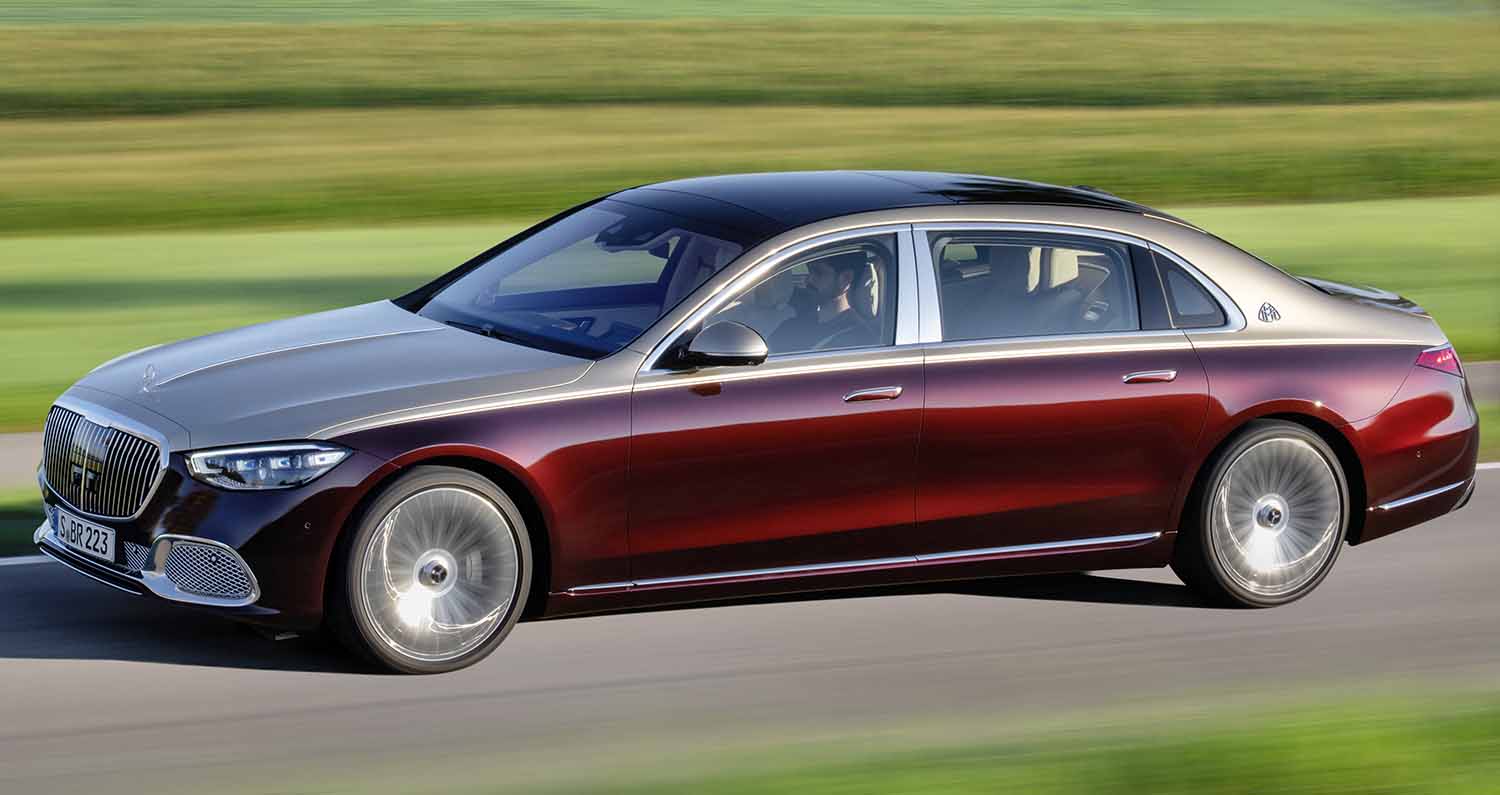
Extraordinarily quiet and low in vibrations
In the rear, the preceding model was the world’s quietest saloon car when it was launched in 2015. The new Mercedes-Maybach offers even more acoustic comfort. The NVH (noise, vibrations, harshness) characteristics were tested in e.g. the technology centre for acoustics and vibrations (TAS) in Sindelfingen and the Test and Technology Centre (PTZ) in Immendingen.
The new luxury saloon further improves the very good NVH performance of the new S-Class generation. Here, too, the rigidity of the bodyshell is the basis for the outstanding noise and vibration comfort. Other S-Class features such as double sealing of the cable grommets passing through the firewall, generous firewall insulation and acoustic foam in certain sections of the bodyshell have also been adopted.
The extended NVH measures in the Mercedes-Maybach S-Class mainly benefit the rear section. Additional absorbent foam is installed in the area of the rear wheel arches, for example, as these have a new cavity not shared by the brother models. The additional, fixed triangle windows in the C-pillars have thicker laminated glass, as they are in close proximity to the heads of rear passengers.
Noise-optimised tyres with foam absorbers are available for the Mercedes-Maybach on request. Foam material on the inside of the treads acts like a sound suppressor, making the interior even quieter. In addition, thermal and noise insulation laminated safety glass which also reflects infrared light is available all-round as optional equipment. The additional membranes between the layers of laminated safety glass also serve to reduce wind noise. They reduce noise reflected from guardrails or oncoming traffic as well.
Active road noise compensation is within the Daimler Group for the first time. The system reduces unwanted low-frequency noises using counter-phased sound waves (see separate section).
Mercedes-Benz engineers test vehicle acoustics in the technology centre for acoustics and vibrations (TAS) in Sindelfingen. This testing saw the first use of “Dascha”, a development dummy which self-generates the noises to be measured (Daimler noise source).
The TAS enables noises inside and outside the vehicle to be measured and analysed in different situations – here are some examples:
- In one test laboratory, contact-free, fully automatic vibration measurements are carried out. The vibrations on surfaces are scanned with the help of lasers, then visualised as by a thermal imaging camera. The laser scanners are mounted on the arm of a robot moving along linear axes. (Simulated) excitation of individual vehicle components is carried out by a shaker. The system can measure both individual components and entire vehicles. To this end a crane is mounted on the laboratory ceiling.
- The external noise roller dynamometers use microphone arrays, some of which have over 800 microphones connected in series. These enable passing noises to be simulated although the vehicle is stationary, whatever the time of year or weather. In addition the noise sources can be analysed. Sound-absorbing cones on the walls ensure the quietest possible room acoustics very similar to a free field.
- High-frequency road impulses can be simulated at all four vehicle wheels on the acoustic and vibration comfort test rig. This takes the form of a flat surface test stand, and comes closer to reality than a roller dynamometer in terms of tyre-to-road contact. Different vertical and horizontal impulses are transferred to the wheels to simulate uneven road surfaces, including slab joints on motorways and rough asphalt.
- The rain noise test station examines the noises generated by rainfall of different intensities on e.g. the roof and windows. Precisely 1648 water nozzles are installed in the high ceiling for this purpose.
By means of simulations and measurements in the TAS, acoustic engineers are already able to achieve a high level of maturity before test vehicles are taken to e.g. the Test and Technology Centre (PTZ) in Immendingen. The asphalt surface of its acoustic test track has precisely the friction coefficient defined by the ISO 362 and ISO 10844 standards. Alongside acoustic testing, this also allows acoustic measurements to be carried out for certification purposes. Bays on the edge of the test track provide spaces for microphones.
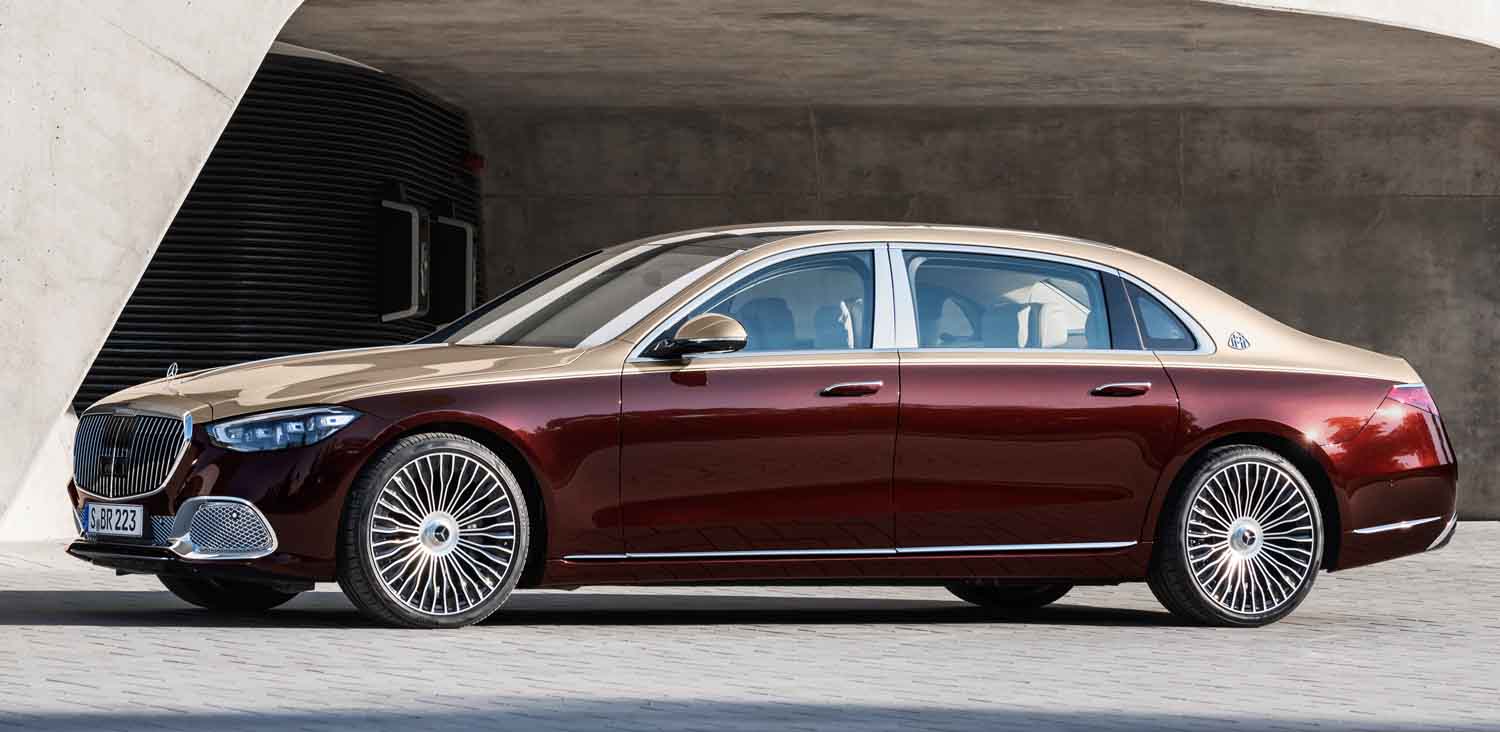
Comfortable setup and surprising manoeuvrability thanks to rear-wheel steering
The AIRMATIC air suspension with level control and continuously adjustable damping ADS+ is standard equipment. Optional rear-axle steering with a steering angle of up to 10° improves manoeuvrability and reduces the turning circle by up to two metres. The optional, fully active E-ACTIVE BODY CONTROL suspension on a 48 V basis uses a stereo camera to scan the road ahead, and smooths out undulations. It also gives additional protection in the event of a lateral collision.
DYNAMIC SELECT has the additionally developed driving mode MAYBACH, which the Mercedes-Benz S-Class does not have. With this setting the power delivery is even more comfortable, making the journey even smoother and more relaxed:
- Gentler accelerator characteristics for Chauffeur mode
- Even more comfortable, low-shift transmission configuration
- Maximum comfort by starting off in 2nd gear
The setup of the AIRMATIC air suspension and E-ACTIVE BODY CONTROL is configured for maximum suspension comfort on all seats.
The vehicle level is kept constant
The standard-fit AIRMATIC air suspension responds particularly sensitively. It combines air suspension bellows with adaptive ADS+ dampers whose characteristics can be fully automatically varied at each individual wheel, in both the compression and rebound stages. This level control is part of AIRMATIC. It keeps the ground clearance constant, irrespective of the vehicle’s load. To reduce aerodynamic drag and therefore fuel consumption, the suspension is automatically lowered at higher speeds.
Even better ride comfort and agility, as well as innovative functions such as raising the vehicle body in a lateral crash, are provided by the E-ACTIVE BODY CONTROL active suspension, which is combined with the standard AIRMATIC air suspension. It is able to control the spring and damper forces at each wheel individually. ROAD SURFACE SCAN monitors the road ahead with a stereo camera, and already adapts the suspension before the wheels cross uneven surfaces. Thanks to this predictive control, the vehicle body “floats” across undulations with practically no vertical movement. With the curve inclination function CURVE, the vehicle body leans into bends rather than tilting outwards. This imposes lower lateral forces on the occupants, further improving perceived comfort.
Both axles are capable of steering, thus reducing the turning circle
Naturally the generous interior of the Mercedes-Maybach S-Class requires corresponding external dimensions. To ensure manoeuvrability and precision even in confined spaces, it is equipped with rear-axle steering (optional equipment). This reduces the turning circle by up to two metres. Customers have a choice between two variants: 4.5° and 10° rear-axle steering. Instead of 13.4 metres, the turning circle is then 12.4 or 11.4 metres.
In models with the optional rear-axle steering, a front steering system with an approx. 15 percent more direct steering ratio is used with the well-proven four-link front suspension. Acting together with the rear-axle steering, this considerably reduces the steering action required and improves ride comfort even further. Agility and manoeuvrability are objectively improved, and at the same time the serene stability and precision of a long-wheelbase luxury saloon are further enhanced at higher speeds.
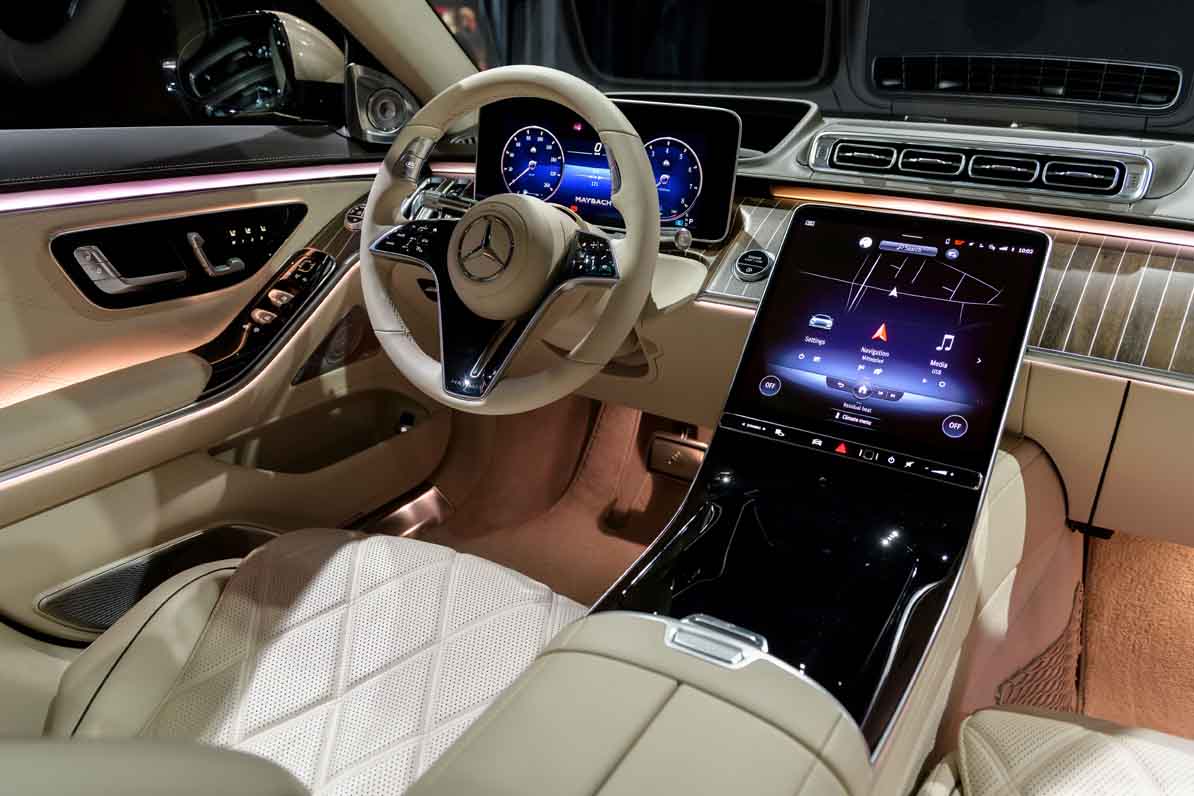
A new dimension in personalisation and interaction
The second generation of MBUX (Mercedes-Benz User Experience) introduced in 2018 has its debut in the new S-Class. The unique feature of MBUX is its networking with a wide range of vehicle systems and sensor data. Brilliant displays on up to five large screens, in part with OLED technology, make the control of vehicle and comfort functions even easier. The possibilities for personalisation and intuitive operation have become far more extensive. On request, the Mercedes-Maybach S-Class can also be equipped with MBUX Interior Assist in the rear.
MBUX Interior Assist recognises numerous occupant intentions. It recognises eye-direction, hand gestures and the body language of the occupants, so as to assist with automatic vehicle functions as the situation requires. The Mercedes-Maybach S-Class is also able to recognise movements and gestures by the rear occupants with the help of 3D laser cameras in the roof liner. For example, the belt extender for the outer rear seats automatically offers up the seat belt when MBUX Interior Assist recognises the occupant’s intention to reach for the belt by hand movements. The exit warning function has also been extended, and is able to register that a rear passenger intends to leave the vehicle. Further functions of MBUX Interior Assist in the rear are described in the next section.
Up to five screens with intuitive operation
The visual highlight in the interior is the large central display in portrait format. It is ergonomically well positioned, as the screen is within easy touch and vision between the driver and front passenger. The portrait format also allows longer lists to be displayed. The central display features OLED technology as standard. OLED stands for Organic Light Emitting Diode. Compared to LCD screens, the advantages of this technology are a better black level, even stronger contrasts and a lower energy consumption.
On request, the driver display is also available with a unique innovation: at the touch of a button, it is possible to switch to a 3D mode for a spatial view. A real three-dimensional effect is achieved with the help of eye-tracking, without having to wear 3D glasses. This optional version of the driver display has two integrated cameras. This stereo camera precisely determines the eye position of the user. Mercedes-Benz has developed appropriate distance adaptation methods for this, and the system has extremely low latency, i.e. there is almost no delay. The driver can therefore move freely. The image in the driver display is continuously adjusted. Cameras and face recognition are also used for a wide range of assistance and comfort functions. These include the new biometric authentication, drowsiness detection by ATTENTION ASSIST, settings for the exterior mirrors and (expectedly from the second half of 2021, initially in Germany) also monitoring of head and eyelid movements during automated driving.
Extensive range of infotainment functions for passengers in the rear
Passengers in the rear have the same extensive Infotainment and comfort features as the driver and front passenger, and can also watch films or surf the internet. They have the use of up to three touchscreens, and a variety of intuitive control options such as “Hey Mercedes” voice control.
Screen content can be quickly and easily shared with other passengers. Selection and amendment of navigation destinations is possible from the rear seats. MBUX high-end rear entertainment has two 11.6-inch displays with touch controls on the rear of the front seat backrests. The MBUX Rear Tablet is standard equipment in the Mercedes-Maybach. As a fully-fledged tablet, this can also be used outside the vehicle and (Android) apps can be installed. In the S-Class, the MBUX rear tablet is attached to a docking station located in the folding centre armrest or the business console, depending on the equipment level. This convenient remote control enables all the functions of the rear entertainment to be controlled from any seating position.
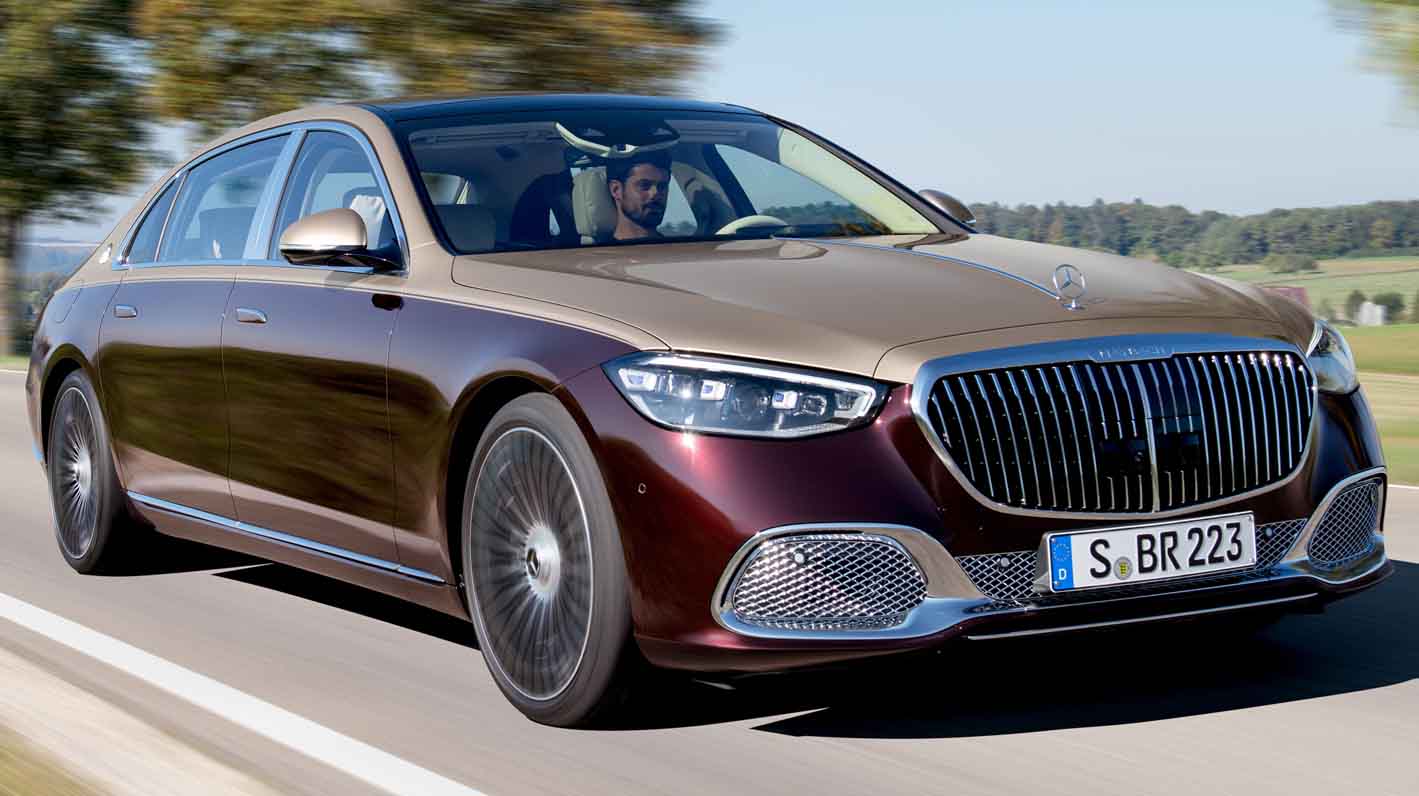
Personalisation is even more easy and convenient
A personal profile can be created directly in the S-Class and synchronised with the existing profile data of the Mercedes me account. By scanning a QR code with the Mercedes App, the vehicle is automatically connected to the Mercedes me account.
Personal preferences such as a favourite radio station and preselected settings can be transferred to any seat via the personal Mercedes me profile. Up to seven different profiles with around 600 parameters are possible in the vehicle. The ambience lighting can be individually set by remote configuration, e.g. from home. As the profiles are now stored in the Cloud as part of Mercedes me, they can also be used in other Mercedes-Benz vehicles with the new MBUX generation.
Alongside the classic entry of a PIN, a new authentication method ensures a high level of security. Fingerprint, face and voice recognition are combined. This allows access to individual settings or verification of digital payment processes from the vehicle.
More protection before and during accidents
Especially in the Mercedes-Maybach S-Class, particular attention has always been paid to safety in the rear section. The innovative rear airbag demonstrates this: during severe frontal collisions, this standard feature can considerably reduce the loads acting on the heads and necks of seat belt wearing occupants on the outer rear seats. In day-to-day driving, new and extended assistance systems relieve driver stress as the situation requires when adapting the vehicle speed, controlling distance, steering and lane-changing. This enables the driver to stay alert for longer, and reach the destination more safely and comfortably. When danger threatens, driving assistance systems can respond according to the situation and mitigate the severity of possible collisions, or even avoid them.
The Executive seats in the rear feature:
- Seat cushion airbags. These counteract “submarining” under the fastened seat belt.
- Beltbags (optional equipment). The inflatable belt strap spreads the incoming forces over a wider area.
- Belt extenders (optional equipment) make seat belt fastening more convenient.
- After fastening the belt, the belt comfort adjustment sets the restraining force of the safety belt to a particularly pleasant level. Belt tensioners and force limiters are standard equipment to help reduce the loads on the occupants.
- Frontal airbags. The rear airbags for both rear occupants are a new feature.
- Sidebags are also available in the rear to provide protection in the event of a severe side crash.
- Windowbags. Located in the area of the roof frame, these cover the large head impact area of both front and rear occupants.
In critical driving situations the PRE-SAFE® positioning function also moves the rear seats to a more favourable crash position. The active multicontour seats in the Seating Comfort package Rear provide additional protection in combination with PRE-SAFE®: if a critical driving situation is recognised, the PRE-SAFE® system can increase the pressure in the air chambers in the side bolsters of the multicontour seats. This fixes the occupants in a better seating position and reduces whiplash.
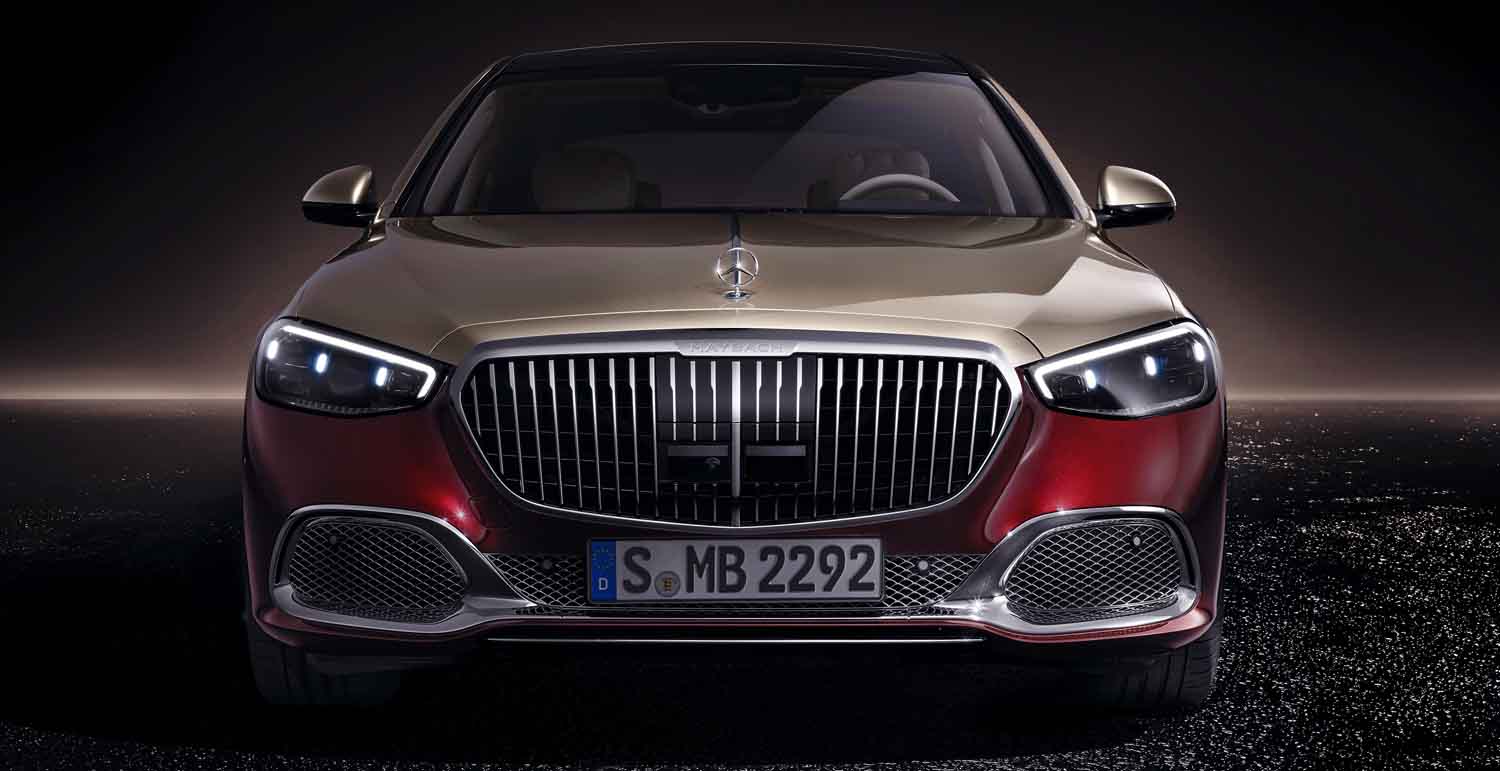
All-round safety on the front seats as well
The driver and front passenger each have a three-point seat belt with pyrotechnical inertia-reel tensioning and belt force limitation and, as part of the standard PRE-SAFE® system, electrically reversible reel tensioning including deselectable automatic belt adjustment. The belt is in particularly gentle contact with the occupant’s body. In the event of a severe frontal impact, PRE-SAFE® Impulse can reduce the forces acting on the driver and front passenger. The system tensions the front belts at all three attachment points, restraining the occupants at an early stage.
The driver and front passenger also have front airbags, and the driver a kneebag. If the central electronic control unit detects a side crash, the windowbag and sidebag are deployed on the side of the vehicle where the impact occurs. To ascertain the lateral acceleration, the central crash sensor has support from exterior satellite sensors located at the base of the B-pillars. Pressure sensors in all four doors also help to estimate the severity of the impact.
In addition, the preventive, semi-reversible side restraint system PRE-SAFE® Impulse Side is installed as standard to protect the front occupants. Together with the familiar PRE-SAFE® protection concepts for frontal and rear collisions, PRE-SAFE® Impulse Side forms a kind of virtual crumple zone that extends all around the vehicle.
As only a limited crumple zone is available in the case of a side impact, and even before the crash, PRE-SAFE® Impulse Side can move the affected driver or front passenger away from the acute danger zone as soon as the system detects that a side collision is immediately imminent. For this purpose, air chambers in the side bolsters of the front seat backrest are inflated in fractions of a second. In addition, when a side impact with another vehicle threatens, the vehicle body can be raised by the E-ACTIVE BODY CONTROL suspension (optional) within a few tenths of a second. This directs the impact forces towards particularly resistant structures in the lower area of the vehicle During a severe side impact, the new centre airbag (available depending on country) positions itself between the driver and front passenger seat, reducing the risk of head contact. It is integrated into the driver’s backrest in the middle of the vehicle. The centre airbag can be deployed as the situation demands when a severe side impact is detected.
Frontal airbags for both rear occupants for the first time
The rear airbag is an innovation by Mercedes-Benz. During severe frontal collisions, it can considerably reduce the loads acting on the heads and necks of occupants on the rear seats. The rear airbag uses an innovative concept to inflate and position the air cushion. The special tubular structure is rapidly inflated by compressed gas from a cold gas generator. The space between is filled with ambient air. The tubular structure itself has a content of approx. 16 litres. The effective volume of the space in between is up to 70 litres.
An airbag in the seat belt: the beltbag
The beltbag is an inflatable seat-belt strap that reduces the load on the ribcage in a front impact, and is thus able to reduce the risk of injury to passengers in the rear. Should the crash sensors detect a severe frontal impact, the airbag control unit triggers deployment and inflation of the beltbag. A gas generator then inflates the multi-layered belt strap with Velcro seams to nearly three times its normal width. The resulting larger surface area is able to better distribute the force acting on the seat occupant. The beltbag is used in exactly the same way as a conventional seat belt. However, this version of the belt strap differs from the standard belt and is very comfortable to wear thanks to its particularly soft edges.
An airbag for the seat: the seat cushion airbag
The airbag is located under the seat cushion upholstery, but on top of the plastic seat shell which is moved by the seat mechanisms. This means that the airbag is always in the right position relative to the occupant. Without additional measures, with the occupant in a reclined position on a flat seat cushion, there would otherwise be a danger of the pelvic area sliding beneath the belt strap (submarining) in an accident. This can be prevented by the cushionbag, as it raises the front section of the seat cushion upholstery.
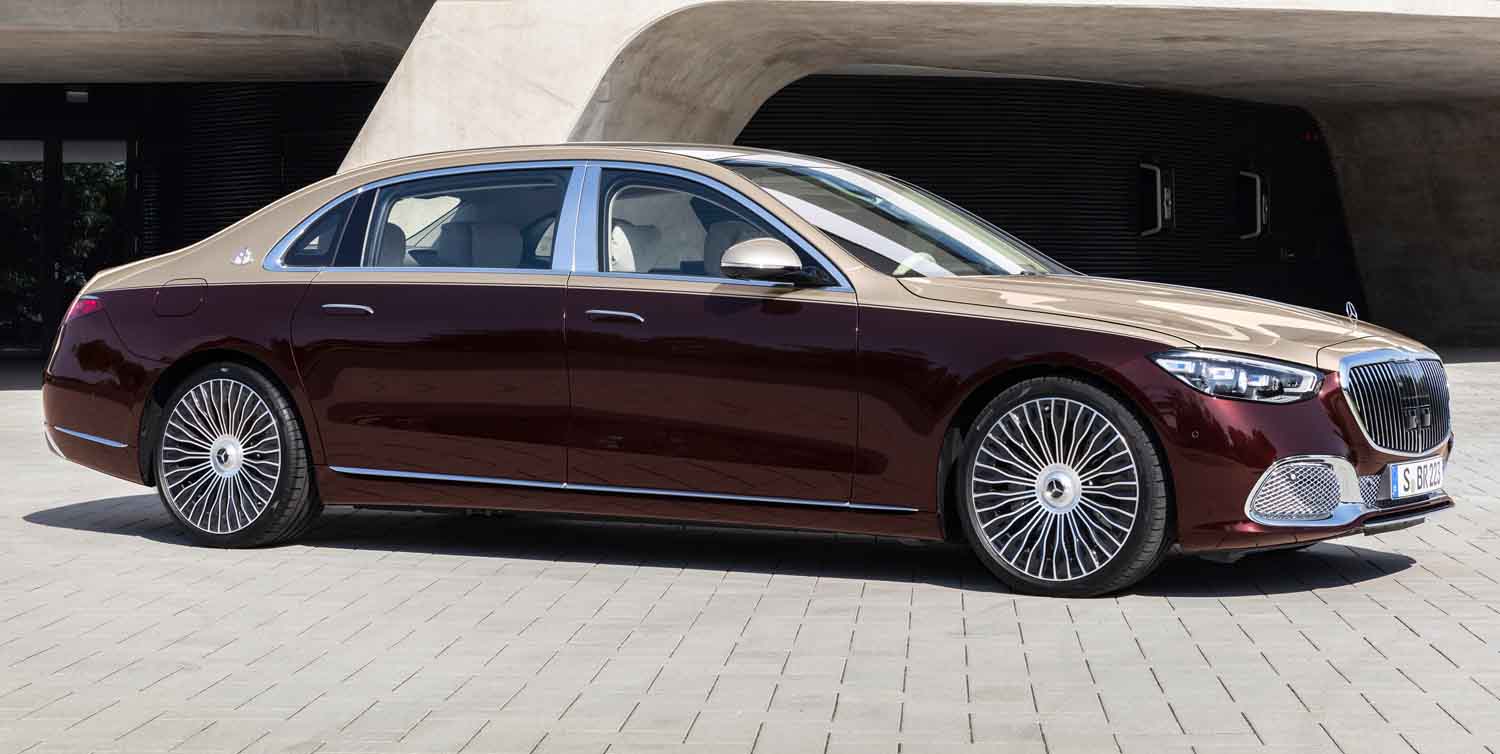
Driving assistance systems
The basic functions of the systems in the Driving Assistance package included as standard can be found here. The main new features of the systems in the Mercedes-Maybach S-Class:
Active Distance Assist DISTRONIC
On all types of roads – motorways, country roads or in town – this intelligent system can automatically maintain a preset distance from vehicles ahead. New features:
- predictive speed regulation ahead of speed limits
- reaction to stationary vehicles on the road at driving speeds up to 100 km/h (previously: 60 km/h)
- selection of DISTRONIC dynamics in MBUX, independently of DYNAMIC SELECT
Active Steering Assist
This helps the driver to follow the driving lane at speeds up to 210 km/h. New features:
- additional lane recognition by a 360° camera
- significantly improved availability and performance on bends on country roads
- improved lane centring on motorways
- situation-specific off-centred driving (e.g. forming an emergency lane, but also following the road edge on country roads with no centre marking)
Traffic Sign Assist
In addition to conventionally signposted speed limits, this recognises overhead gantries and signs at roadworks. Warnings given when failing to stop at a stop sign and a red traffic-light are a new feature.
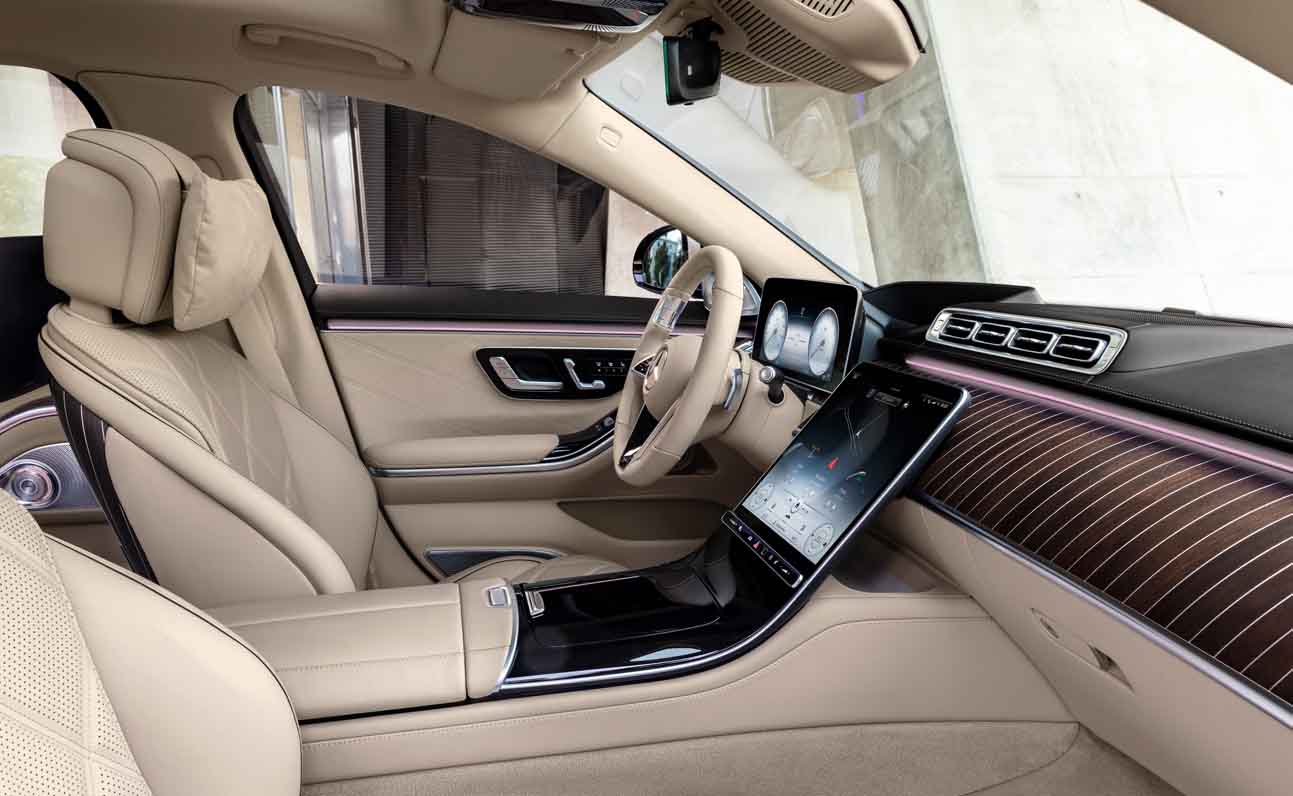
Active Lane Keeping Assist
In a speed range of 60 to 250 km/h, Active Lane Keeping Assist uses a camera to detect when road markings or road edges are crossed, helping the driver to avoid leaving the driving lane unintentionally. The system also intervenes if there is a danger of collision with recognised road users in the adjacent lane, e.g. with overtaking or oncoming vehicles. New features:
- reaction to road edges, e.g. a patch of turf
- particularly intuitive steering intervention
- adjustment of sensitivity via a menu (early, medium, late)
- the danger warning is reinforced by the active ambient lighting and the augmented reality head-up display
Active Lane Changing Assist
Active Lane Changing Assist cooperatively assists the driver of the new S-Class when moving to an adjacent lane. A lane-change to the right or left is only assisted if the sensors detect that the adjacent lane is separated from the present lane by an interrupted lane marking, and no other vehicles are recognised in the relevant danger zone.
Active Emergency Stop Assist
Active Emergency Stop Assist brakes the vehicle to a standstill in its own lane if it recognises that the driver is no longer responding to the traffic situation for a longer period. This still works if Active Distance Assist DISTRONIC with Steering Assist is not switched on. Other new features:
- belt tensioning and braking impulse as a final signal of impending braking action
- optional single lane change (at 80 km/h, no obstacles in adjacent lane)
ATTENTION ASSIST
This system included as standard is able to recognise typical signs of drowsiness and driver inattention, and displays a warning message prompting him/her to take a break. The additional microsleep warning is a new feature. This is based on analysis of the driver’s eyelid movements by a camera in the driver display (only in conjunction with certain optional equipment). The microsleep warning function is already active from a speed of 20 km/h.
Active Brake Assist with cross-traffic function
Active Brake Assist uses the onboard sensors to register whether there is a risk of collision with vehicles travelling ahead, crossing or oncoming. The system can give the driver a visual and acoustic warning if a collision appears imminent. If the driver’s braking response is too weak, the system can also assist by increasing the brake pressure as the situation demands, and also initiate autonomous emergency braking if the driver fails to respond. New functions include the turn-off function (e.g. crossing pedestrians when turning off), extension of the cross-traffic function to long-distance routes (up to 120 km/h instead of 72 km/h) and warning/braking for oncoming traffic.
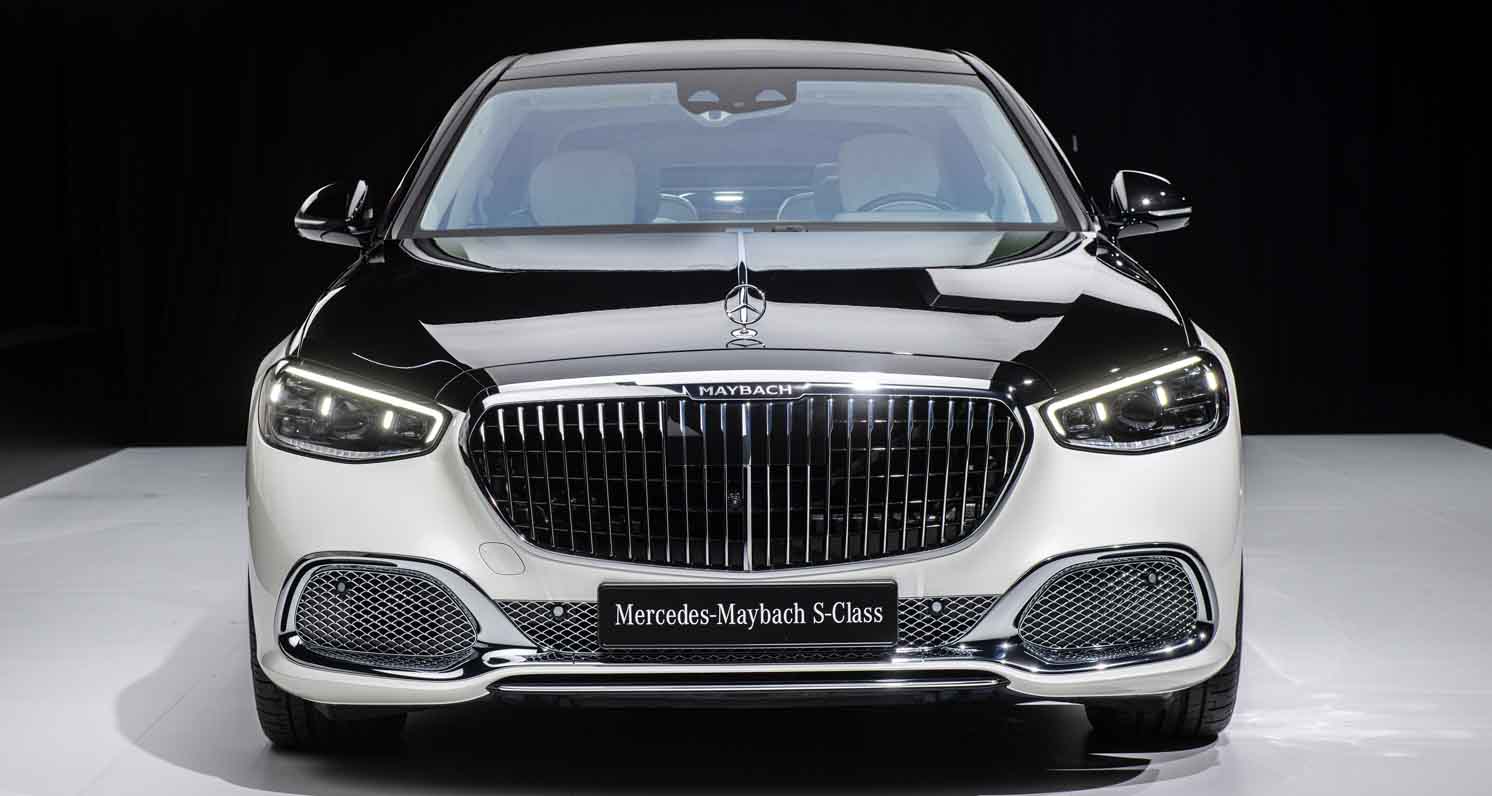
Active Blind Spot Assist and exit warning function
Active Blind Spot Assist can give a visual warning – and if the indicators are operated also an audible warning – of potential lateral collisions in a speed range from around 10 to 200 km/h. If the driver ignores the warnings and still initiates a lane-change, the system can take corrective action by one-sided braking intervention at the last moment if the speed exceeds 30 km/h. When the vehicle is stationary, the exit warning function can warn against exiting because a vehicle (also bicycles) is passing within the critical area. This function is available when the vehicle is stationary and for up to 3 minutes after the ignition has been switched off. As a new function, the danger warning is augmented by the active ambience lighting (also the exit warning function). Thanks to the cameras of MBUX Interior Assist, a danger warning can be given even if the driver or front passenger merely move a hand towards the door handle.
Evasive Steering Assist
Evasive Steering Assist can assist the driver when seeking to avoid another road user detected by the system in a critical situation. In the new S-Class, the system not only recognises stationary and crossing pedestrians, but now also takes account of pedestrians and vehicles travelling longitudinally, as well as cyclists. The speed range has been increased to 108 km/h (instead of 72 km/h), and assistance is also given on long-distance routes.
Conditionally automated driving becomes a reality
The home office will soon be mobile – also for the person at the wheel. At least if they drive a vehicle bearing the three-pointed star: for Mercedes-Benz wants to bring about the technical realisation and safe operation of an S-Class driving in conditionally automated mode and to meet the exacting legal requirements for what is known as a Level 3 system. It is expected that from the second half of 2021 the Maybach will be able to drive in conditionally automated mode with the new DRIVE PILOT, in situations where traffic density is high or in tailbacks on suitable motorway sections in Germany. By taking pressure off the driver, this allows them to undertake secondary activities such as browsing on the internet or dealing with emails in the In-Car Office, and so win extra time. Mercedes-Benz goes a step further when it comes to parking: with the appropriate pre-installation for the INTELLIGENT PARKING PILOT, the Maybach is ready for driverless fully automated parking (automated valet parking; Level 4).
With the DRIVE PILOT, conditionally automated driving at Mercedes-Benz is expected to enter series production from the second half of 2021. On suitable motorway sections and where traffic density is high, the DRIVE PILOT can offer to take over the driving, initially up to the legally permitted speed of 60 km/h. The controls needed for this are located in the steering wheel rim, on the left and right above the thumb recesses. When the driver activates the DRIVE PILOT, the system controls the speed and distance, and serenely guides the vehicle within its lane. The route profile, events occurring on the route and traffic signs are all assessed and taken into consideration accordingly. The DRIVE PILOT can also recognise unexpected traffic situations, and deal with them autonomously by evasive action within its lane or braking action.
With the LiDAR sensor and redundant systems
The DRIVE PILOT builds on the surround sensors of the Driving Assistance Package and comprises additional sensors that Mercedes-Benz considers indispensable for safe conditionally automated driving. These include LiDAR, an additional camera in the rear windscreen and microphones, which are particularly useful for recognising the flashing blue lights and special signals of emergency vehicles. As well as the sensor data, the DRIVE PILOT receives information about the road geometry, route profile, traffic signs and unusual traffic events (e.g. accidents or roadworks) from a digital HD map. This is made available by a back-end connection. The vehicle’s location is determined using a highly precise positioning system that goes well beyond the usual GPS systems. The Mercedes-Maybach S-Class with the optional DRIVE PILOT also has redundant steering and braking systems and a redundant onboard electrical system, so that it remains manoeuvrable even if one of these systems fails and a safe handover to the driver can be ensured.
A powerful central control unit provides the necessary sophisticated software functions for conditionally automated driving. Artificial intelligence is used for image processing, for example. As part of the state-of-the-art safety architecture, all algorithms are calculated twice.
While using the DRIVE PILOT, the driver can turn away from what is happening on the road and engage in certain secondary activities, e.g. communicating with colleagues via In-Car Office, browsing on the internet or enjoying a relaxing seat massage. This is because in DRIVE PILOT mode, functions can be enabled that are otherwise blocked when driving.
Conditionally automated driving on suitable motorway sections where traffic density is high
When the vehicle approaches the end of a route section that is suitable for the DRIVE PILOT, for example a tunnel, or if other conditions change, perhaps the weather or the traffic situation (for example when a tailback begins to flow freely), the driver is prompted in good time to retake control. As a general principle, the driver must always be ready to retake control and immediately resume driving as necessary when the system prompts him/her to do so, or if it is obvious that the conditions for the intended use of the DRIVE PILOT no longer apply. Sleeping, looking to the rear for longer periods or even leaving the driver’s seat are not permitted. To ensure that the driver is able to take control, the cameras of the driver display monitor movements of the head and eyelids.
If the driver fails to take back control even after increasingly urgent prompting, e.g. owing to a severe health problem, the DRIVE PILOT brakes the vehicle to a standstill in a controlled manner and with suitable deceleration. At the same time the hazard warning system and, once the vehicle has come to a standstill, the Mercedes-Benz emergency call system are activated and the doors and windows are unlocked, to make access to the interior easier for any first responders. Naturally the driver can also deactivate the DRIVE PILOT at any time without any prompting by the system. This is done via the steering wheel buttons, or by manually intervening in the vehicle’s control functions.
The system is constantly improving
The top speed of a system with conditional automation in Germany is restricted by law to 60 km/h. However, the DRIVE PILOT is prepared for the possibility of permitting higher speeds as well via over-the-air updates in the future, where this is technically feasible and the legislative framework allows it. The general introduction of the DRIVE PILOT in other European countries, in the USA and China will follow gradually as the legal situation in each country provides for a surrendering of the driving task.
